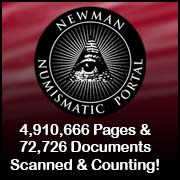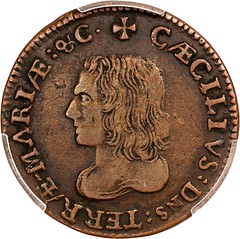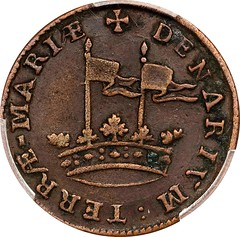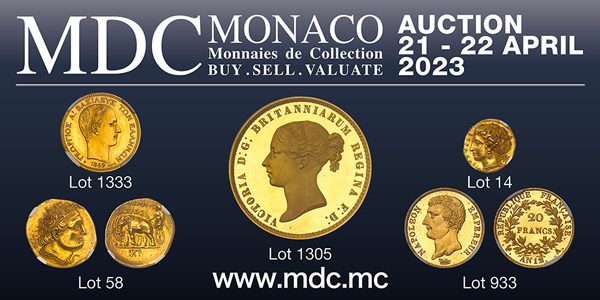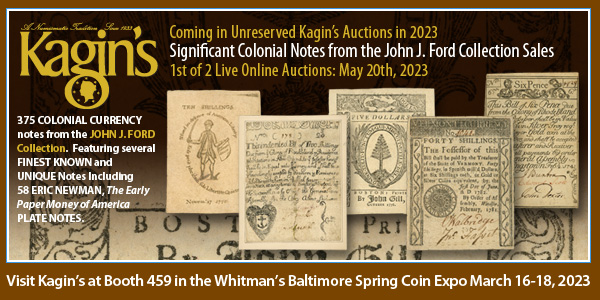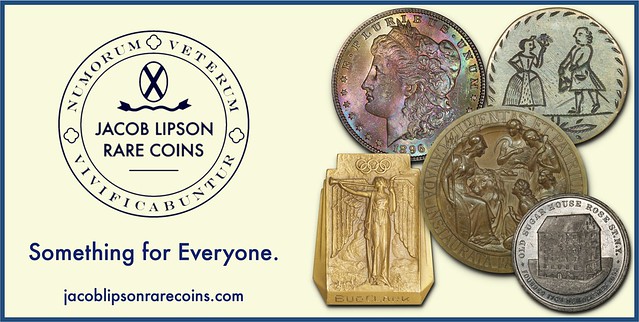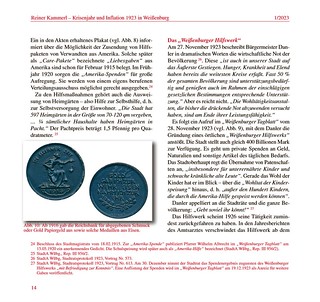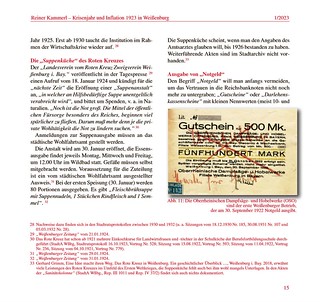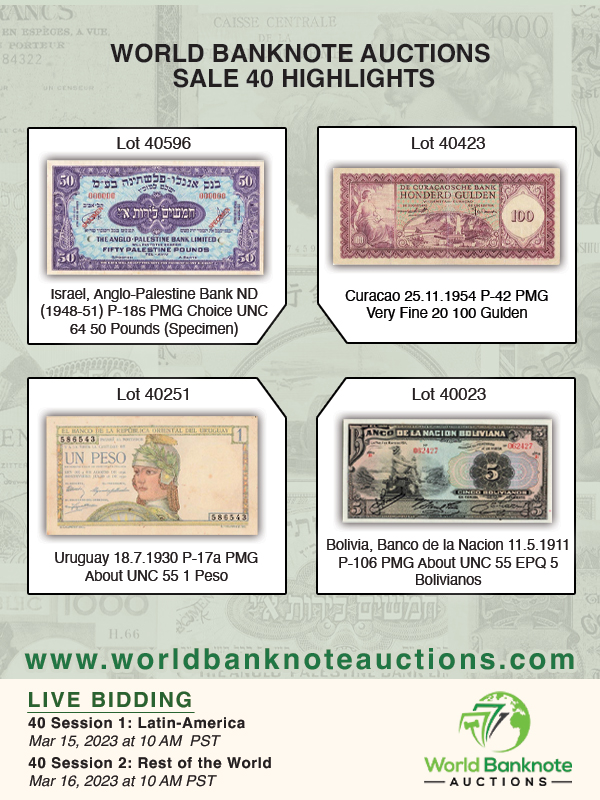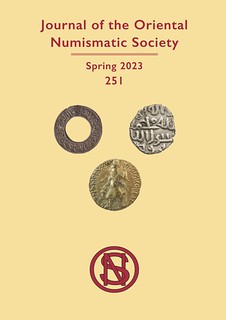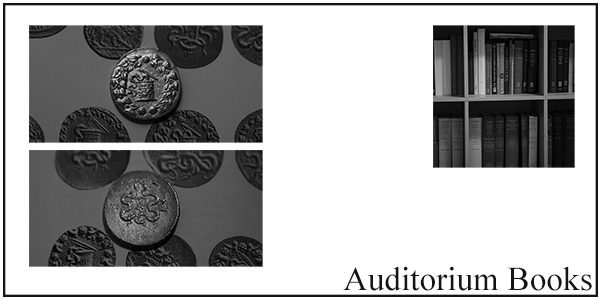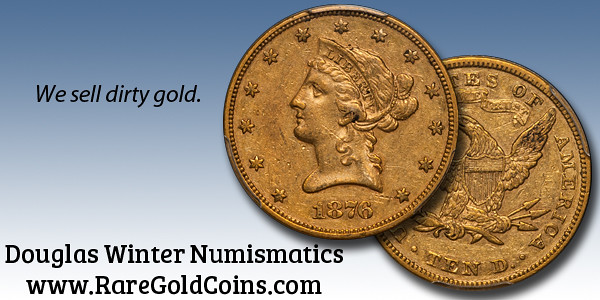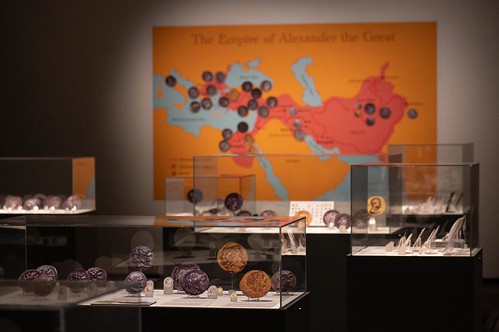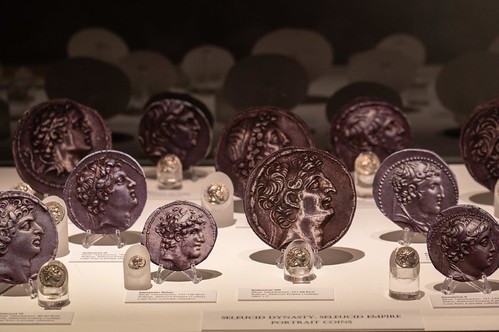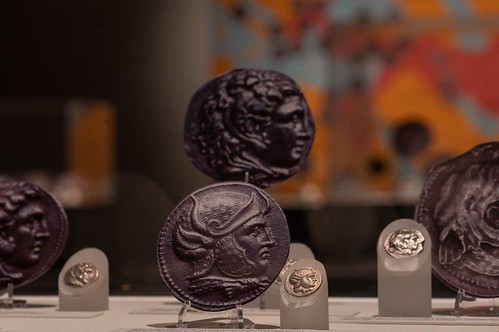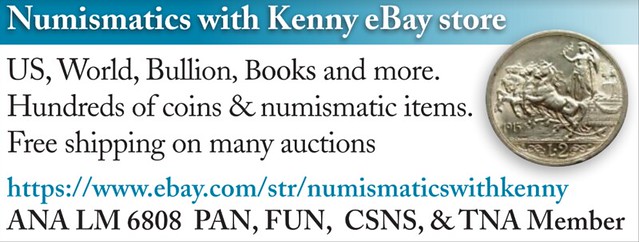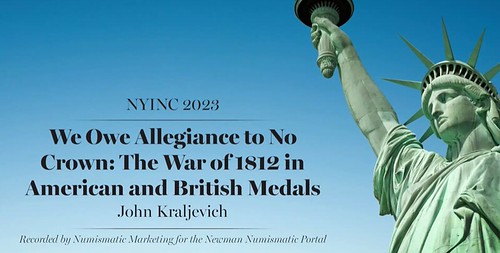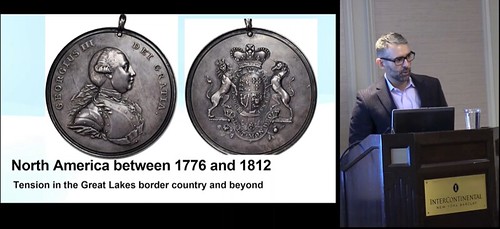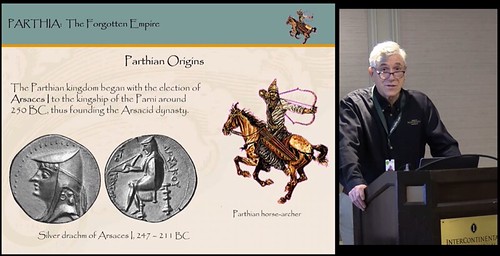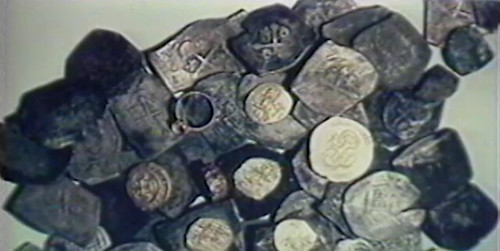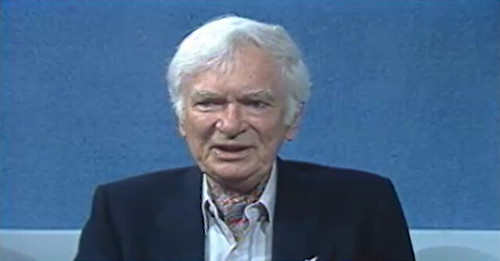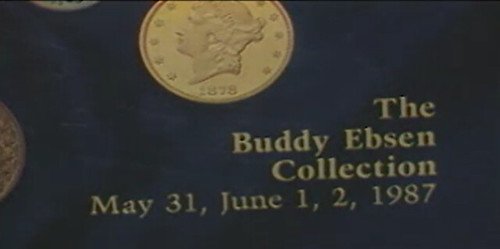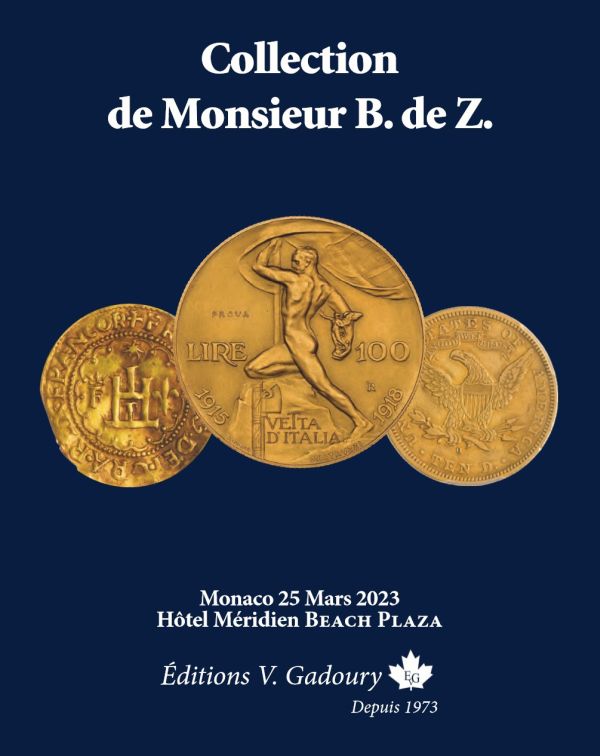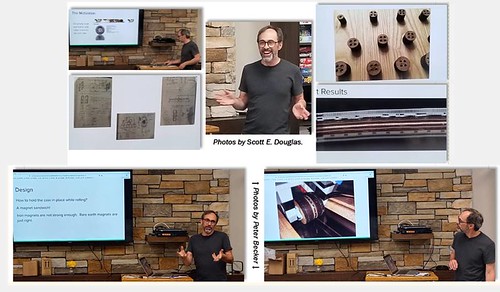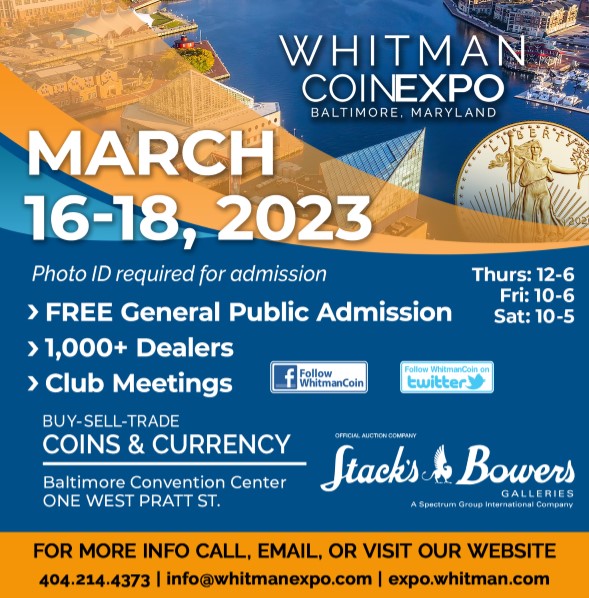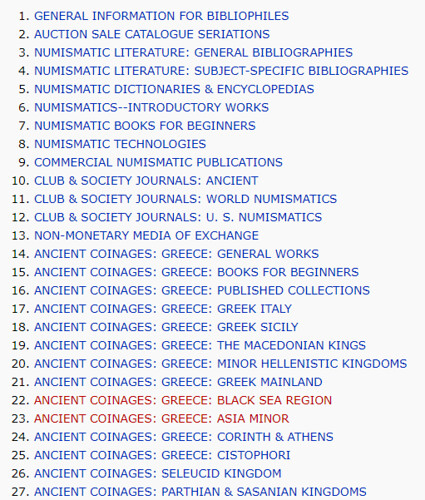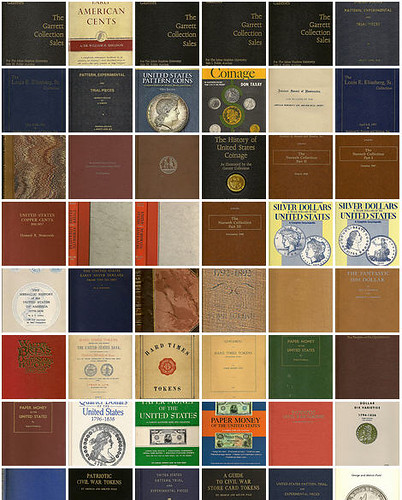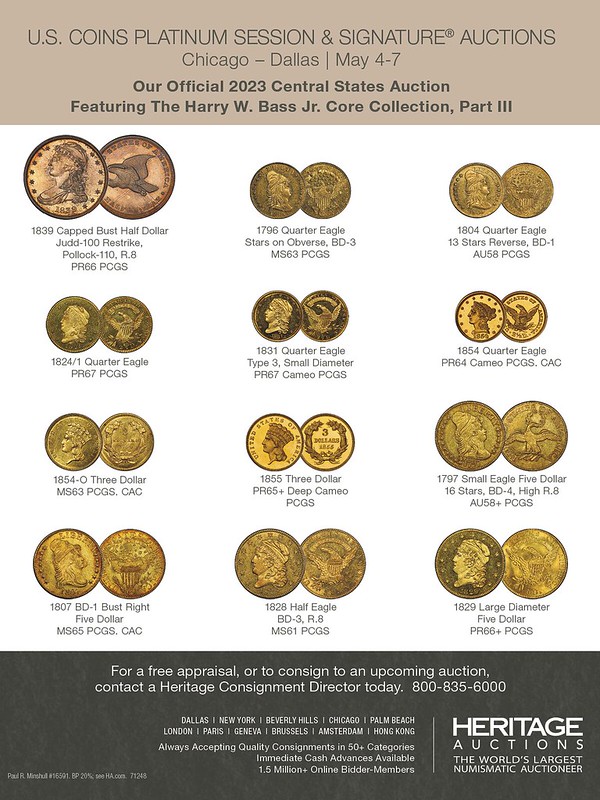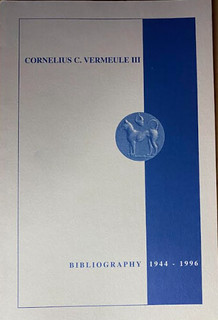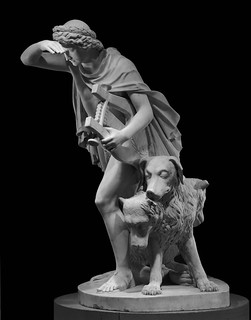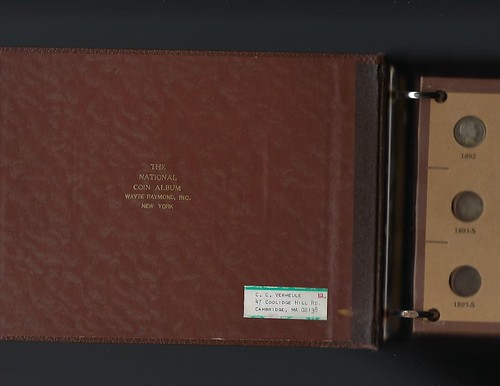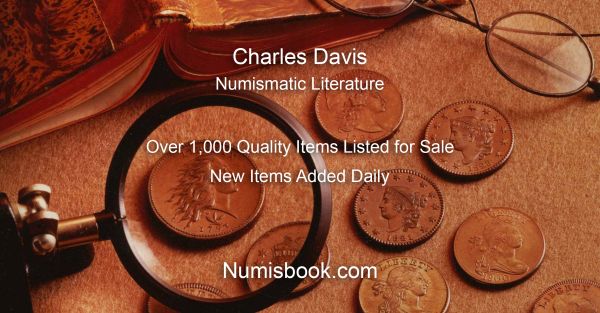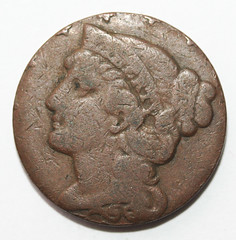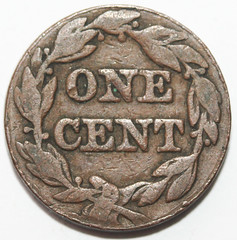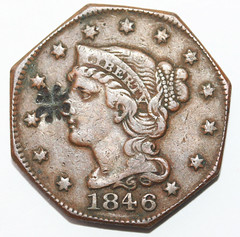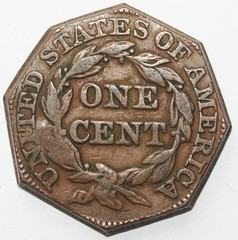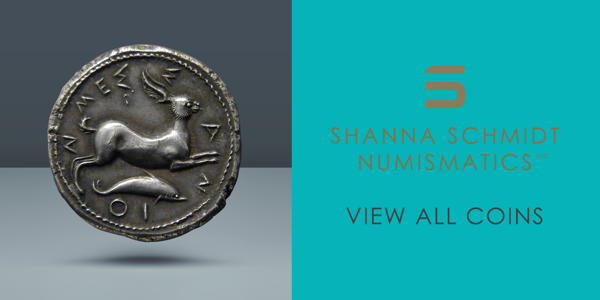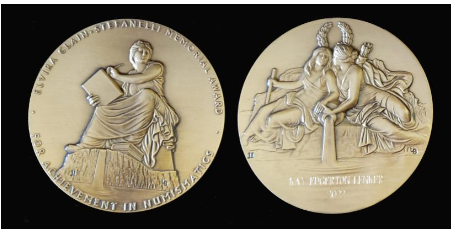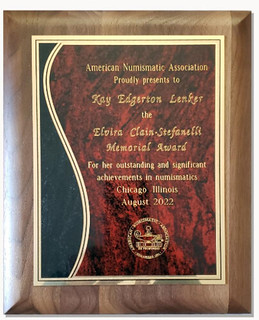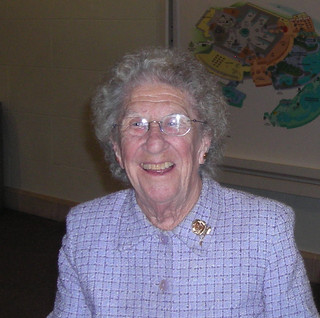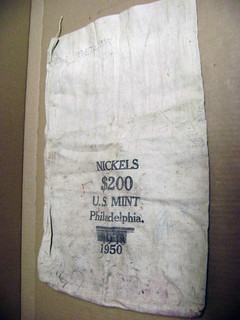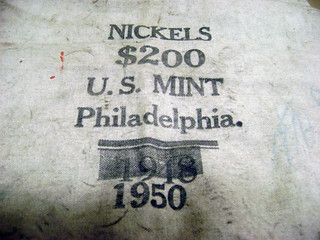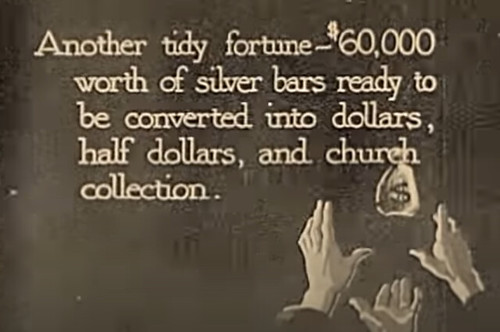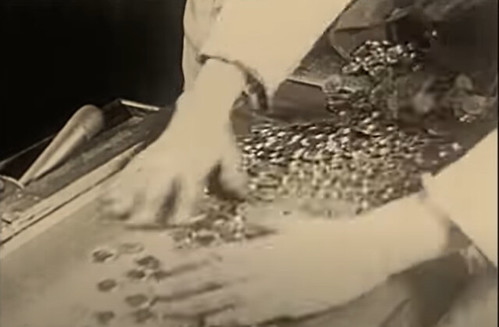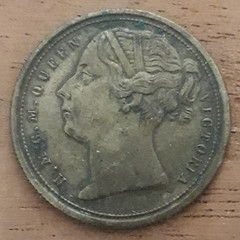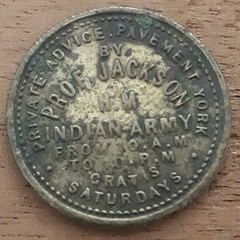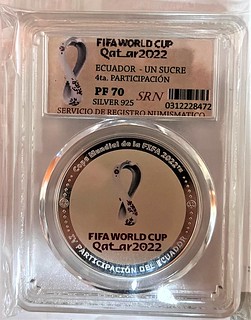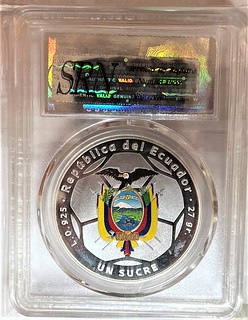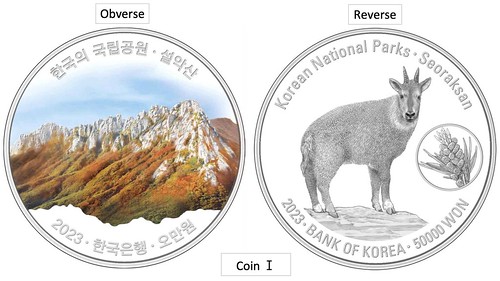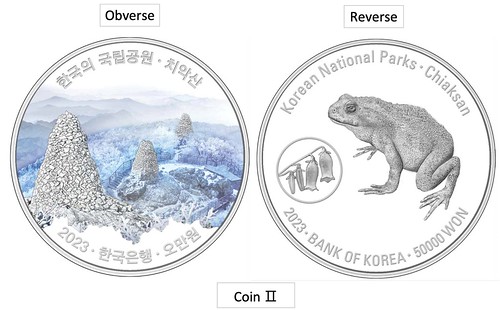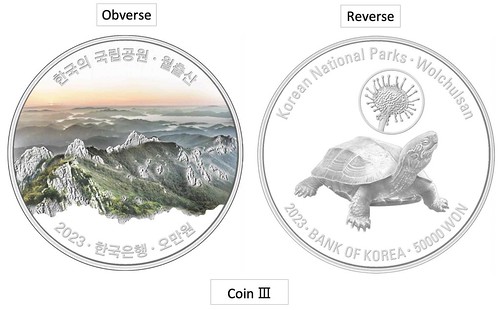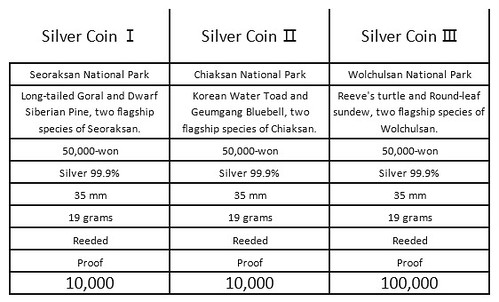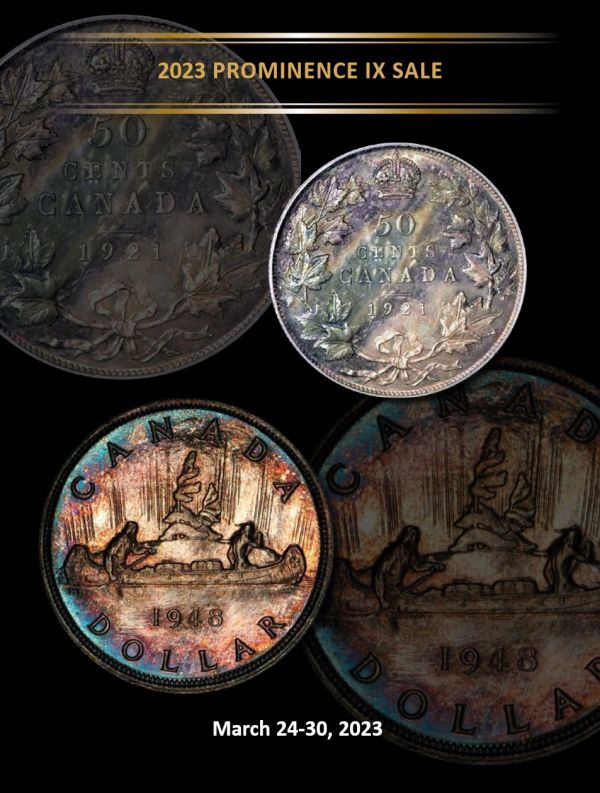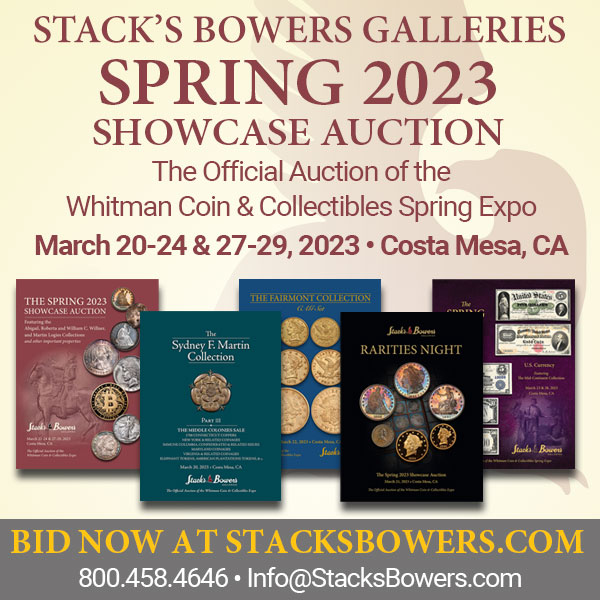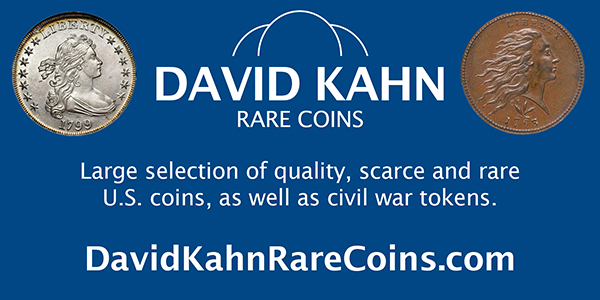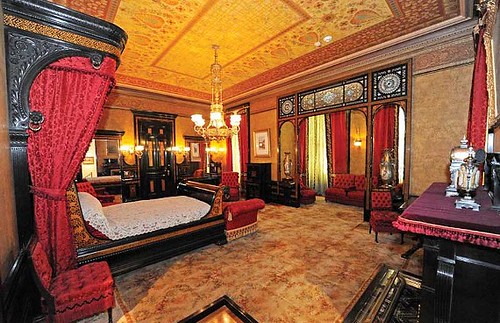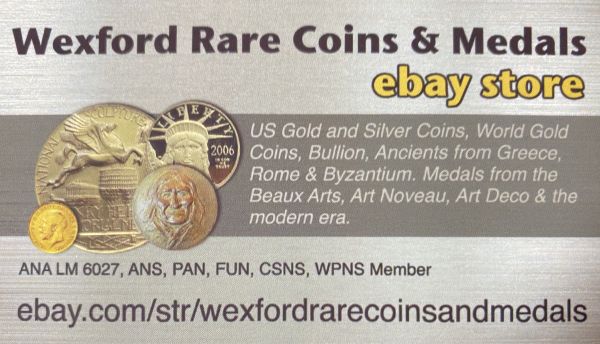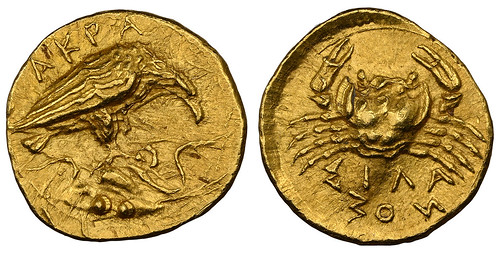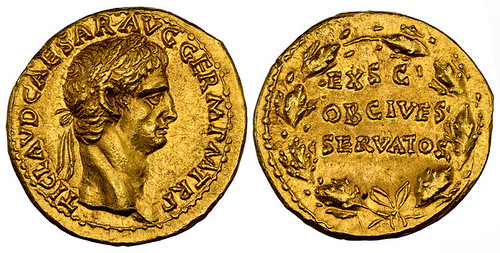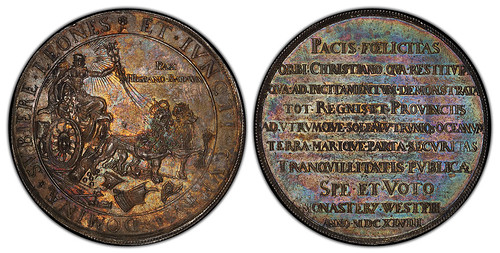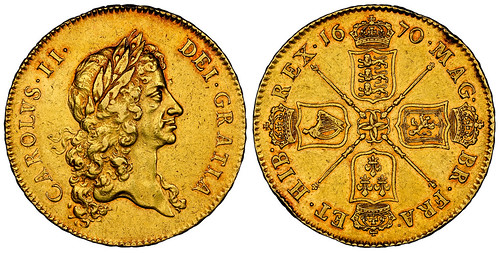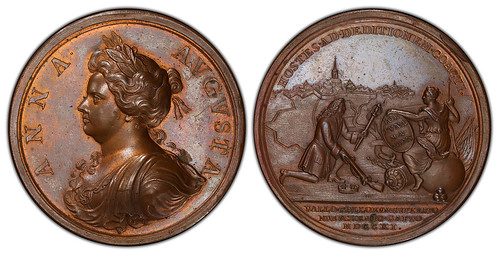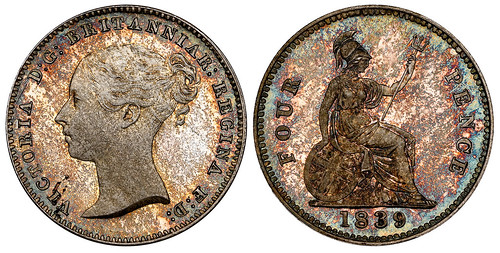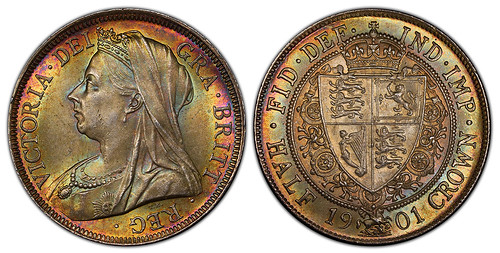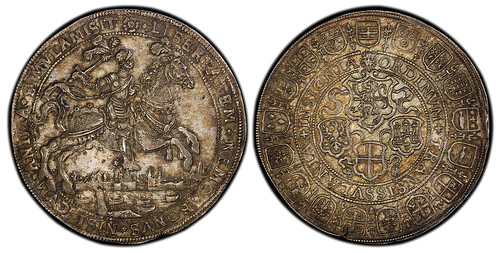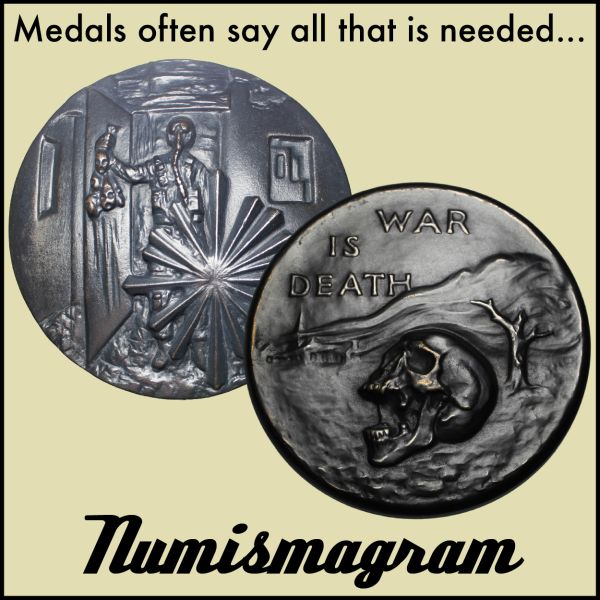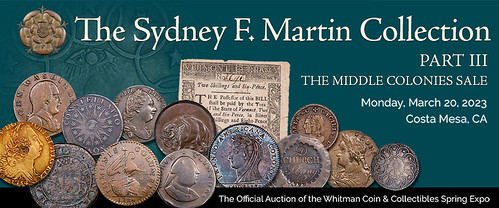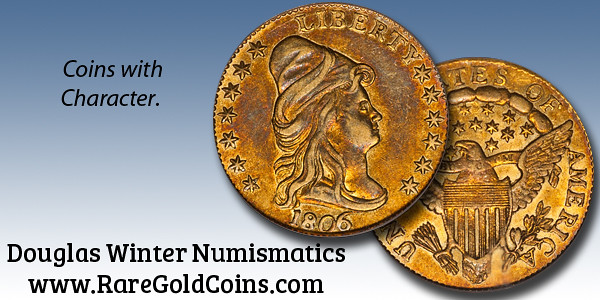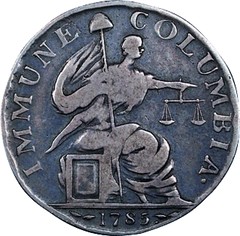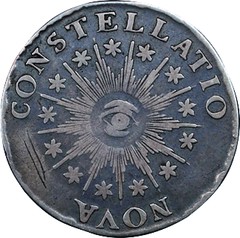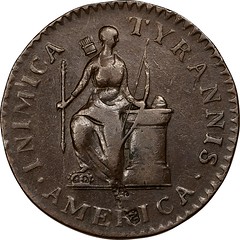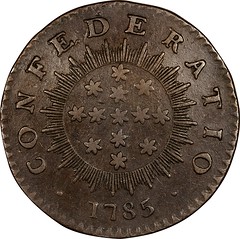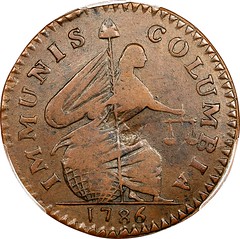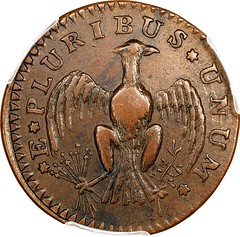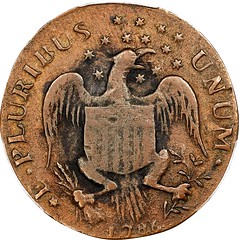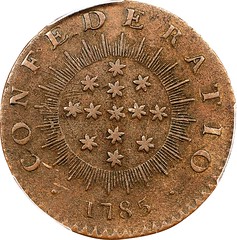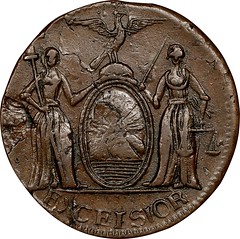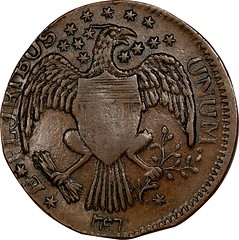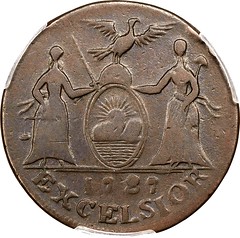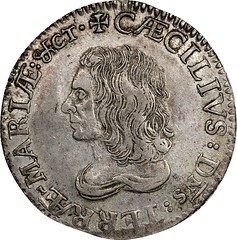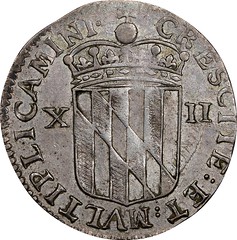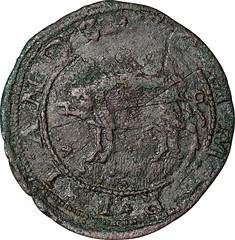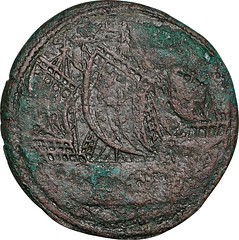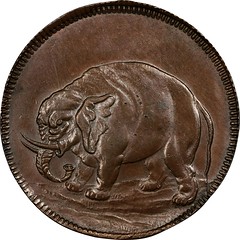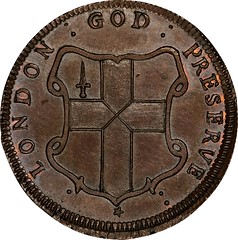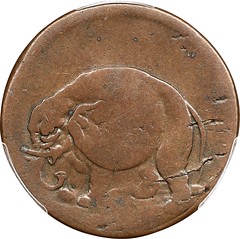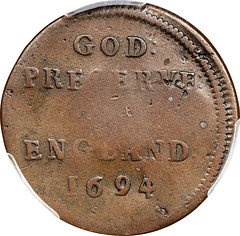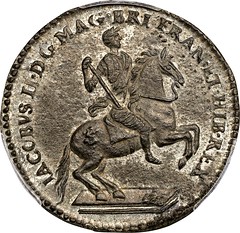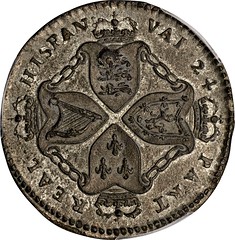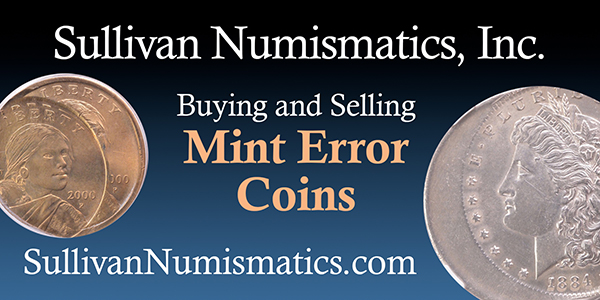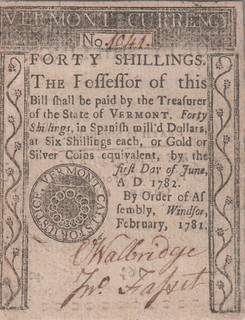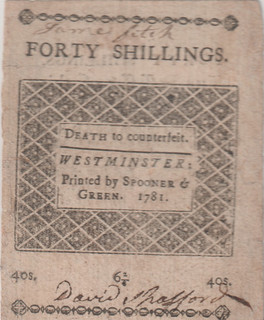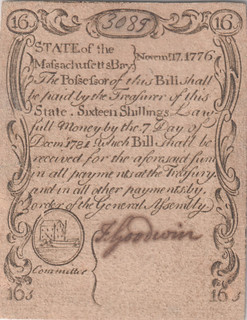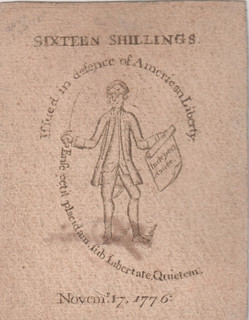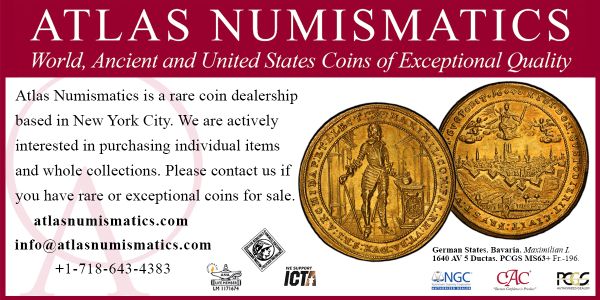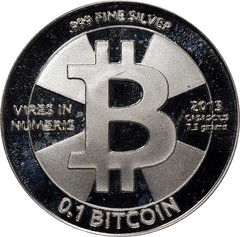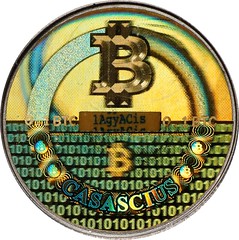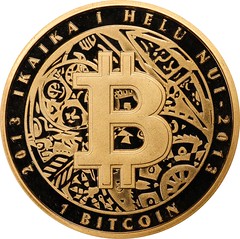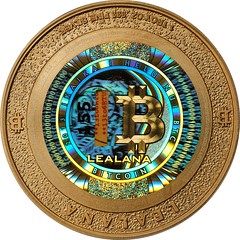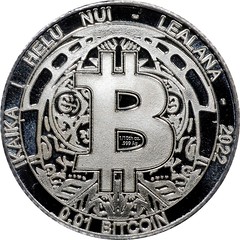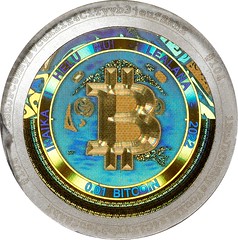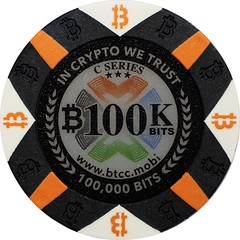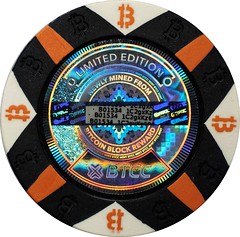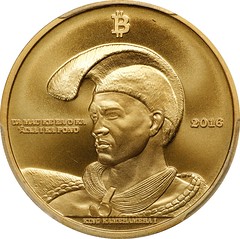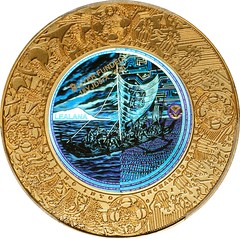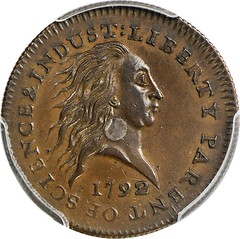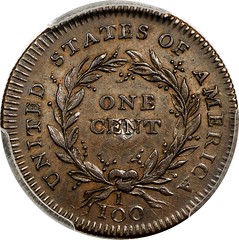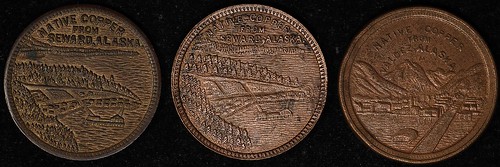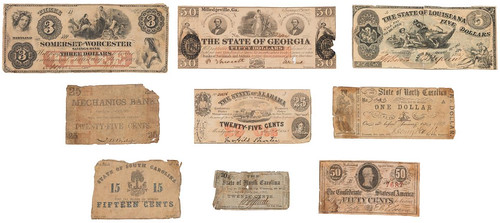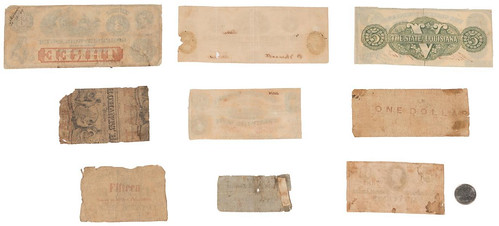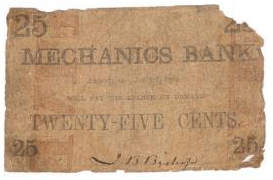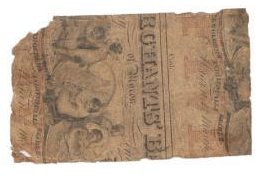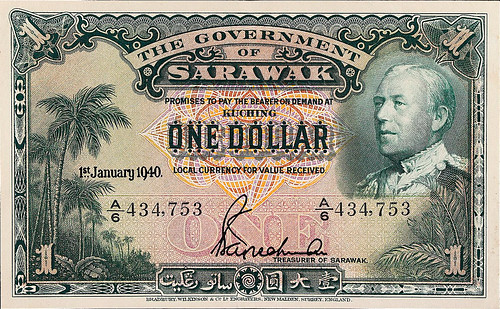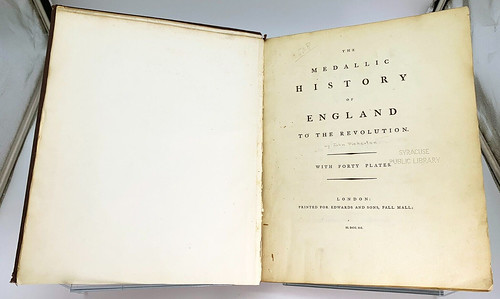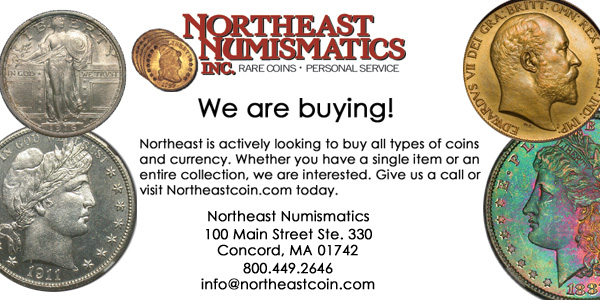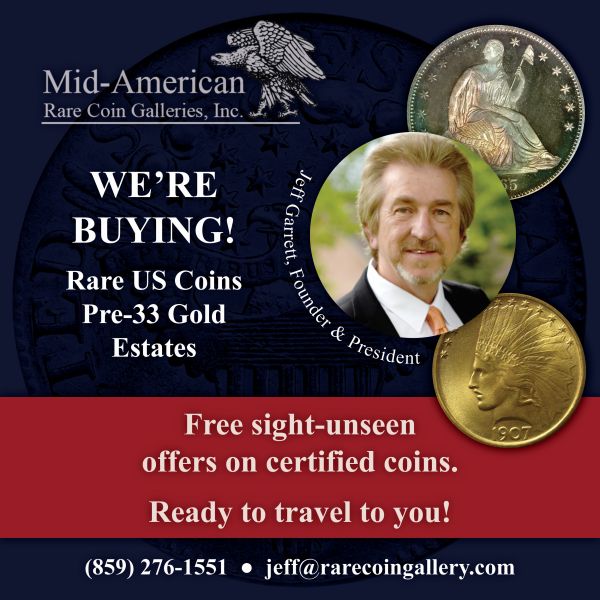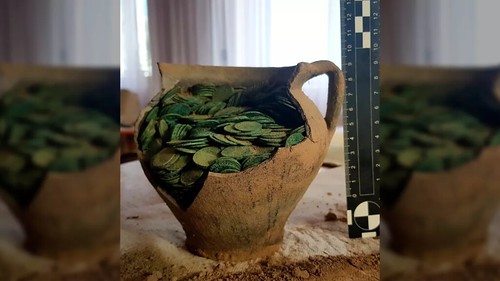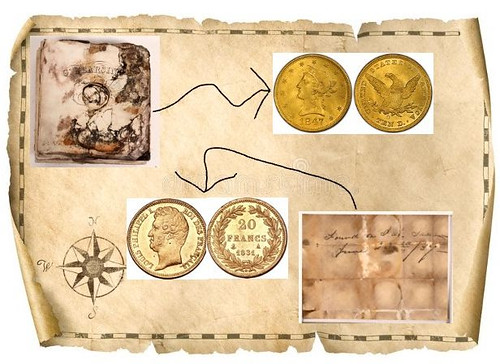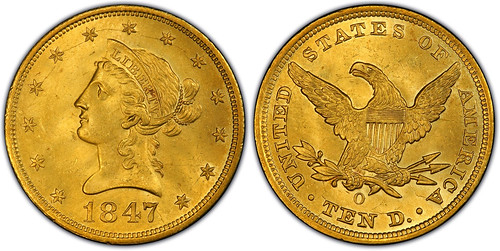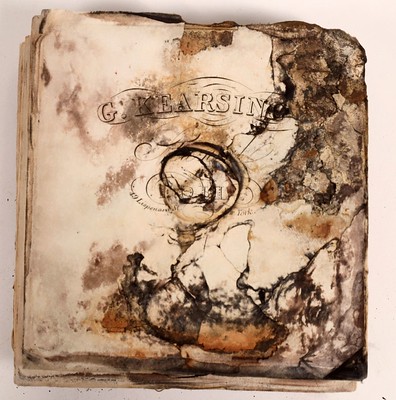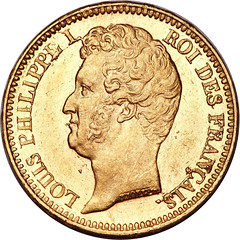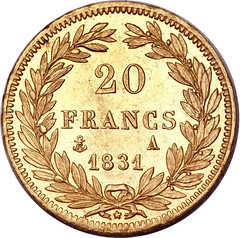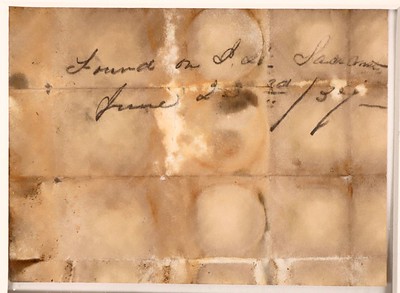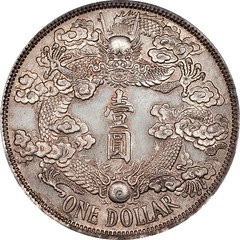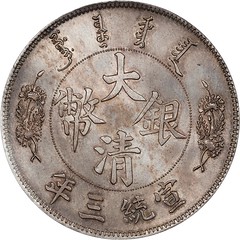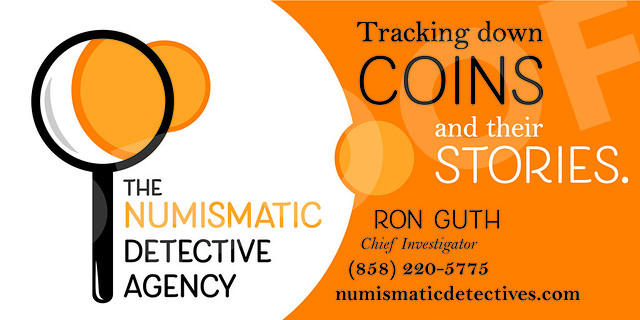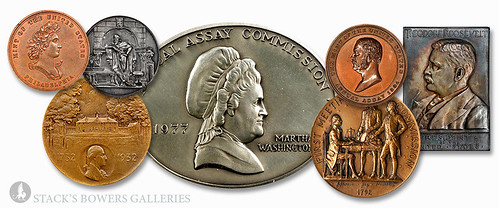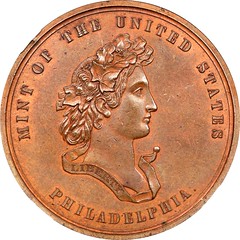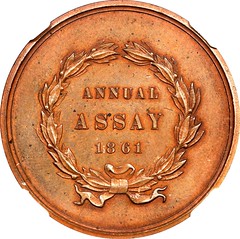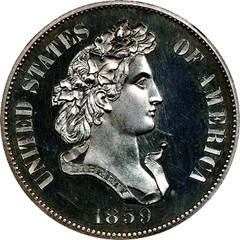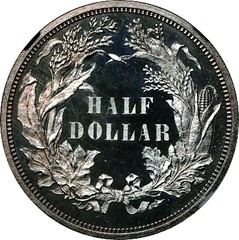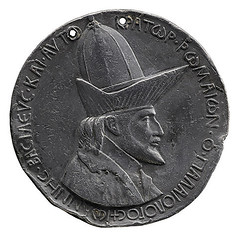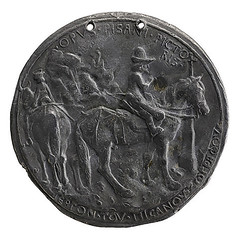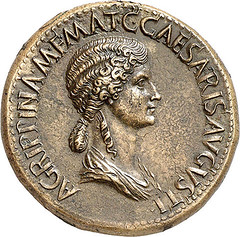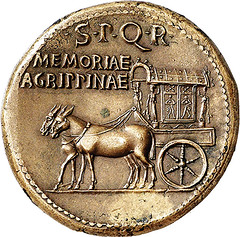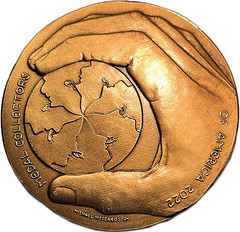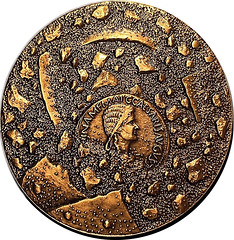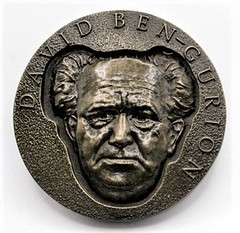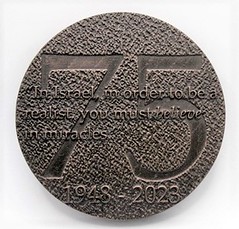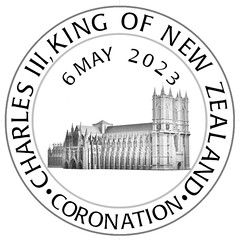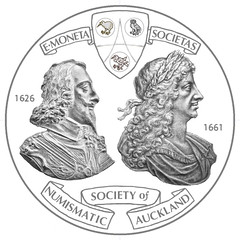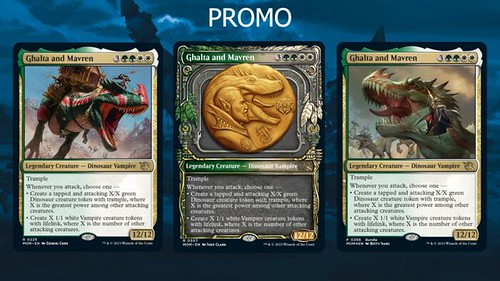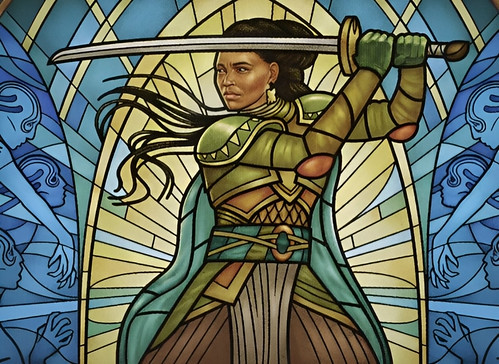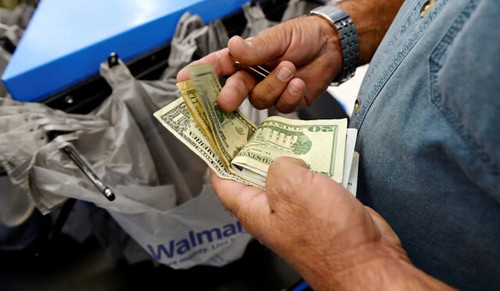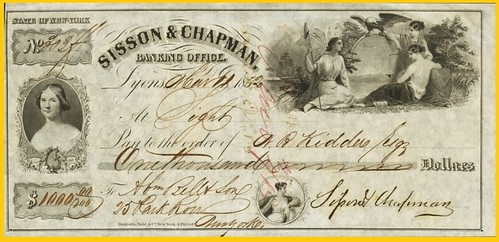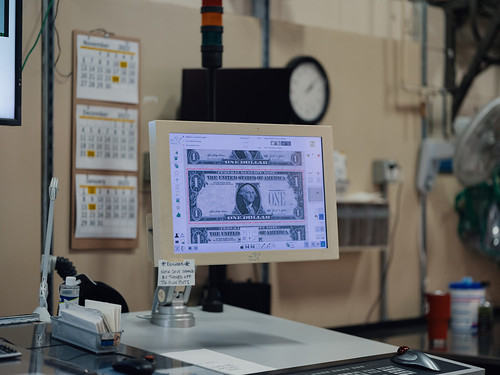
Visit our NBS Sponsors




About UsThe Numismatic Bibliomania Society is a non-profit association devoted to the study and enjoyment of numismatic literature. For more information please see our web site at coinbooks.org SubscriptionsThose wishing to become new E-Sylum subscribers (or wishing to Unsubscribe) can go to the following web page link MembershipThere is a membership application available on the web site Membership Application To join, print the application and return it with your check to the address printed on the application. Print/Digital membership is $40 to addresses in the U.S., and $60 elsewhere. A digital-only membership is available for $25. For those without web access, write to: Charles Heck, Treasurer AsylumFor Asylum mailing address changes and other membership questions, contact Chuck at this email address: treasurer@coinbooks.org SubmissionsTo submit items for publication in The E-Sylum, write to the Editor at this address: whomren@gmail.com BUY THE BOOK BEFORE THE COINSale CalendarWatch here for updates! |
- WAYNE'S WORDS: THE E-SYLUM MARCH 12, 2023
- NEW BOOK: ANCIENT GREEK AND ROMAN COINS, VOL II
- NEW BOOK: FIVE GUINEAS AND FIVE POUNDS
- NEW BOOK: 1923 WEISSENBURG INFLATION MONEY
- ORIENTAL NUMISMATIC SOCIETY SPRING 2023
- HIGGINS MUSEUM HIRES CUHAJ AS CURATOR
- POWER, IDENTITY AND ALEXANDER THE GREAT
- 2023 NYINC CONVENTION VIDEO ON NNP
- VIDEO: BUDDY EBSEN AND MORE
- PHOTOGRAPHING A COIN'S THIRD SIDE
- DON'T FORGET THE NBS WIKI!
- MORE ON CORNELIUS VERMEULE
- COPPERHEAD BADGES OF THE CIVIL WAR
- NOTES FROM E-SYLUM READERS: MARCH 12, 2023
- DAVID LANGE'S NUMISMATIC LEGACY
- RICHARD BEALE OF ROMA NUMISMATICS ARRESTED
- VOCABULARY TERMS: MISSING LETTERS AND MORE
- ARABELLA HUNTINGTON (1850-1924)
- ATLAS NUMISMATICS MARCH 2023 UPDATE
- SYDNEY F. MARTIN COLLECTION PART III
- SYD MARTIN COLLECTION PART III HIGHLIGHTS
- KAGIN'S TO OFFER NEWMAN PLATE NOTES
- STACK'S BOWERS PHYSICAL CRYPTOCURRENCY SALE
- NUMISMATIC NUGGETS: MARCH 12, 2023
- ROMAN COIN HOARD FOUND IN BERNESE ALPS
- WATCHET MUSEUM DISPLAYS ANGLO-SAXON COINS
- 17TH-CENTURY COIN HOARD FOUND IN POLAND
- REVIEWING THE MILLHOLLAND COLLECTION
- SS CENTRAL AMERICA TREASURE HUNT
- THE REVERSED DRAGON DOLLAR
- ORIGIN OF THE U.S. ASSAY COMMISSION MEDALS
- 2023 ANIMALS IN WAR AND PEACE MEDALS
- GREG LOUGANIS AUCTIONING OLYMPIC MEDALS
- THE 2022 MCA ANNUAL MEDAL
- JAHF ISSUES DAVID BEN-GURION MEDAL
- CHARLES III CORONATION COMMEMORATIVE MEDAL
- JODY CLARK'S MAGIC: THE GATHERING ARTWORK
- IN DEFENSE OF CASH
- LOOSE CHANGE: MARCH 12, 2023
Click here to read the thin version on the web
Click here to subscribe
Click here to access the complete archive
To comment or submit articles, reply to whomren@gmail.com
Content presented in The E-Sylum is not necessarily researched or independently fact-checked, and views expressed do not necessarily represent those of the Numismatic Bibliomania Society.
WAYNE'S WORDS: THE E-SYLUM MARCH 12, 2023
 New subscribers this week include:
Clifford Barber, courtesy Steve Hill;
John Dale Beety,
Cary Bown, and
Stephen Majerowicz.
Welcome aboard!
New subscribers this week include:
Clifford Barber, courtesy Steve Hill;
John Dale Beety,
Cary Bown, and
Stephen Majerowicz.
Welcome aboard!
Thank you for reading The E-Sylum. If you enjoy it, please send me the email addresses of friends you think may enjoy it as well and I'll send them a subscription. Contact me at whomren@gmail.com anytime regarding your subscription, or questions, comments or suggestions about our content.
This week we open with three new books, a periodical issue, museum announcements, updates from the Newman Numismatic Portal, and more.
Other topics this week include inflation money, the Higgins Museum, Buddy Ebsen, Cornelius Vermeule, David Lange, copperhead badges, fixed price offerings and auction previews, hoard finds, the reversed dragon dollar, the Millholland collection, Assay Commission medals, and new medal sales.
To learn more about the Oriental Numismatic Society, Alexander the Great, the coin's Third Side, the NBS Wiki, overdate mint bags, cord wood, the arrest of a coin dealer, the Capture of Bouchain medal, the Lord Baltimore Denarium, Poverty Hollow, Aethelred the Unready, and how we're transitioning into cyborgs, read on. Have a great week, everyone!
Wayne Homren
Editor, The E-Sylum
NEW BOOK: ANCIENT GREEK AND ROMAN COINS, VOL II
SPINK has published the second volume in David Sear's series on ancient Greek and Roman coins. -Editor
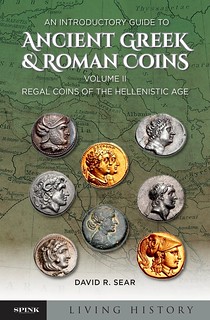 An Introductory Guide to Ancient Greek and Roman Coins Volume II: Regal Coins of the Hellenistic Age
An Introductory Guide to Ancient Greek and Roman Coins Volume II: Regal Coins of the Hellenistic Age
by David Sear
£50.00
This is the second volume (of three) of David Sear's new introductory guide to ancient coins, covering the coinages of the successor kingdoms to Alexander the Great's Vast conquests in the eastern Mediterranean region, the Middle East and beyond. It forms part of Spink's new Living History series.
Ancient coins have long fascinated generations of collectors by virtue of their beauty, the stories they tell, and for the unique insight they give into the history of the time in which they were made. They can be held, felt, and examined without the need for visiting a museum - they are, quite literally, living history.
David Sear's three volume guide is intended to give a general background to the fascinating world of ancient coins, looking back more than 26 centuries to the lands of the eastern Mediterranean, at how coins were designed and produced, and at how they can reveal so much to us today of the time in which they were produced.
David Sear is among the most notable numismatic authors writing today; his seminal texts have become the standard handbooks for collectors of ancient Greek, Roman and Byzantine coinage. His Introductory Guide is intended as an approachable and informative introduction to the hobby, and is a must for anyone interested in the history of the ancient Greek and Roman world.
For more information, or to order, see:
An Introductory Guide to Ancient Greek and Roman Coins Volume II: Regal Coins of the Hellenistic Age by David Sear
(https://spinkbooks.com/products/an-introductory-guide-to-ancient-greek-and-roman-coins-volume-ii-regal-coins-of-the-hellenistic-age-by-david-sear?variant=44453145805091)
NEW BOOK: FIVE GUINEAS AND FIVE POUNDS
Another book recently published by SPINK is Greg Holloway's work on the Great Britain Five Guineas and Five Pounds coin. I've always has a soft spot for complete books written about a single coin. -Editor
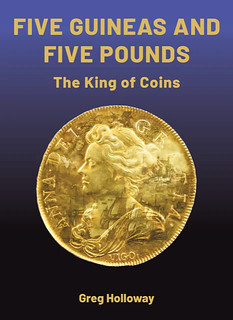 Five Guineas and Five Pounds: the King of Coins
Five Guineas and Five Pounds: the King of Coins
by Greg Holloway
£60.00
Numismatist Greg Holloway brings decades of passionate research to today's reader to learn about the greatest of European rarities, the Five Guineas and Pounds - or King of Coins.
Large grand gold coins of centuries gone by are the ultimate treasures - but the most important of all is the Great Britain Five Guineas and Five Pounds, the largest gold coin ever made for commerce for a significant period of time.
Hardback
273 x 210mm
612pp
For more information, or to order, see:
Five Guineas and Five Pounds: the King of Coins by Greg Holloway
(https://spinkbooks.com/products/five-guineas-and-five-pounds-the-king-of-coins-by-greg-holloway)
NEW BOOK: 1923 WEISSENBURG INFLATION MONEY
Here's a Google-translated article from Geldscheine Online about a new (free!) book on the 1923 inflation money of Weissenburg, Germany. -Editor
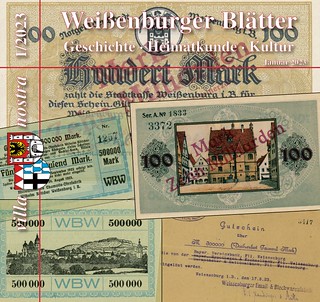 Crisis year and inflation 1923 in Weißenburg
Crisis year and inflation 1923 in Weißenburg
35 pages, illustrated in colour, format 200 x 210 mm, soft cover with staples;
Free delivery by the city administration: https://www.weissenburg.de/kontakt/
Free PDF download: https://www.weissenburg.de/villa-nostra/
100 years ago German inflation peaked. Since the beginning of the war in 1914, the value of the mark has steadily decreased and from August 1923 it was in free fall. The currency was not stabilized until November with the help of the Rentenmark.
The Weißenburg city archivist Reiner Kammerl recalls the German hyperinflation of 1923 in the context of the Weißenburger Blatter
. The economic situation of the Weißenburg citizens is initially the focus of his presentation. He recalls the causes of inflation, the enormous costs of the war, financing through war bonds, reports on life with inflation. From city council minutes, the reader learns about the city's efforts to ensure the food supply, e.g. B. of the enormous difficulties that prepared the potato purchase in Stettin in the fall of 1923. An overview of price developments, a newspaper advertisement about the weekly subscription price of the Weißenburger Zeitung, a newspaper report on the economic figures of December 12, 1923, etc. make the full extent of the inflation visible.
Kammerl is not only limited to the year 1923, but also reports on measures taken by the city and by organizations with which the needy were supported: people's kitchen, Weißenburg relief organization, soup kitchen of the Red Cross.
Of course, emergency money takes up the largest part of the booklet. First, the author explains what is meant by emergency money and then gives a brief overview of the different eras of emergency money. Then he deals with the emergency money issues of the city of Weißenburg, beginning with the wartime emergency money notes with the issue date of
11 December 1916 and the 50 Pfennig war coin from 1918/19. This is followed by an account of a failed emergency money project from 1921 and the emergency money notes of 1922. The various issues of hyperinflation follow. The last group of city emergency money includes the notes denominated in gold marks, which, according to the city council decision of December 18, 1923, should primarily be used to collect the old paper emergency money and to pay salaries and wages to city officials and workers. Finally, the redemption of the municipal emergency money is reported.
The emergency money notes from Weißenburg companies are presented as an appendix, so to speak. Kammerl remarks that the municipal coffers were instructed not to accept company certificates and that this is probably the reason why only a few issues have survived in the municipal collections. The conclusion is the camp fee of the officers' prison camp at the Wülzburg Fortress.
The author does not intend to replace an emergency money catalog with this issue. It is primarily aimed at interested citizens of the city of Weißenburg, but collectors will also be pleased with the colored illustrations of the notes and the detailed background information.
The booklet was published in an edition of 2,500 and is distributed free of charge by the city administration, but it can also be downloaded free of charge as a PDF.
To read the complete article, see:
Reiner Kammerl: Krisenjahr und Inflation 1923 in Weißenburg
(https://www.geldscheine-online.com/post/reiner-kammerl-krisenjahr-und-inflation-1923-in-wei%C3%9Fenburg)
ORIENTAL NUMISMATIC SOCIETY SPRING 2023
The latest issue of the Journal of the Oriental Numismatic Society will be available soon. Editor Paula Turner submitted the issue contents. Interesting topics. -Editor
A Yaudheya coin of the bull/elephant type with a new legend
Devendra Handa
A gold parcel hoard of Kanishka I from Skhakot, Malakand District near Peshawar, Pakistan
Gul Rahim Khan
A unique Fatimid damma from ‘al-Sind wa al-Hind'
Bilal Ahmed
A group of twelfth-century Indian gold coins from Balkh
John S. Deyell
Reading suggestions and revised attribution for some Malay tin coins recovered from the Batanghari and Musi rivers, Sumatra
Aditya Bayu Perdana
ONS news
Book reviews and notices
For more information on the Oriental Numismatic Society, see:
https://www.orientalnumismaticsociety.org/
HIGGINS MUSEUM HIRES CUHAJ AS CURATOR
George Cuhaj has been hired as curator of the Higgins Museum of National Bank Notes. -Editor
Higgins Museum hires Cuhaj for 2023 Summer Season
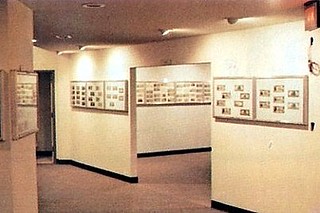 The Higgins Museum of National Bank Notes has hired George Cuhaj as curator for the
2023 summer season.
The Higgins Museum of National Bank Notes has hired George Cuhaj as curator for the
2023 summer season.
Located in Okoboji, Iowa since 1978, the museum has the largest collection of National
Bank Notes on permanent exhibition in the nation. The exhibition includes examples of
large and small size bank notes of all series and denominations with primary emphasis on
Iowa and surrounding states. Additional items include bank postcards, a bank teller's
cage, intaglio spider
press, a four note sheet signature imprint machine and cutter in
addition to an extensive research library with a banking emphasis.
Cuhaj returns to numismatic employment after a stint as the palliative caregiver for his aging parent. Previously he was with Krause Publications and served as editor of annual editions of the Standard Catalog of U.S. Paper Money, in addition to the multi-volume series of the Standard Catalog of World Coins and Standard Catalog of World Paper Money.
The Museum is open Memorial Day thru Labor Day, Tuesdays thru Sundays, 11AM to 5 PM. Admission is free, tour groups are welcome by appointment. Located at 1507 Sanborn Ave., Okoboji, IA 51355.
For additional information visit the website at thehigginsmuseum.org.
Here's more background on George and his numismatic career. -Editor
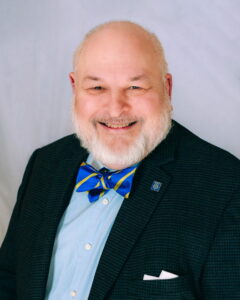 George Cuhaj has been involved in all facets of numismatics for his professional career.
George Cuhaj has been involved in all facets of numismatics for his professional career.
While a resident of New York City he was employed as computer systems operator at the American Numismatic Society, a public museum and research institution, followed by a stint as cataloger with Stack's Rare Coins, a premier auction house.
Relocating to the Midwest in 1994 he joined the editorial staff at Krause Publications with responsibility for the Standard Catalog of World Coins and Standard Catalog of World Paper Money and their transition to the online NumisMaster data base.
Cuhaj also was editor of the Standard Catalog of United States Paper Money, transitioning that publication from black and white to one fully illustrated in color.
He has served the hobby as a past board member of the International Bank Note Society and the Central States Numismatic Society in addition to serving twice as president of the American Medallic Sculpture Association. In civic life, he has been the archivist for the Brooklyn Tech Alumni Foundation and most recently the treasurer of the Iola Historical Society.
He has written numerous articles for national, regional and local publications, and during the COVID era embraced hosting informative zoom meetings with collectors featuring power point presentations. For the 2022-23 year he was awarded a research grant by the Eric P. Newman Numismatic Education Society for a project he developed cataloging the medals of the Catholic Hierarchy and Cathedrals in the United States. The results will be available as an e-book in the fall of 2023.
Learning from numismatic artists, he has participated in the bi-annual international FIDEM art medal congresses since 1987 and will have two art medals included in the 2023 congress exhibition in Florence, Italy.
He has been a life-long Boy Scouter earning the Eagle Scout award as a youth and as an adult has been recognized with the Silver Beaver Award and the Vigil Honor in the Order of the Arrow. Since 2002 he has worked with the editorial division of the Boy Scouts of America with updates to scouting's Coin Collecting merit badge pamphlet. He currently serves as a board member on the Bay Lakes Council Scout Museum.
To read the complete article, see:
https://thehigginsmuseum.org/curator/
POWER, IDENTITY AND ALEXANDER THE GREAT
Curator Marina Fischer passed along a great set of photos of the new exhibit The Birth of Portraiture: Alexander the Great and His Successors at the Nickle Galleries, University of Calgary. Here are a few selected photos - see the complete gallery online for a tour of the exhibit.
The University is also sponsoring a two-day numismatic symposium at the conclusion of the exhibit's run. -Editor
To view the exhibit photos, see:
The Birth of Portraiture: Alexander the Great and His Successors
(https://www.flickr.com/photos/coinbooks/albums/72177720306659412)
Power, Identity and Alexander the Great is a symposium held in conjunction with the end of Nickle Galleries' exhibition, The Birth of Portraiture: Alexander the Great and His Successors, curated by Marina Fischer.
This two-day event is free and will be of interest to students, faculty, collectors and members of the general public.
Speakers:
Susan Taylor, Artist and Engraver Royal Canadian Mint
David Bergeron, Curator, Bank of Canada
Terence Cheesman, Expert on ancient coins
Carolyn Willekes, Military Historian and Classicist, Mount Royal University
Francois Rufiange, Numismatics Educator
Michael Walsh, Trajan Publishing Corporation owner and publisher of Canadian Coin News
Dates
APRIL 29, 2023, 9:30 – 4:30pm followed by a reception, 5:00 – 8:00pm
Free with pre-registration
April 30, 2023, 9:30 – 3:00pm
Free with pre-registration
Organized by Nickle Galleries, University of Calgary in partnership with the Calgary Numismatic Society.
Exhibition Website (please see all the links to events to the right, including 2 tours, March 14 and April 4)
https://nickle.ucalgary.ca/exhibition/upcoming-the-birth-of-portraiture-alexander-the-great-and-his-successors/
Talk by Dr. Carolyn Willekes on March 16
https://nickle.ucalgary.ca/event/nn-carolyn-willekes-horses-and-royal-identity-in-the-hellenistic-world/
Numismatic Symposium April 29-30
https://nickle.ucalgary.ca/event/symposium-power-identity-and-alexander-the-great/
To read the earlier E-Sylum article, see:
EXHIBIT: BIRTH OF PORTRAITURE: ALEXANDER THE GREAT
(https://www.coinbooks.org/v26/esylum_v26n10a10.html)
2023 NYINC CONVENTION VIDEO ON NNP
The latest addition to the Newman Numismatic Portal is video from the January 2023 NYINC. Project Coordinator Len Augsburger provided the following report. -Editor
New York International Numismatic Convention Video on Newman Portal
The New York Numismatic International Convention is a fixture on the annual coin calendar, featuring a robust array of auction sales, a vibrant bourse, and an engaging program of meetings and presentations. The American Numismatic Society annual Gala, held the same week, is the perfect go with
event and highlights academic and organizational advancements over the past year.
Video from presentations delivered at the recent January NYINC are now available on Newman Portal. Speakers include John Kraljeivch, Doug Davis, Ursula Kampmann, Doug Mudd, Peter Tompa, David Vagi, Joel Iskowitz, and Their Royal Majesties Alanus I - Rex Bermaniae and Barbara Regina of the Royal House of Ususvir. NNP acknowledges Paul Russell, NYINC Chairman, for his assistance with this content, and Lianna Spurrier of Numismatic Marketing for providing video services.
Link to New York International Numismatic Convention video on Newman Portal:
https://nnp.wustl.edu/library/multimediadetail/529486?Year=2023
THE BOOK BAZARRE
Bowers Serieswas written by award-winning author Joshua McMorrow-Hernandez, who presents these silver coins to both collectors and investors. 384 pages. Order your copy online at Whitman.com , or call 1-800-546-2995.
VIDEO: BUDDY EBSEN AND MORE
The David Lisot Video Library on the Newman Numismatic Portal can be found at:
https://nnp.wustl.edu/library/multimediadetail/522852
We highlight one of his videos each week in The E-Sylum. Here's one from 1987 where David interviews actor Buddy Ebsen, dealer David Hall, and others. -Editor
David reports numismatics to a national audience. He also interviews Carl Fismer, Buddy Ebsen, David Hall, and more.
The video includes a segment with Florida treasure diver Carl Fismer, the American Numismatic Association's plans to "grade the graders" and administer a "Master Numismatist" program.
The highlight is a nice talk with actor Buddy Ebsen on the upcoming sale of his coin collection. Ebson played Jed Clampett on The Beverly Hillbillies and detective Barnaby Jones. One highlight of his collection was a $4 Stella, but he also appreciated the appeal of circulated coins, such as his $50 slug with nicks in it - a piece of history attesting to its actual use in commerce.
Ebsen discussed his Attica Greek coin, made from a melted-down statue of Athena. For investment, he recommended quality ancient coins. Great interview with an entertainment giant and enthusiastic collector. -Editor
To watch the complete video, see:
https://nnp.wustl.edu/library/book/584191
PHOTOGRAPHING A COIN'S THIRD SIDE
Judy Blackman passed along this announcement of the first South Wellington Coin Society Literary Award. Thank you, and congratulations! -Editor
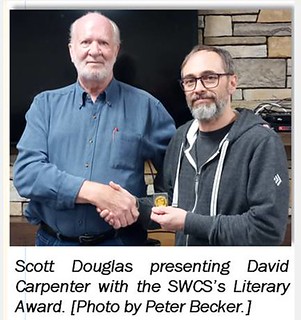 President Scott E. Douglas presented the first South Wellington Coin Society Literary Award to David Carpenter for his article titled "Scanning on the Edge: Photographing a Coin's Third Side" (go to this link to read the article starting on page 5,
https://nnp.wustl.edu/library/book/621680).
President Scott E. Douglas presented the first South Wellington Coin Society Literary Award to David Carpenter for his article titled "Scanning on the Edge: Photographing a Coin's Third Side" (go to this link to read the article starting on page 5,
https://nnp.wustl.edu/library/book/621680).
After this article was published, folks wanted to see David's invention, so he kindly demonstrated it before the SWCS members during the August 2022 membership meeting (see photos herein). David presented his ground breaking invention, which is one of the most useful ever encountered by numismatists. David created a lot of excitement in the hobby.
Congratulations David! The new South Wellington Coin Society Literary Award is designed to recognize authors of articles on significant numismatic subjects. David said, Thanks very much! It's really great to be recognized.
For more information on the South Wellington Coin Society, see:
https://www.southwellingtoncoinsociety.ca/
DON'T FORGET THE NBS WIKI!
David Fanning writes:
"I was talking with a friend who is undertaking a research project and trying to answer some questions he had, when I remembered the NBS Wiki and, in particular, its bibliography. This is a really useful resource and one that unfortunately is under-utilized. I tend to forget it's out there, and it obviously took a lot of work to put it together (I had nothing to do with it). If you could give it some exposure through The E-Sylum, that would be great."
Indeed. While overshadowed by the newer and much larger Newman Portal, the Numismatic Bibliomania Society's website Wiki section is a wealth of great information, well organized. Built with the help of NBS members and E-Sylum readers led mainly by Tom Wetter it's still available on the website and sees a decent amount of traffic from Internet searchers.
The bibliography has 105 sections including General Information, Ancient Coinages, Medieval, Modern, Paper Money and Grading. -Editor
To visit the NBS Wiki, see:
Welcome to the Numismatic Bibliomania Society Wiki
(http://wiki.coinbooks.org/index.php/Main_Page)
For the NBS "Top 100" List, see:
The One Hundred Greatest Items Of United States Numismatic Literature :
A Survey of the Numismatic Bibliomania Society
(http://wiki.coinbooks.org/index.php/
The_One_Hundred_Greatest_Items_Of_United_States_Numismatic_Literature)
For the bibliography, see:
Numismatic Bibliography
(http://wiki.coinbooks.org/index.php/Numismatic_Bibliography)
For auction sale listings, see:
Auction Sale Catalogues Listings (Alphabetical by Firm)
(http://wiki.coinbooks.org/index.php/AUCTION_SALE_CATALOGUE_SERIATIONS)
Auction Sale Listings
(http://wiki.coinbooks.org/index.php/Category:Auction_Sale_Listings)
To read the earlier E-Sylum articles, see:
NBS WEB SITE UPDATE: A BIBLIOPHILE'S BIBLIOGRAPHY
(https://www.coinbooks.org/esylum_v13n14a02.html)
WANTED: COIN BOOK IMAGES FOR NBS BIBLIOGRAPHY
(https://www.coinbooks.org/esylum_v13n42a02.html)
NBS WEB SITE BIBLIOGRAPHY UPDATE
(https://www.coinbooks.org/esylum_v13n24a02.html)
NBS U.S. NUMISMATIC BIBLIOGRAPHY PROJECT UPDATE
(https://www.coinbooks.org/esylum_v13n38a02.html)
NBS WIKI WOODWARD SALE PAGE COMPLETED
(https://www.coinbooks.org/esylum_v17n43a02.html)
MORE ON CORNELIUS VERMEULE
Patrick McMahon submitted these thoughts on Cornelius Vermeule. Thank you. -Editor
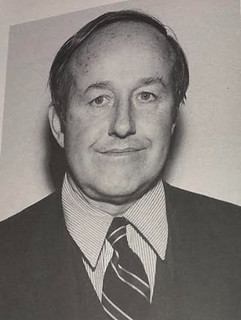 Last week, Pete Smith wrote that his article about Cornelius Vermeule was a
Last week, Pete Smith wrote that his article about Cornelius Vermeule was a frustrating article to research.
I can honestly say that that fact would have delighted Cornelius himself. And I have to say I still miss him terribly!
I didn't know Cornelius Vermeule until the last four or so years of his life. But during that time, he would call me at least three times a week. He was wheelchair-bound and had limited opportunities to visit the museum . But when the Classical department told me he was in the building I would come to see him. He was larger than life and this is mostly a reminiscence, but I do have one correction about the re-issue of Numismatic Art in America.
When we talked to each other, we mostly talked about numismatics, the Red Sox, or Boston College. He also liked to send requests or musings on postcards by regular mail. He would fill every inch of space on the card, vertically separating the text from the address with one of his address labels. He would always cross out Dr.
on the label and write Khedi
in its place. And he always signed off as Khedi. I have one message from him where he was criticizing the then new Presidential dollars (he did not like the size) and signed off as Khedi Rittenhouse. Khedi is Arabic or Turkish for Dog
and he loved dogs. He created a large collection of medals focusing on dogs and eventually gave it to Princeton University. He was a great character and storyteller and he liked nicknames and coded references—he always referred to the MFA as Mother Museum.
Harvey Stack knew him as Bucky.
I stuck with Cornelius.
When Cornelius would answer the phone his greeting was Marhaba? And sometimes he would answer in a fake voice. One time when he was being pestered by a reporter that he did not wish to talk to, he answered with one of his fake voices, a female sounding voice and he told the caller that Dr. Vermeule was away on vacation in New Zealand. He was absolutely thrilled to see the eventual article said something about how he could not be reached for comment and his housekeeper
had said he was out of town.
When he retired from the museum in 1996 a bibliography of his writing was published and it runs 61 pages in length. His first article was a biographical essay in 1944 of the numismatist Henry Cohen for the Stacks family's Numismatic Review. But his second article was about the brand new transit token being used on one of the NY/NJ transit systems. His tastes ranged over almost everything and in addition to his dogs he claimed to have tortoises wandering his house. I am still not quite sure which of his stories were true and which were tests of my gullibility. At the museum he had stores of model trains and baseball cards. He also used to leave dog biscuits for Cerberus on the plinth of the great sculpture by Thomas Crawford that he and Emily gave the museum the funds to purchase. When he would refer to Emily, which he did quite often, he referred to her as his late but punctual
wife.
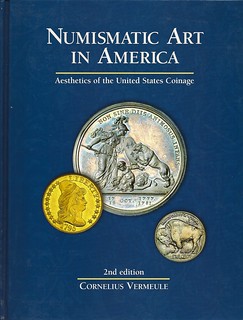 Pete mentions the new edition of Numismatic Art in America. This was one of the
Pete mentions the new edition of Numismatic Art in America. This was one of the requests
Cornelius assigned to me—being his eyes for him because of his cataracts. I also think he just wanted to stay out of the details. So I would review the galleys with him over the phone and suggest things to be updated or changed and then send them back to Whitman. We did a lot of work helping source some of the images from the original edition where they couldn't be replaced by something from Stacks digital archive. But Cornelius did not write the updated entries for the recent coins like the State Quarters. David Alexander did that work and I remember when I told CCV who Whitman had chosen for that he was quite pleased with that choice. I think it was a good choice too because Cornelius definitely did not have much positive to say about recent Mint products!
For more on the Orpheus and Cerberus statue, see:
Orpheus and Cerberus
(https://collections.mfa.org/objects/40809/)
David Gladfelter has something to add as well. -Editor
David writes:
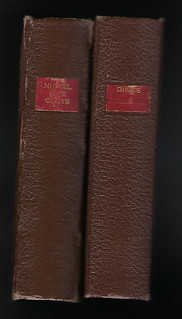 "Thanks to Pete Smith for expanding his biography of Mr. Vermeule. I regret not having met this delightful person; I knew him only through what he has published.
"Thanks to Pete Smith for expanding his biography of Mr. Vermeule. I regret not having met this delightful person; I knew him only through what he has published.
"At a coin show some years ago, Charlie Davis had at his table a good number of old but serviceable National Coin Albums and pages, which I have always liked for their safe storage capacity and easy-to-view clear slides. I picked out several, including some that once belonged to Mr. Vermeule. They are nice association items, and show that when he started collecting, probably in the late 1940s-early 1950s time frame, he began with nickels and dimes
just like everyone else, expanding to more specialized fields as his hobby matured into a discipline.
"Warning: Once the bug bites you, that can happen."
Indeed. Thank you - nice association items. -Editor
To read the earlier E-Sylum article, see:
CORNELIUS CLARKSON VERMEULE III (1925-2008)
(https://www.coinbooks.org/v26/esylum_v26n10a13.html)
COPPERHEAD BADGES OF THE CIVIL WAR
L. Michael Lawrence writes:
"As to the cut down large cents in the last couple of E-Sylum installments - If the two round pieces shown in the images were done contemporary to the times (circa 1860's and the Civil War) and are not more recent works, then they are examples of copperhead badges
which were carried in the North by confederate sympathizers who did not support the war and were used as identifiers with like minded people at the time. There is a fair amount of information available online by searching copperhead badges
or copperhead coins/tokens
. Genuine examples are collectible as early copper exonumia or civil war tokens, but later reproductions are out there and dedicated reproductions are also. They are another item of history pertaining to Civil War times."
Bill Groom writes:
"During the Civil War, the so-called copperheads were regarded as snakes-in-the grass by soldiers fighting and dying in far-off fields to sanction liberty for all. The oppositional view was that fighting and funding the war was, in effect, an infringement on their personal liberty, their free choice. To emphasize their position, badges were fashioned from large cents, cutting them down in order to accentuate the "copper head" of Lady Liberty. As evidenced by the news stories in my article, many of these were worn as pinned badges; this, resulting in serious public clashes. I suspect that, in order to avoid violent consequences, many a copperhead or "copper head" preferred to carry their badge in their pocket. Looking at Dave Schenckman's piece, I strongly suspect that someone once gave that particular copperhead badge a good punch-in-the-nose!"
Duuuhh! How could I manage to forget that we'd discussed this topic before? Bill Groom submitted a great article on these in 2019, and I'll republish an except here - follow the link below for the complete piece. -Editor
Many of the so-called Copperhead Democrats openly flaunted their political position by adopting and wearing a Copperhead badge. The badge was nothing more than a cut-down, miniaturized large cent. The obverse stars and reverse legend, United States of America, were removed. The obverse Liberty head was displayed, and a pin was typically soldered to the reverse. The Copperheads were a distinct minority and largely reviled. Rather than invite assault, many of them took to carrying this symbolic token as a pocket piece to share with fellow Copperheads. Below are shown a few examples …
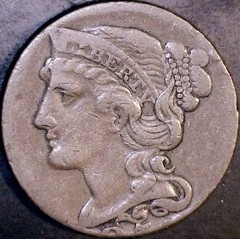
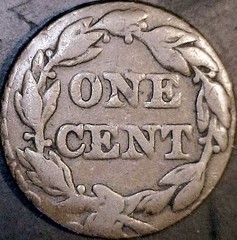
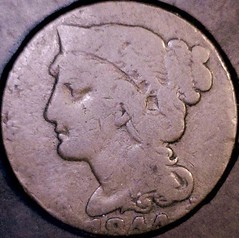
Here's a contemporary newspaper article about the Copperhead
badge ...
Wednesday, March 18, 1863
The young Democrats of Syracuse have adopted a Copperhead
badge. It is made by procuring one of the large United States copper cents, and neatly removing the head of the Goddess of Liberty.
To this is affixed a pin, which fastens to the lapel of the coat, or any other conspicuous place on the wearer where he chooses to display it.
To read the earlier E-Sylum articles, see:
QUERY: OCTAGONAL LARGE CENT INFORMATION SOUGHT
(https://www.coinbooks.org/v22/esylum_v22n38a09.html)
COPPERHEAD TOKENS OF THE CIVIL WAR
(https://www.coinbooks.org/v22/esylum_v22n39a13.html)
WAYNE'S NUMISMATIC DIARY: FEBRUARY 26, 2023, PART 1 : Cut Down Large Cents
(https://www.coinbooks.org/v26/esylum_v26n09a28.html)
Another Cut Down Large Cent
(https://www.coinbooks.org/v26/esylum_v26n10a07.html)
NOTES FROM E-SYLUM READERS: MARCH 12, 2023
Kay Edgerton Lenker's Clain-Stefanelli Award
Ken Spindler passed along photos of Kay Lenker's Elvira Clain-Stefanelli medal and award plaque. Thank you. Well deserved. She will be missed. -Editor
To read the earlier E-Sylum article, see:
Remembering Kay Edgerton Lenker
(https://www.coinbooks.org/v26/esylum_v26n10a07.html)
Overdated U.S. Mint Bags
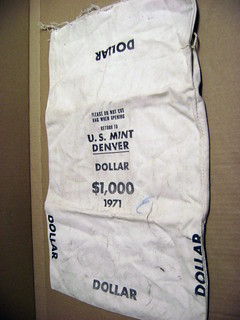 "Continuing on your recent items on collecting US Mint Bags, here's an interesting twist. We collect overdate coins, so why not overdate mint bags? Apparently they exist. Here's a Philadelphia Mint bag, originally dated 1918 but overdated to 1950! One wonders the story behind this long date gap.
"Continuing on your recent items on collecting US Mint Bags, here's an interesting twist. We collect overdate coins, so why not overdate mint bags? Apparently they exist. Here's a Philadelphia Mint bag, originally dated 1918 but overdated to 1950! One wonders the story behind this long date gap.
"Regarding dollar bags, here's a Denver Mint bag for 1971 Ike dollars."
Interesting! Thanks! -Editor
To read the earlier E-Sylum articles, see:
COLLECTING AND CATALOGING U.S. MINT BAGS
(https://www.coinbooks.org/v26/esylum_v26n07a30.html)
AN ESSAY ON COIN BAGS
(https://www.coinbooks.org/v26/esylum_v26n08a14.html)
COIN BAGS OF THE WORLD
(https://www.coinbooks.org/v26/esylum_v26n09a11.html)
Dutch Language Skills
Jeff Zarit writes:
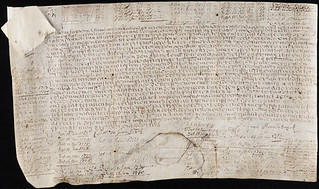 "The story on the Dutch bond is just AMAZING. To think that a government (or anyone) would honor a bond nearly 400 years old is just really neat. But I guess, I am not surprised, the people of the Netherlands have always been accountable to the past. Walking around any city, one encounters intelligent, friendly people. I remember standing on a train platform in the city of Utrecht, some 20-30 years ago. The stations have train schedules pertaining to that location. It was easy to follow, but I was there on a Saturday. Someone else was viewing the schedule, so I said (in English), pardon me sir, but what does this footnote at the bottom of the schedule mean ?
"The story on the Dutch bond is just AMAZING. To think that a government (or anyone) would honor a bond nearly 400 years old is just really neat. But I guess, I am not surprised, the people of the Netherlands have always been accountable to the past. Walking around any city, one encounters intelligent, friendly people. I remember standing on a train platform in the city of Utrecht, some 20-30 years ago. The stations have train schedules pertaining to that location. It was easy to follow, but I was there on a Saturday. Someone else was viewing the schedule, so I said (in English), pardon me sir, but what does this footnote at the bottom of the schedule mean ?
"I did not ask if he spoke English, I just asked like I was still in the US, and he responded, SURE, WHAT DO YOU NEED TO KNOW? In English. I never forgot that situation. I once asked about languages and was told that the Dutch spoke English as they did business with the English; and French & German for the same reasons and their proximately to France & Germany. And for other reasons, their history and their prolific types of money, I have always liked them."
To read the earlier E-Sylum article, see:
1648 PERPETUAL DUTCH BOND STILL PAYS INTEREST
(https://www.coinbooks.org/v26/esylum_v26n10a27.html)
Fond Recollection of Glenn Smedley
Sheldon Banoff of
Deerfield, IL writes:
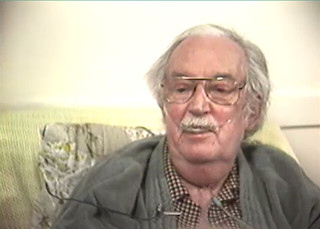 "You highlighted an interview with Glenn Smedley in your March 5 E-Sylum. I wanted to share with your readers this note about Glenn's generosity with his knowledge and time that he gave to some budding young numismatists. In 1965 as a junior in high school I co-founded the Sullivan High School Coin Club, located on Chicago's far north side about 1/2 mile west of Loyola University (Chicago). I knew Glenn from the Chicago Coin Club and I believe from the Roosevelt University Numismatics course that I attended (and which you covered in a prior E-Sylum issue).
"You highlighted an interview with Glenn Smedley in your March 5 E-Sylum. I wanted to share with your readers this note about Glenn's generosity with his knowledge and time that he gave to some budding young numismatists. In 1965 as a junior in high school I co-founded the Sullivan High School Coin Club, located on Chicago's far north side about 1/2 mile west of Loyola University (Chicago). I knew Glenn from the Chicago Coin Club and I believe from the Roosevelt University Numismatics course that I attended (and which you covered in a prior E-Sylum issue).
"In 1966 I asked Glenn if he would come speak to the 15 or so members of our fledgling High School Coin Club. (I recollect he chuckled when I told him our faculty sponsor was Mrs. Nickel, the history teacher who wasn't a coin collector but who we selected because she had a memorable name!) Needless to say, he kindly came out and spoke to us - on HIS own nickel - and answered our neophyte questions. The Sullivan High School Coin Club is long gone, but this (now not-so-young) collector has never forgotten Glenn's encouragement to young collectors."
To read the earlier E-Sylum article, see:
VIDEO: GLENN SMEDLEY
(https://www.coinbooks.org/v26/esylum_v26n10a05.html)
Cord Wood Thoughts
George Cuhaj writes:
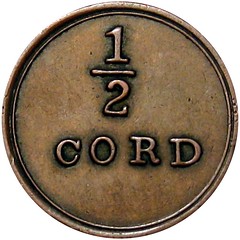 "Cord Wood, exciting stuff.
Firstly, great tokens that Steve is listing.
Fun specialized area.
"Cord Wood, exciting stuff.
Firstly, great tokens that Steve is listing.
Fun specialized area.
"The traditional cord of wood was a well stacked pile 4 feet high, 4 feet deep and 8 feet wide. That is a whole bunch of wood. Most folks who burn wood and have to buy it do it as "face cords" 4 feet high, 8 feet long and 16 inches deep. Which is a safe amount to transport in the back of a standard pick-up truck.
"If one is buying wood, hard woods cost more than soft woods. Nearly all wood needs to be dry and aged a year after cutting.
"That is what 28 winters in Central Wisconsin has taught me."
To read the earlier E-Sylum article, see:
NUMISMATIC NUGGETS: MARCH 5, 2023 : Railroad Cord Wood Token
(https://www.coinbooks.org/v26/esylum_v26n10a19.html)
Vintage 1920's Minting Film
Kavan Ratnatunga passed along this video of subtitled old silent footage showing the coin making process. The origin of the film isn't stated, although someone in the comments writes, "This film is actually from 1920. The full length version shows dies for a 1920 Canadian large cent, the last year large cents were made in Canada" and "... this was shot at the Royal Canadian Mint in Ottawa." Another commenter says, "The video shows 1920 Canadian Quarters being minted. Near the end you get a glimpse of the reverse."
Can anyone identify the film for us? Is a full version available elsewhere online? -Editor
To watch the video, see:
How Coins Were Minted a Century Ago
(https://www.youtube.com/watch?v=Ef8FdPJ5aVw)
Wanted: Robert Reford Collection Catalogue
Darryl Atchison writes:
"I am desperately looking to get my hands on a Parke-Bernet Americana sale catalogue from May 7th, 1968 for some research on one of the consignors - Robert Reford Jr. If anyone has a copy available to purchase can they please let me know at atchisondf@gmail.com."
Can anyone help? -Editor
Query: Prof. Jackson's Free Advice
"Could any reader suggest what the private advice was that Professor Jackson of Pavement, a street in York, offered free of charge on Saturdays, as advertised on this unofficial farthing? I can find no reference to him but there was a draper called Jackson at Pavement.
"I wondered if it is some personal medical advice. This advertising piece did not say what services he offered, and why would he advertise something that was free?
"PRIVATE ADVICE.PAVEMENT YORK
BY PROF,JACKSON
H.M INDIAN ARMY FROM
10.A.M TO 10.P.M
GRATIS .
SATURDAYS ."
Hmmm. It's odd that no particular product or service is mentioned, but this reminds me of the ubiquitous "Free Estimate" offer in so many advertisements. The "Estimate" is free, but to get it you have to endure a hard-sell pitch for the seller's product or service. New windows or timeshare vacation condo, anyone?
Can anyone fill us in on Prof. Jackson? -Editor
New Commemorative by Banco Central Ecuador
Dale Seppa writes:
"The silver, colored Proof coins are produced by the Fabrica Nacional de Moneda y Timbre — Real Casa de la Moneda at their facilities in Madrid, on behalf of the Banco Central Del Ecuador. Designed by artist Philip Nunez, the obverse of the coin shows the outline of a soccer ball on which the coat of arms of the Republic of Ecuador is super-imposed over in full colour. The text Republica Del Ecuador is placed above the primary design along with the fineness of the coin L. 0.925 placed to the left, and the coins' weight 27 gr. is shown on the right. The denomination UN SUCRE is placed below the design along the edge. The reverse side features the logo of the World Cup, which is shown in full colour and centred. The commemorative text Copa Mundial de la FIFA 2022 (World Cup of FIFA 2022
), which is placed above the primary design along with the additional text IV PARTICIPACION DEL ECUADOR (4th Participation of Ecuador
), is placed below the World Cup logo. Mintage is limited but I am not aware of what it is."
Korean National Parks Coins
Mark Lovmo submitted this information on the new Korean National Parks coins. Thanks. -Editor
"Since 2017, the Bank of Korea has released six 3-coin issues in the National Parks series. This is Issue 7, featuring obverse scenes from Seoraksan, Chiaksan, and Wolchulsan national parks, and reverse images of the flagship species
of fauna and flora found in each of those national parks.
"Each Korean national park has officially designated an animal and a plant as a flagship species whose ecological significance and need for protection have been recognized.
"There will be 10,000 commemorative coins of each type issued, for a total of 30,000. Of this mintage, 6,000 coins will be sold as single coins (2,000 per coin type) while the remaining 24,000 coins will be sold in three-coin sets (8,000 per each type).
"Issue date is February 9, 2023."
Thank you - nice coins. -Editor
DAVID LANGE'S NUMISMATIC LEGACY
Jeff Burke submitted this article on the late Dave Lange. Thank you. -Editor
Remembering David W. Lange's Numismatic Legacy
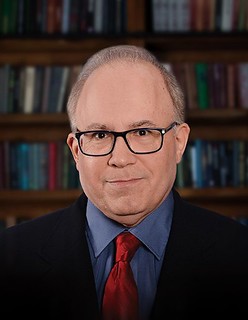 David Lange was a longtime ANA Summer Seminar instructor. I first met Lange at the 2011
Summer Seminar one day at breakfast, and enjoyed a number of conversations over meals with
him as the week progressed. I was intrigued to learn that he had worked as a design drafter for
Pacific Gas and Electric Company for fourteen years before being hired at NGC. I also liked
hearing about how much pleasure he took in assembling circulated coins from the Indian Head
cent, Lincoln cent, Buffalo nickel, Mercury dime, and Liberty Walking half dollar series to have
a coin collection like the one that he had in childhood.
David Lange was a longtime ANA Summer Seminar instructor. I first met Lange at the 2011
Summer Seminar one day at breakfast, and enjoyed a number of conversations over meals with
him as the week progressed. I was intrigued to learn that he had worked as a design drafter for
Pacific Gas and Electric Company for fourteen years before being hired at NGC. I also liked
hearing about how much pleasure he took in assembling circulated coins from the Indian Head
cent, Lincoln cent, Buffalo nickel, Mercury dime, and Liberty Walking half dollar series to have
a coin collection like the one that he had in childhood.
It was quite a thrill to talk with David about some of his books I had read, including his History of the United States Mint and Its Coinage, The Complete Guide to Lincoln Cents, The Complete Guide to Buffalo Nickels, and The Complete Guide to Mercury Dimes! Lange's books were of tremendous help to me in selecting key date coins to purchase in these series, and my copies of them are filled with underlined sections and notations.
Fast forward to twelve years later. Our January 16, 2023 New Jersey Numismatic Society (NJNS) meeting at Library of the Chathams began with a sad note when Dr. Michael Fey told us that David Lange had passed away earlier that day. Michael and David had become friends when David moved from California to New Jersey in 1994, to start a position as Director of Research at NGC. David helped Michael develop a passion for collecting Philippine coins. Lange joined the NJNS in 1995, serving as the organization's Secretary from 1997 to 2000 and President in 2000 to 2001. Lange received the Charles F. Nettleship Award for Service to the NJNS in 2001. He relocated to Florida in 2004 when NGC moved to Sarasota.
Recently, from October 2021 to July 2022, David had joined our NJNS monthly meetings by
Zoom and relished showing us his latest U.S. type coin acquisitions during show-and-tell. Lange
was having so much fun and expressed tremendous satisfaction in being able to acquire high
grade U.S. type pieces, mint state U.K. selections, and coins that he always coveted during
childhood! David gave intriguing presentations on The Similarities and Differences of U.S. and
U.K. Coinage
at our October 2021 meeting and The Case for Variety Attribution in Certified
Grading
at our November 2021 gathering. Lange also gave us updates on his passion for coin
board collecting. Fortunately, I had also read his Coin Collecting Boards of the 1930s & 1940s,
so I was familiar with the lingo of that numismatic specialty.
I remember David Lange as a kind, thoughtful, humble, and brilliant numismatic researcher, writer, and author. He had a rare ability to share his passions for coins and coin boards in a straightforward, infectious way that enabled numismatists to delight in learning more about our hobby. He will be missed.
To read earlier E-Sylum articles, see:
DAVID W. LANGE (1958-2023)
(https://www.coinbooks.org/v26/esylum_v26n04a04.html)
DAVID W. LANGE – RECOLLECTIONS
(https://www.coinbooks.org/v26/esylum_v26n04a12.html)
RICHARD BEALE OF ROMA NUMISMATICS ARRESTED
The other shoe has dropped in the case of two rare ancient coins sold at auction in 2020. It has been reported that the owner of Roma Numismatics Limited, Richard Beale, was arrested in January over falsified records of ownership for the two coins. -Editor
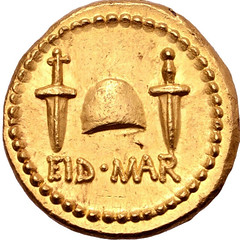 Richard Beale, the director of a London-based auction house, was arrested in New York City in January on charges relating to his sale of multi-million dollar ancient coins. His arrest has not been previously reported.
Richard Beale, the director of a London-based auction house, was arrested in New York City in January on charges relating to his sale of multi-million dollar ancient coins. His arrest has not been previously reported.
Beale is the owner and managing director of Roma Numismatics Limited, which claims to be one of the world's foremost auction houses for rare and collectible coins,
according to its website.
Alongside Italo Vecchi, an Italian coin dealer who works at Roma Numismatics as a consultant specialist, Beale allegedly falsified the record of ownership for two coins which sold at auction in 2020, according to a complaint filed in New York criminal court. Vecchi and Beale could not be reached for comment.
Between 2013 and 2014, Vecchi allegedly sold two rare coins to Beale without provenance. One of these is known as an Eid Mar
coin, referring to an ancient Roman gold coin minted in 42 B.C. to celebrate the assassination of Julius Caesar on March 15 of 44 B.C., commonly referred to as the Ides of March. The other item, referred to as the Sicily Naxos
coin, was created in 430 B.C. in the Greek colony of Naxos on Sicily, and is one of the rarest and most prized ancient coins in the world,
according to the complaint.
Beale allegedly paid for false ownership history documents for both coins, which stated the pieces came from the collection of the Baron Dominique de Chambrier.
Both coins were listed with this provenance in auctions which took place in October and November 2020 in London. The Eid Mar coin sold for £3.2 million ($4.1 million), the highest price ever paid for an ancient coin at auction, while the Sicily Naxos coin sold for £240,000 ($291,000).
On two separate occasions in 2020, the Eid Mar coin, which is thought to have originated from Greece, was shipped to the U.S. and listed as originating from either Turkey or Italy on U.S. customs paperwork. Meanwhile, the Sicily Naxos coin comes from Italy, according to the criminal complaint. Beale and Vecchi deceived potential buyers by creating false provenance for the Eid Mar Coin and the Sicily Naxos Coin so that both coins would be viewed as legitimate and ascribed a certain value,
reads the complaint.
The auction house director is additionally accused of purchasing five other coins from a convicted antiquity trafficker which were looted from the Gaza Strip in 2017, which he allegedly sold through Roma Numismatics with falsified provenance. Beale, who arrested on Jan. 10, is charged with grand larceny, criminal possession of stolen property, conspiracy and scheme to defraud. His next scheduled court appearance is in May.
In February, the Sicily Naxos coin was returned to Italy by the Manhattan District Attorney's Office alongside a number of other antiquities collectively valued at nearly $2.5 million.
To read the complete article, see:
Exclusive: UK Auction House Director Arrested for $4.1 Million Roman Coin Fraud
(https://observer.com/2023/03/exclusive-uk-auction-house-director-arrested-for-4-1-million-roman-coin-fraud/)
To read the earlier E-Sylum article, see:
LOOSE CHANGE: FEBRUARY 19, 2023 : Sicily Naxos Coin Repatriated to Italy
(https://www.coinbooks.org/v26/esylum_v26n08a31.html)
Art News has an article on the story, too. -Editor
The scheme appeared to be years in the making. Previously a member of the British Army, the 40-something-year-old Beale made a sudden entrance into the small world of coins dealers in London in 2009.
He was like a bolt of lightning,
Christopher Martin, the Chairman of the British Numismatic Trade Association, told ARTnews. He appeared and made his mark in the market that he wasn't brought up in. Within a year, he was selling coins worth millions of pounds. That doesn't happen, but that's what happened with him. Where did he come from? Nobody really knew.
At that time, Beale seemingly overnight built up a modern coin auction house with glossy catalogues and modern photography. Unlike his colleagues, he hadn't come up in the business by way of family, nor had he gotten into the business as a young man, slowly but surely building a reputation as an expert, explained Martin. Other dealers watched in awe as he began trading coins in the millions, seemingly with no experience in the area. Somehow, he had access to highly valuable coins.
To read the complete article, see:
One of the World's Most Expensive Coins Was Sold Using Fake Provenance and the Seller Has Been Arrested
(https://www.artnews.com/art-news/news/worlds-most-expensive-coin-fake-provenance-roman-eid-mar-1234659762/)
VOCABULARY TERMS: MISSING LETTERS AND MORE
Here's another collection of short entries from Dick Johnson's Encyclopedia of Coin and Medal Terminology. -Editor
Missing Letters. The obliteration of letters or other detail during a long press run. There are two causes: a filled die, or heavy die polishing. Loose particles, scrap debris or metal lodged in a die cavity precluding the letter or detail from being fully struck up; in time the letter or detail disappears completely once filled. Also, dies are polished to remove some imperfection, as clash marks, and detail is removed by die retooling. Thus letters, figures, mintmarks, monograms and small portions of the design have been known to disappear on struck pieces. See filled die.
To read the complete entry on the Newman Numismatic Portal, see:
Missing Letters
(https://nnp.wustl.edu/library/dictionarydetail/516339)
Misspelling. An error of spelling in the original model or die, not caught by the editor, and appearing on the issued piece. A prize example is an 1840 medal by engraver William Henry Bridgens (with an obvious lack of education) placed the head and name of seven presidents around one of George Washington for his Eight Presidents Medal. He misspelled Madison as MADDISON and Monroe as MUNROE! In numismatic cataloging this is called blundered inscription or blundered legend and should be noted by the alert cataloger wherever found. See also errors.
To read the complete entry on the Newman Numismatic Portal, see:
Misspelling
(https://nnp.wustl.edu/library/dictionarydetail/516340)
Mis-struck. A medal or coin made from a broken, damaged, impaired or misaligned die, from a defective or improperly positioned blank, or an incorrectly struck piece. A wide variety of striking flaws can occur (distinct from planchet flaws, errors in the die, and finishing flaws). Striking flaws include: die trial, misaligned die, double and multiple strikes, collar errors (clashed collar, missing collar, broken collar), brockage, cupping, indented and impressed errors, off center strikes, filled die, rotated die, and incorrect mating of obverse and reverse dies (muling). Correct striking is the responsibility of the pressman and the pressroom foreman, any mis-struck pieces should be caught by inspection (but, obviously, mis-struck pieces slip by inspectors). See errors, inspection.
To read the complete entry on the Newman Numismatic Portal, see:
Mis-struck
(https://nnp.wustl.edu/library/dictionarydetail/516341)
ARABELLA HUNTINGTON (1850-1924)
Archer M. Huntington was a major benefactor of the American Numismatic Society in New York, and served as its President from 1905 to 1910. E-Sylum Feature Writer and American Numismatic Biographies author Pete Smith submitted this background article illustrating Huntington's family and wealth. Thanks. -Editor
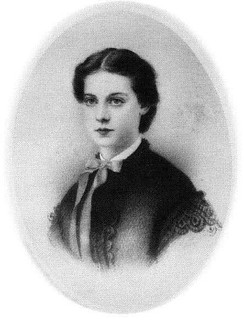 Something different this week. I am not going to write about the numismatic accomplishments of
Archer Milton Huntington. Rather I am going to write about his mother.
Something different this week. I am not going to write about the numismatic accomplishments of
Archer Milton Huntington. Rather I am going to write about his mother.
Let's start with the birth of Arabella Duval Yarrington. She gave her birthdate as June 1, 1850, but there is reason to doubt. The 1850 Census was recorded in Richmond, Virginia, in December of 1850. In that Census, Richard Milton Yarrington (1807-1859), a machinist, was married to Catherine James Sims Yarrington (1819-1888). Among their children was Catherine, age 5/12 years, born in Virginia, which would correspond with her birth in June of 1850. How Catherine became Arabella is one piece in the larger puzzle of her life.
Richard Yarrington died in 1859, leaving Catherine to raise five children as the Civil War was about to threaten Richmond. She opened a boarding house at Shockoe Bottom in the flood plain near the canal in Richmond. This was the entertainment district that included taverns, gambling parlors and brothels.
In the 1860 Census, she is listed as C. J. Yarrington, living with five children including Carolina B, then age nine. For the 1870 census, there is a listing for Kate Yarrington living with five children. Among them is Bella, then age 19, born in New York. Also living with the family is John, age one. More about him later.
There is a second 1870 Census listing that adds more pieces to the puzzle. C. J. Yarrington is the head of the household, followed by her daughters Eliza and Emma. Then comes Bell Demerson, age 19, born in Virginia, followed by John Demerson, age 45, and later John D. E. Mersion, age three months. John would have been conceived when Belle was 18.
Census records frequently include spelling errors. The M
in Mersion may also have been a
W making the name Wersion. Errors also occur with misinterpretation of pronunciation.
The 45-year-old John Demerson has also been identified as John Worsham who owned a faro parlor near the Yarrington boarding house in Richmond. After the war in 1869, he moved to New York City to run a faro parlor there.
Belle Yarrington claimed to be married to John Archer Worsham (1821-1878). She called her young son Archer Milton Worsham. Archer and Milton were both family names. Belle claimed that her husband died after a year of marriage leaving her a widow with a young son. Actually, John Worsham returned to Richmond, his gambling parlor there and his wife Annette. He died in 1878.
What would become of the widow Catherine Yarrington and her widowed daughter Belle? They found a benefactor in Collis Potter Huntington (1821-1900). They probably met when Huntington was enjoying the gambling district in Richmond while building the Chesapeake and Ohio Railroad there. Arabella would have been 18 and Collis would have been 48.
Biographers speculate that Collis Huntington, a married man, provided a house for Worsham and the Yarrington clan in New York as a cover for his affair with Arabella. Apparently, such things happened in those days.
Collis had humble beginnings in a place known as Poverty Hollow. He opened a store in New York and built his fortune in the gold fields of California. Collis and partner Mark Hopkins were not miners but sold necessary supplies to the miners. They had the resources and opportunity to go into business as partners in the Central Pacific Railroad building east from Sacramento.
Catherine, Arabella and remainders of the Yarrington family moved into a house on Lexington Avenue in New York. Collis was a tough and frugal businessman not noted for charity. He did, however, give lavishly to the Yarringtons. With financing from Huntington, Catherine began to buy up additional properties with some of those deeded over to Arabella.
One of the properties was off Fifth Avenue at 4 West 54th Street. Arabella studied art and interior design. She had the house renovated and expanded including a lavish Moorish boudoir. Would you like to visit her bedroom? You can see it now in a Virginia museum. I visited the New York site in 1984 as part of the Museum of Modern Art.
Elizabeth Stoddard Huntington (1823-1883), the wife of Collis, was ailing in her later years. Reports indicate that Catherine and Arabella helped to care for her while they waited for her to die.
On July 15 1884, Arabella, then 34, married Collis Huntington, then 64, in a parlor at 4 West 54th. Conducting the wedding was Reverend Henry Ward Beecher. They may have married twice. The first was a secret ceremony shortly after the death of Elizabeth. The second after a suitable period of mourning. Arabella traded the house to John D. Rockefeller for building lots on 5th Avenue at 72nd street. Collis adopted Archer Milton Huntington, then 14. His paternity had never been proven.
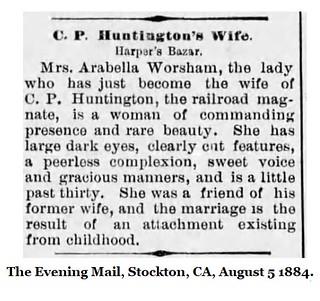 I enjoyed the newspaper report that stated,
I enjoyed the newspaper report that stated, the marriage is the result of an attachment existing
from childhood.
Was that an 1884 euphemism for having a child together?
Collis Huntington died in 1900 and his $150 million estate was divided equally among Arabella, Archer, and a nephew, Henry Edwards Huntington (1850-1927). Biographers claim the inheritance made her the richest woman in America. Like so much else about Arabella, that is probably untrue. In July of 1913, Henry and Arabella married, reconnecting the family fortune. Henry was also an art collector and book collector.
Although they were both born in 1850, in the 1920 Census, Arabella is listed as age 59 with her husband age 69. Her place of birth was listed as Alabama.
In 1921, Arabella sailed from Cherbourg to New York on the Aquitania. She stated that she had been born in Mobile, Alabama, on February 9, 1851. No birth certificate had been found. She worked hard to conceal the facts of her early life.
Arabella died on September 16, 1924, and she is buried next to Henry at the Huntington Library
and Botanical Gardens Mausoleum at San Marino, California. Part of her inscription reads
BORN AT UNION SPRINGS ALABAMA JUNE FIRST EIGHTEEN HUNDRED AND
FIFTY.
The date may be correct, but the location is not.
Archer donated much of her art collection to the Metropolitan Museum of Art. Other parts were
sold at auction. The auction listing stated, This important collection long in the possession of a
noted American family of art collectors sold to effect a partition among heirs.
Henry was a
strong buyer at the sale.
The Worsham / Rockefeller bedroom was given to the Museum of the City of New York. Since 2010, it has been on display at the Virginia Museum of Fine Arts at Richmond.
Who was the most wealthy woman of the Gilded Age? That title is often given to Hetty Green who was worth more than $100 million when she died in 1913. There is probably a numismatic connection to her somewhere. A novel by Shana Abe is titled, An American Beauty: A Novel of the Gilded Age Inspired by the True Story of Arabella Huntington Who Became the Richest Woman in the Country. She got the title, not by surpassing Hetty Green, but by outliving her.
ATLAS NUMISMATICS MARCH 2023 UPDATE
Atlas Numismatics has updated their website with 460 new coins, medals, and tokens at fixed prices. Selections include the following items. Great coins and medals! -Editor
Atlas Numismatics Publishes their Newest Fixed-Price List
Pedigreed Dilitron (2 Litrai) of Acragas
1073129 | GREEK. SICILY. Acragas (Agrigentum/Akragas). Struck circa 410-406 BC. Silanos AV Dilitron. NGC Ch. MS (Choice Mint State) Strike 5/5 Surface 5/5. 1.34gm. AKRA. Eagle right perched on rocks, clutches a serpent / SI?A/ SOA (retrograde). Crab (Cancer). Rizzo Table. III, 8 (this coin); Westermark, Akragas 1015.4 (this coin).
Superb and exceptional.
Ex Pennisi di Floristella (noted on insert); Ex. Moretti Collexction; Ex- NAC 10, Zürich
1997, Lot 96. Rizzo (Monete Greche della Sicilia, Rome, 1946) plate coin.
$49,500
To read the complete item description, see:
https://atlasnumismatics.com/1073129/
Mint State Claudius Aureus
1073824 | ROMAN REPUBLICAN. Claudius. (Emperor, 41-54 AD). Struck 41-42 AD. AV Aureus. NGC MS? (Mint State ?) Strike 5/5 Surface 4/5. Rome. 7.72gm. TI CLAVD CAESAR AVG GERM P M TR P. Laureate head, right / EX S C/ OB CIVES/ SERVATOS. Legend on three lines within oak wreath (Corona Civica). BMC 16; Calicó 356 (this example plated); Cohen 34; RIC-15.
Struck from the same dies as another exceptional example in an identical grade (Heritage World Coin Auctions, Dallas Signature Sale 3091, 6 May 2021, Lot 31039). Superb surfaces and portrait, highly lustrous.
Ex Numismatic Fine Arts Auction 27 (New York, 1991) Lot 101.
$165,000
To read the complete item description, see:
https://atlasnumismatics.com/1073824/
Beautifully Toned Münster Medal
1071791 | GERMAN STATES. Münster. 1648 AR. PCGS MS62. 58mm. 36.15gm. PX/ HISBANO • BATAVIA. Pax radiant with cornucopia sitting in sun chariot pulled by crowned lions with scepter representing Spain and a bundle of arrows representing the Netherlands /Nine-line inscription; date below in Roman numerals. Goppel-680; Pax-96.
Medallic issue struck to commemorate the Peace of Westphalia in 1648.
$3,450
To read the complete item description, see:
https://atlasnumismatics.com/1071791/
Charles II Five Guineas
1073734 | GREAT BRITAIN. England. Charles II. (King, 1660-1714). 1670 AV Five Guineas. NGC AU53. Edge: VICESIMO SECVNDO. Laureate bust of Charles II right, pointed truncation / Crowned cruciform arms with scepters in angles, date divided at top. KM 430.1; SCBC-3328; Fr.-281.
Ex Glendining & Co. Ltd (London), 8 July 1970, Lot 8. Includes old auction ticket.
$5,750
To read the complete item description, see:
https://atlasnumismatics.com/1073734/
Copper Capture of Bouchain Medal
1071788 | GREAT BRITAIN. Anne. (Queen, 1702-1714). 1711 CU Medal. PCGS SP64BN (Brown). By J. Croker and S. Bull. Edge: Plain. 45mm. 42.5gm. ANNA · AVGVSTA ·. Laureate, draped, and mantled bust left / HOSTES · AD · DEDITIONEM · COACTI ·. French soldier kneeling right, surrendering sword, musket, and mural crown to female figure seated left upon globe, holding spear and oval shield inscribed FOR-/TVNA/MA-/NENS; military instruments around; fortifications of Bouchain in background; in three lines in exergue, VALLO · GALLORVM · SVPERATO ·/ET · BVCHEMIO · CAPTO ·/MDCCXI ·. Eimer 450; MI 385/237.
French lines passed; Capture of Bouchain.
$895
To read the complete item description, see:
https://atlasnumismatics.com/1071788/
Cameo 1839 Proof Groat
1071777 | GREAT BRITAIN. Victoria. (Queen, 1837-1901). 1839 AR Fourpence, Groat. NGC PR66 Cameo. By W. Wyon. Edge: Plain. VICTORIA D:G: BRITANNIAR REGINA F:D:. Head left / Britannia seated right. KM 731.2. Proof; SCBC-3913; ESC-3325 (Prev. ESC-1933A).
Struck in coin alignment.
$2,650
To read the complete item description, see:
https://atlasnumismatics.com/1071777/
Superbly Toned Veiled Head Halfcrown of Victoria
1073709 | GREAT BRITAIN. Victoria. (Queen, 1837-1901). 1901 AR Halfcrown. PCGS MS64. Edge: Reeded. Mature draped bust left / FID · DEF · IND · IMP · around top, HALF date CROWN below. Crowned and quartered spade shield within wreath. KM 782; SCBC-3938; ESC-2787 (Bull); Prev. ESC-735.
Superbly toned.
$595
To read the complete item description, see:
https://atlasnumismatics.com/1073709/
Medallic Double Thaler of Overyssel
1072107 | NETHERLANDS. Overyssel. Prince Mauritz Victory. (1597) ND AR Medallic Double Thaler (Landdagspenning). PCGS MS62. Edge: Plain. 56.76mm. 53.96gm. LIBERTATEM NEMO BONV NISI CVM ANIMA SIMVL AMISIT. Armored knight wearing plumed helmet, drawn sword in right hand on horse leaping right over a cityscape /ORDINVM TRANSISSVLANIAE INSIGNIAE . The coats of arms of the province of Overijssel and the cities of Deventer, Kampen and Zwolle at center surrounded by coats of arms of the 17 members of the Overijssel Council. cf. van Loon I, S. 494, 3.
Struck to commemorate the province's secession from Spanish rule.
$6,750
To read the complete item description, see:
https://atlasnumismatics.com/1072107/
Updates to their online inventory are issued monthly. For more information and to sign up for the firm's monthly newsletter, visit: atlasnumismatics.com
SYDNEY F. MARTIN COLLECTION PART III
In a Stack's Bowers blog article, John Kraljevich summarizes part III of the Syd Martin Collection, The Middle Colonies Sale.
-Editor
THE MIDDLE COLONIES SALE
1788 Connecticut Coppers • New York & Related Coinages • Immune Columbia, Confederatio & Related Issues
Maryland Coinages • Virginia & Related Coinages • Elephant Tokens, American Plantations Tokens, & c.
Welcome to the third chapter of our offering of the Syd Martin Collection. We've gathered together a seemingly disparate group of early American numismatic items and titled this The Middle Colonies Sale.
The offerings, historically and economically, may be more connected than they would seem at first blush.
New York City has been the economic and cultural powerhouse of the Northeast for centuries (though the Philadelphia area, environs both Syd and I have called home, is clearly superior when it comes to professional sports). From the orbit of New York we have gathered numismatic items from three different centuries. The Dutch Lion dollars (and the half fraction) cover the first two centuries, a harkening to New York's Dutch heritage that remained apparent in colonial pockets well into the 18th century. The important 1709 4 Lyon Dollars note serves as a bridge from that heritage to colonial New York, as does the enigmatic late 17th century New Yorke in America token, an English-language piece that was probably struck in the Low Countries.
As New York boomed after the departure of the English at the end of the American Revolution, its importance as a financial center took hold. The regulated gold coins Syd collected, led by a very important Portuguese half Joe regulated by Ephraim Brasher, show how central New York was to the import/export trade that brought immense wealth to the city. At the end of the 1780s, New York passed on making its own coins — though the patterns and related issues are all included here — but there was plenty of coin-making going on nearby. Up the Hudson, Capt. Thomas Machin was making counterfeits in Newburgh. And in nearby New Haven (and Machin's Mills too!), 1788-dated Connecticuts would give Syd a series to pour his passion and expertise into. This is one of the finest and most complete offerings of 1788 Connecticut coppers ever auctioned, paired with some of the finest cataloging ever done on the series by our house expert Kevin Vinton.
From upstate New York come two issues that couldn't be more different, though Syd found them each appealing in their own way. The Albany Church Pennies are simple: two varieties, overstruck on low weight halfpence, produced by the First Presbyterian Church in Albany after the Copper Panic of 1789. Syd got both varieties, and to increase the challenge, added contemporary communion tokens from two other Presbyterian churches, one in New York and the other in Charleston. The Castorland medals are very complex. Inspired by a colonization effort during the French Revolution, the die states tell the whole story of this coinage over the course of decades. Syd delved right in.
Other tokens from the New York area are also included, including a very impressive run of Talbot, Allum, and Lee cents by variety, several varieties of Mott tokens, and the ca. 1785 Bar copper, which was introduced to the New York area just after Revolution.
In the Chesapeake region, Maryland and Virginia were more alike than not economically. Tobacco made both colonies viable (unpaid enslaved labor to harvest that tobacco helped), and through the 18th century they saw similar coins, similar markets, and similar economic interests evolve. Virginia's tobacco economy started in Jamestown, the short-lived settlement that served as the colony's capital from the time of its founding in 1607. Just two years later, a group of colonists on their way to Jamestown from England were blown off course in a storm and landed on what became a new English colony: Bermuda. The 1616 Hogge Money issues were struck just a year after the Virginia Company ceded control of Bermuda to the newly founded Bermuda Company, and the two colonies continued a deep interrelation for most of the 17th century. The Sommer Islands pieces included here are American colonial classics, and Syd found important specimens to include in his cabinet.
In Maryland, Lord Baltimore's coinage took hold in 1659 and the years that followed, and Syd's collection is one of the best anyone has ever assembled. More than a century later, after St. Mary's City yielded to Annapolis as the state capital, the Federal government took its seat in Annapolis's State House for a time — the same time that silversmith John Chalmers got busy striking silver coins for local circulation. Syd's Chalmers collection is led by the legendary Rings Shilling, one of the most important types in the entire canon of American numismatics.
The peculiarities of Virginia halfpence lent themselves well to Syd's brand of expertise. Few people attribute them when they sell; Syd was happy to. Few people collect them by variety; Syd did, gathering 27 varieties and the very rare shilling. Among paper money issues, he also acquired the finest known 1775 pistareen note, an important type that recognized the vital role that Spanish mainland 2 reales (and their cut fractions) played in the Chesapeake economy.
Looking west to Kentucky, the Myddelton tokens have a lot in common with the Castorland medals: a colonization scheme that went nowhere, a foreign mint, and beautiful medal-like coins by legendary artists that have been avidly sought for centuries. Syd built out his Myddelton tokens with related mulings from the Copper Company of Upper Canada, as many collectors did before him.
The Carolinas can claim no native coinage, despite their ancient and interesting history in colonial times. But the Carolina Elephant tokens stand in nicely. Syd augmented his Carolina Elephants with nearly every possible permutation of the related London Elephant tokens, often in superb grade, and managed to acquire one of just three known New England Elephants, only two of which are in private hands.
The American Plantation tokens refer to the South in a general sense, but no one knows where they were actually intended to circulate. In 1688, when they were struck, the Carolinas extended to the border of Spanish settlements in Florida, and the unusual fractional Spanish denomination (1/24 real) makes clear they meant for somewhere close to the Spanish dominions. Syd assembled an advanced collection including all the notable varieties.
This sale is a real smorgasbord, covering a vast time period, a widespread geographical area, from advanced trophy rarities to hard-to-find obscurata. Syd didn't shy away from challenges, and this sale is reflective of that ardor. It's ended up being one of the finest arrays of early American coins ever sold in a single auction.
Enjoy the coins and the history. Syd did a lot of work to bring these coins together, knowing that ultimately they'd be appreciated by someone else someday.
To view all lots in the Martin Collection Part III sale, see:
Spring 2023 Auction - Session 1 - The Sydney F. Martin Collection, Part III - Lots 1001-1268
(https://auctions.stacksbowers.com/auctions/3-11DKWO/spring-2023-auction-session-1-the-sydney-f-martin-collection-part-iii-lots-1001-1268)
To read the complete article, see:
THE MIDDLE COLONIES SALE
(https://stacksbowers.com/the-sydney-f-martin-collection-part-iii-featured-in-spring-2023-expo-auction-monday-march-20-2023-1000-am-pt/)
SYD MARTIN COLLECTION PART III HIGHLIGHTS
Here are a number of highlights from the upcoming Stack's Bowers sale of the Syd Martin Collection, Part III. -Editor
1785 Immune Columbia / Nova Constellatio. W-1985, Breen-1120. Rarity-6+. Silver. Reeded Edge. 13 Stars. VF-20 (PCGS).
Silver Immune Columbias are known with three different edge devices: vertical reeding, diagonal reeding, and no reeding at all. Of the just over a dozen examples known in total, five are vertically reeded (this one, the Norweb coin, the Earle-Jackman-Craige coin, the Newman coin, and the ANS specimen). If this suggests three separate emissions, it's unclear which came first or if any time separated them. The census of this issue, based upon Michael Hodder's work in the Norweb catalog, typically includes the Lauder specimen and a plain edge example in the "Ted Craige estate." The Lauder specimen was withdrawn before the sale in 1983 and disappeared; its authenticity has not been verified. We sold the Craige Estate coins in 2012 and 2013, and it did not include a silver Immune Columbia with plain edge. The Craige Estate collection did include the Earle-Jackman coin, graded PCGS EF Details, Damage, which brought $64,625. That piece had vertical edge reeding and was included on Hodder's Norweb census as coin #9. In recent years, we've sold the Roper plain edge piece (2017, graded EF Details, Graffiti by NGC, $51,700) and the superb Brand-Robison-Archangel coin (2018, graded PCGS AU-55, $102,000).
To read the complete lot description, see:
1785 Immune Columbia / Nova Constellatio. W-1985, Breen-1120. Rarity-6+. Silver. Reeded Edge. 13 Stars. VF-20 (PCGS).
(https://auctions.stacksbowers.com/lots/view/3-11DLLB/1785-immune-columbia-nova-constellatio-w-1985-breen-1120-rarity-6-silver-reeded-edge-13-stars-vf-20-pcgs)
1785 Inimica Tyrannis / Confederatio. W-5630, Breen-1123. Rarity-7. Copper. INIMICA TYRANNIS AMERICA, Large Circle. EF-45 (PCGS).
This is an extreme rarity. The Newman Unc. is far and away the finest known, graded MS-63 BN (NGC) and sold for $352,500 in its November 2014 auction offering. This is undoubtedly the second finest known. There were three additional cited by the Norweb cataloger: Norweb's, Roper's, and Garrett's; none of those are as nice as this one. A piece described as VF, found on a Metropolitan Coin Company fixed price list from 1961, was cited by the Newman cataloger. The piece in the 1910 Mougey sale, lot 1400, appears to be different from all of these and missed on the usual census listings. There are probably seven survivors, but it could be eight. Among these, the pecking order of first and second best is unquestioned.
No design better summarizes the attitude of post-Revolutionary America than this one: America as a native warrior placing a Liberty cap on the Altar of Liberty while crushing the British crown underfoot within a peripheral legend INIMICA TYRANNIS AMERICANA or America, Enemy of Tyrants.
While Taxay attributes authorship of this design concept to Robert Morris, it undoubtedly came instead from Morris' co-author of the tract Taxay cites: Propositions respecting the coinage of gold, silver, and copper. That piece was published in 1785, based on the May 13, 1785 report of the grand committee of the Continental Congress. The primary authors were Morris, who gave voice to his proposal that evolved into the Nova Constellatio patterns, and Thomas Jefferson, who preferred a competing decimal structure that ended up winning out in the long run. Pages 1 through 6 of the report, as published, were signed by Morris. Pages 9 through 12 were noted as including "NOTES on the Establishment of a MONEY MINT, and of a COINAGE for the UNITED STATES. By Mr. Jefferson."
To read the complete lot description, see:
1785 Inimica Tyrannis / Confederatio. W-5630, Breen-1123. Rarity-7. Copper. INIMICA TYRANNIS AMERICA, Large Circle. EF-45 (PCGS).
(https://auctions.stacksbowers.com/lots/view/3-11DLMG/1785-inimica-tyrannis-confederatio-w-5630-breen-1123-rarity-7-copper-inimica-tyrannis-america-large-circle-ef-45-pcgs)
1786 Immunis Columbia Copper. W-5675, Breen-1135. Rarity-8-. Large Eagle Reverse. EF-45 (PCGS).
While the obverse die is different from the one employed in the Maris 3-C copper, this important rarity remains at least New Jersey adjacent. Its obverse device and date link it to the Maris 3 obverse, even if the precise piece of steel that made this wasn't the same as made that. Given its proximity to the New Jersey copper series, it isn't surprising that Dr. Edward Maris announced this variety's discovery after acquiring this precise specimen. As noted in the Ford II catalog: "Maris wrote that he had found the coin in a group of 16 coppers said to have been owned by a Vermont resident whose father had owned them for many years before that. Maris said that among the other coins in the group were three Vermont coppers all of the same variety, a 1787 Immunis Columbia, and a 1786 Immunis Columbia with New Jersey reverse (Maris 3-C)." His announcements of the discovery (July and September 1885 issues of Numisma and the October 1885 American Journal of Numismatics) were followed by a vociferous defense of this coin, a chorus joined by Crosby, Parmelee, Proskey, Frossard, and others.
To read the complete lot description, see:
1786 Immunis Columbia Copper. W-5675, Breen-1135. Rarity-8-. Large Eagle Reverse. EF-45 (PCGS).
(https://auctions.stacksbowers.com/lots/view/3-11DLO3/1786-immunis-columbia-copper-w-5675-breen-1135-rarity-8-large-eagle-reverse-ef-45-pcgs)
1785 Confederatio / 1786 Heraldic Eagle Copper. W-5690, Breen-1131. Rarity-8. Large Circle. VF-30 (PCGS).
112.7 grains. 10 degree die rotation. A fascinating marriage of two mismatched dies, combining a Heraldic Eagle best known for an appearance on an extremely rare New Jersey copper with the CONFEDERATIO reverse of the Inimica Tyrannis Americana copper. Finely granular on both sides, a byproduct of ground exposure that gave this coin's surface a texture without chewing it up. The obverse is light brown with a halo of darker coloration around the eagle. The reverse is a more even sandy brown. The obverse die is aligned to 6 o'clock, where the 1786 date is complete but right at the precipice of the edge. The reverse is aligned upwards, and denticles are visible from 3 to 8 o'clock or so. The sharpness is excellent on both sides, arguably higher than the grade assigned. A few little marks are seen, including an old scrape on the eagle's neck, digs below C and D of CONFEDERATIO, and a couple short scratches within the upper left of the star cluster. Two dull dents are seen on the eagle's shield, the larger of which is close to center in the lower portion of the horizontal lines. The strike is even and solidly brings up even the fine central detail.
Every variety that uses this 1786 Heraldic Eagle die is rare. The same could be said for the 1785 Confederatio die, of course, but the obverse is particularly interesting. It's married to a classic New Jersey reverse, Reverse C, to produce the Maris 5-C New Jersey variety. Only two of those are known, the Stickney-Garrett Uncirculated piece and an unconfirmed low-grade specimen. With neither of those pieces available to Maris (the Stickney coin was considered unique at the time), he illustrated the obverse with a coin owned by Bostonian Lorin Parmelee: this one.
There are only two examples of this rarity known: the present one, with an august provenance, and an example that's been at the American Numismatic Society since 1942. They are similar overall. The ANS example may have a bit more detail, but its surfaces are a bit more granular, and it shows some rim damage.
To read the complete lot description, see:
1785 Confederatio / 1786 Heraldic Eagle Copper. W-5690, Breen-1131. Rarity-8. Large Circle. VF-30 (PCGS).
(https://auctions.stacksbowers.com/lots/view/3-11DLP2/1785-confederatio-1786-heraldic-eagle-copper-w-5690-breen-1131-rarity-8-large-circle-vf-30-pcgs)
1787 New York Excelsior Copper. W-5775, Breen-978. Rarity-7+. New York Arms / Heraldic Eagle Reverse. Eagle Facing Right, Arrows at Left. AU-53 (PCGS).
137.3 grains. 28.7 mm. 170 degree die rotation. A superb example of one of the rarest Excelsior coppers. Choice glossy medium brown with superb surfaces and eye appeal. A natural planchet lamination near 9 o'clock on the EXCELSIOR side is the principal identifying defect, related to a few less significant fissures on that side, including one that descends diagonally through the central arms. The Heraldic Eagle side is aligned to the left, common on this issue, and a tiny planchet clip is noted right of the date (similar to one seen on the Stickney coin). Both sides are exceptionally well detailed, and this distinctive Heraldic Eagle die stands out for both its small date and the arrows in the left claw. Some deeper toning and old harmless verdigris surround the stars and eagle device, and an arc die crack extends from the wing at left through PLUR. Aside from some scattered fissures on the EXCELSIOR side which give the planchet a somewhat crude appearance, this piece is problem free and free of post-striking issues.
To read the complete lot description, see:
1787 New York Excelsior Copper. W-5775, Breen-978. Rarity-7+. New York Arms / Heraldic Eagle Reverse. Eagle Facing Right, Arrows at Left...
(https://auctions.stacksbowers.com/lots/view/3-11DLRE/1787-new-york-excelsior-copper-w-5775-breen-978-rarity-7-new-york-arms-heraldic-eagle-reverse-eagle-facing-right-arrows-at-left)
1787 New York Excelsior Copper. W-5795, Breen-990. Rarity-6+. Standing Indian / New York Arms. VF-30 (PCGS).
180 degree die rotation. A superb example of this distinctive and provocative rarity, using a native American figure to project an image of American liberty with a legend that translates to "born free, I defend freedom." Smooth and glossy medium brown with exceptional eye appeal for the grade. The obverse is somewhat woodgrained, the reverse is a more even shade. The obverse is aligned to 8 o'clock by enough of a margin to show the outside border of the denticles at the upper right obverse, but by a small enough margin to allow the elegant peripheral legends to remain complete. The wear is even, the designs are nicely defined, and marks are few. Just two minor rim bruises at the upper right reverse require mention, though they are largely hidden by the encapsulation.
Struck in the short interval when New York was strongly considering its own copper coinage, this was at least conceived as a pattern. If some small number was coined as extra spending money for the coiners who sought a contract, no one would be surprised; alas, the documents are silent and will likely remain such. Today, it is their design and their rarity that attract collectors primarily, not their interesting but obscure history. This one has been focal to several major cabinets and would be extremely challenging to upgrade.
To read the complete lot description, see:
1787 New York Excelsior Copper. W-5795, Breen-990. Rarity-6+. Standing Indian / New York Arms. VF-30 (PCGS).
(https://auctions.stacksbowers.com/lots/view/3-11DLSZ/1787-new-york-excelsior-copper-w-5795-breen-990-rarity-6-standing-indian-new-york-arms-vf-30-pcgs)
Undated (1659) Maryland Lord Baltimore Shilling. W-1080, Breen-64, Hodder 1-A. AU-53 (PCGS).
69.8 grains. One of the very nicest survivors of this important issue, the first silver coin produced abroad exclusively for American circulation. Well centered and well struck, with attractive deep gray and light gray tones intermingled on lustrous surfaces. Both sides have a good deal of flash that suggests how remarkable these coins must have looked when first struck; alas, PCGS has certified only one Mint State coin, and these are essentially unknown finer than AU. Some trivial localized softness is present at the extreme periphery at 6 o'clock on the obverse and 12 o'clock on the reverse. Denticles frame the rest of the obverse border, while the reverse is slightly aligned to the right and shows denticles only at the left. Minor hairlines are visible under magnification but there are no heavy marks. We note a little scuff under Calvert's nose and a well hidden old scratch in the soft part of the crown a bit right of center.
All of Lord Baltimore's coins are rare today, particularly in high grade, though a small hoard of sixpence has at least made them collectible. These coins saw actual circulation during their useful lives, as well as abundant abuse after: jewelry use and other sorts of damage are common.
The last example we sold that was nearly this nice was a PCGS AU-50+ in our November 2012 Jack Royse sale that brought $49,937.50.
To read the complete lot description, see:
Undated (1659) Maryland Lord Baltimore Shilling. W-1080, Breen-64, Hodder 1-A. AU-53 (PCGS).
(https://auctions.stacksbowers.com/lots/view/3-11DMTJ/undated-1659-maryland-lord-baltimore-shilling-w-1080-breen-64-hodder-1-a-au-53-pcgs)
Undated (1659) Maryland Lord Baltimore Denarium. W-1000, Breen-76. Rarity-7-. VF-35 (PCGS).
An extraordinary specimen of this preeminent American rarity, one of only two extant that doesn't bear witness to an earthen provenance. Very attractive medium brown with lighter brown devices, a bit more mahogany on the reverse than obverse. Perfectly centered on both sides and fully detailed, with just light, even wear apparent. Some old verdigris clings to the legends, very minor on the obverse, a bit more significant on the reverse in DENARIVM and the rightmost portion of the crown. The surfaces are hard and smooth, with a glass revealing only the most trivial granularity on the obverse. The color is nice, and the eye appeal is very positive on both sides.
We recorded eight known examples (seven confirmed) when we last offered an example of this rarity in 2007. At that time, a specimen found with a metal detector near the mouth of the Rappahannock River, graded Very Good, brought $41,400. Two more have been discovered since: a very low grade grounder discovered in an English collection ca. 2018 (sold at Heritage as NGC VG Details in September 2019) and this example, which has never before been offered at auction.
To read the complete lot description, see:
Undated (1659) Maryland Lord Baltimore Denarium. W-1000, Breen-76. Rarity-7-. VF-35 (PCGS).
(https://auctions.stacksbowers.com/lots/view/3-11DMWT/undated-1659-maryland-lord-baltimore-denarium-w-1000-breen-76-rarity-7-vf-35-pcgs)
Undated (ca. 1616) Sommer Islands Shilling. BMA Type II, W-11465. Large Sails. Fine-15 (PCGS).
88.6 grains. One of the most important and finest pedigreed Sommer Islands shillings around, highly regarded (and out of the ground) for well over a century. Its earliest known offering was in 1905 as part of the eight-day sale entitled "Catalogue of the Valuable Collection of Coins and Medals, the Property of the late John G. Murdoch, Esq., Member of the Numismatic Society of London, The Coins and Tokens of the British Colonies and Dependencies, America and the European Continent." This lot was purchased by Spink for £17; Spink purchased the NE shilling in the sale for £10, 5s. When we offered this piece in 2007, we described it as follows:
"A coin of magnificent rarity, one of just a few Large Sails Hogge Money shillings in private hands. While any Sommer Islands shilling is a rarity, this coin is rarer still for several reasons: it is in private hands and not impounded in one of several institutions in Bermuda, the United States, or England; it is struck from the Large Sails reverse, from which far fewer pieces survive than the Small Sails reverse; and it has the added interest of a century-old provenance to one of the most famous and elaborate cabinets ever formed.
To read the complete lot description, see:
Undated (ca. 1616) Sommer Islands Shilling. BMA Type II, W-11465. Large Sails. Fine-15 (PCGS).
(https://auctions.stacksbowers.com/lots/view/3-11DN0U/undated-ca-1616-sommer-islands-shilling-bma-type-ii-w-11465-large-sails-fine-15-pcgs)
Undated (ca. 1694) London Elephant Token. Hodder 1-A, W-12000. Rarity-6+. GOD PRESERVE LONDON. Diagonals in Center of Shield. MS-64 BN (PCGS).
191.7 grains. A spectacular example of a very rare variety, showing diagonal lines (rather than simple right angles) at the center of the reverse shield. The obverse is boldly lustrous light brown, lightly reflective and magnificently well struck. Though ideally centered, the force of the strike has raised a wire rim atop that side. Only a few minuscule marks on the body of the elephant separate this from Gem status, though we note a nearly invisible short scratch between the border and the animal's eye. The reverse shows hints of mint color around some letters of the legend, exceptional luster and strike, and immaculate surfaces. A broad border is seen at the bottom of the reverse. The visual appeal is just superb.
This is a rare variety in any grade. Archangel (who had most of the rare Elephants) lacked this. Norweb (who made a specialty of these varieties) had an EF. Dittmer's was a real cherry example, sold as MS-64 BN (NGC) at Heritage in May 2022 (at $50,400) and again in October 2022. The Craige coin was an EF-40 (PCGS). Aside from the Craige coin, the only other example our firm has handled in recent memory was an MS-62 BN (PCGS) sold in our August 2012 ANA sale for $52,875; it reappeared in the January 2022 Heritage sale. Partrick's was EF-45 (NGC) and Newman's was holed.
To read the complete lot description, see:
Undated (ca. 1694) London Elephant Token. Hodder 1-A, W-12000. Rarity-6+. GOD PRESERVE LONDON. Diagonals in Center of Shield. MS-64 BN (...
(https://auctions.stacksbowers.com/lots/view/3-11DNE5/undated-ca-1694-london-elephant-token-hodder-1-a-w-12000-rarity-6-god-preserve-london-diagonals-in-center-of-shield-ms-64-bn-)
1694 New England Elephant Token. Hodder 2-G, W-12140, Breen-197, Betts-80. Rarity-8-. VG-8 (PCGS).
132.8 grains. Glossy and beautiful, rare and important, a famous example of this most charismatic colonial rarity. There are only three examples known: the beautiful Norweb coin, the very sharp but lightly burnished Mickley-Roper-Partrick coin, and this one, whose provenance is extensive and impressive over the last 150 years of ownership.
When this piece was offered as part of the Garrett Collection in 1980, it was the first auction offering of a New England Elephant token since this exact coin sold in the 1890 Parmelee sale. The 1980s saw all three specimens auctioned (the Roper coin in 1983, the Norweb coin in 1987). Since then, there have been just two opportunities to buy a specimen: when this coin sold in 2015, and when the Roper coin appeared in the Partrick Collection sale of January 2021.
To read the complete lot description, see:
1694 New England Elephant Token. Hodder 2-G, W-12140, Breen-197, Betts-80. Rarity-8-. VG-8 (PCGS).
(https://auctions.stacksbowers.com/lots/view/3-11DNHS/1694-new-england-elephant-token-hodder-2-g-w-12140-breen-197-betts-80-rarity-8-vg-8-pcgs)
Undated (1688) American Plantations Token. Restrike. Newman 4-D, W-1150. Rarity-8. 11 Harpstrings. MS-63 (PCGS).
The only reverse die to display 11 harpstrings, Newman's D reverse is found combined to obverse 4 and obverse 5. At the time that the Whitman Encyclopedia of Colonial and Early American Coins was published in 2009, this die marriage was listed as "existence not confirmed." We offered confirmation this variety existed in our (Stack's) January 2011 Americana sale, when we offered the MS-62 (PCGS) example that had earlier been in our June 1973 Briesland sale. It surprised most in the audience when it realized $25,300; it has been closely held ever since.
At that time, we noted this reverse is "best attributed by the placement of the horse's front hooves relative to the X of REX and by the 11-string harp; since the strings are very hard to see and count in this metal, one may better think of this reverse die as the headless harp, as the usually seen female head has here devolved into a curved scroll!" It was the only documented specimen until Eric Newman's own specimen - this coin - appeared in the Heritage sale of May 2014.
To read the complete lot description, see:
Undated (1688) American Plantations Token. Restrike. Newman 4-D, W-1150. Rarity-8. 11 Harpstrings. MS-63 (PCGS).
(https://auctions.stacksbowers.com/lots/view/3-11DNKB/undated-1688-american-plantations-token-restrike-newman-4-d-w-1150-rarity-8-11-harpstrings-ms-63-pcgs)
KAGIN'S TO OFFER NEWMAN PLATE NOTES
In May and September Kagin's Auctions will offer colonial notes plated in Eric Newman's classic work, The Early Paper Money of America. Here's the press release. -Editor
58 Newman Plate Notes Featured in Kagin's Auction of John J. Ford Colonial Currency Highlights
Kagin's Auctions will be offering 58 plate notes from the standard colonial currency reference, The Early Paper Money of America by Eric P. Newman. The first on-line only auction is scheduled for May 20, 2023, and the second September 23, 2023. Each auction will contain scores of Newman plate notes and rarities.
Reference works typically illustrate the Finest Known Specimens of each type or variety listed as their plate notes, and that certainly is the case with these John J. Ford Highlights notes.
It is quite rare these days to encounter an auction sale with even 5% of the coins or currency being finest known specimens. Even the top 18th century Registry Sets don't usually contain more than 10% of reference plate notes in their offering,
observed Donald H. Kagin, President of Kagin's Auctions. We are excited to offer a sale that includes over 15% plate notes out of the 375 notes in our upcoming two auctions of Highlights from the John J. Ford Colonial Currency Collection.
All the notes were purchased from five auctions of the John J. Ford collection sold by Stack's spanning almost three years from May 2004 until March 2007.
All 13 Original Colonies and Georgia along with a few private scrip notes are represented in this offering. Featured lots include a Vermont FT-7 February 1781, 40s, PCGS VF-35 from the F.C.C. Boyd Estate, Massachusetts MA-34CF and MA-44 dated May 31, 1710, Contemporary Counterfeits of 20s and 50s respectively (both Newman Plate Notes); an exceedingly rare and possibly Unique Rhode Island RI-1 August 16, 1720, 2s, and a Rhode Island RI-43 February 2,1741/2 6d in PCGS AU50.
Also offered in the two sales are four of the immensely popular Paul Revere printed November 17, 1776 Sword in Hand
notes including the MA-248 16s PCGS AU55 details (Newman Plate).
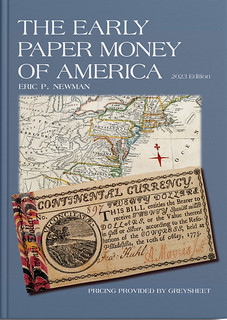 In cooperation with the publisher of Greysheet, Kagin's is offering the 2023 6th edition of The Early Paper Money of America at the discounted price of $90 or free to successful purchasers of $10,000 or more from the auctions.
In cooperation with the publisher of Greysheet, Kagin's is offering the 2023 6th edition of The Early Paper Money of America at the discounted price of $90 or free to successful purchasers of $10,000 or more from the auctions.
Colonial Paper Currency represents one of the most historically important periods in our nation's history. Although as a series, these notes have been overshadowed by their coinage counterparts, they nonetheless are as important, not only in telling our nation's early history, but also its actual survival as an independent nation. Without the emissions of Colonial notes during the Revolutionary War, the United States could not have paid its troops or for their provisions, and the Great Experiment
of an independent Republican government would have surely failed.
The first Colonial Issue of the 1690 Massachusetts Bills of Credit to pay for a failed military excursion, were in fact the first official bank notes in the Western World. Only Russia and China had printed official notes earlier. The utility of paper currency was soon recognized and despite fears of inflation, thousands of notes were printed by the Continental Congress and by every colony and Georgia. During the Revolutionary War, the printing of such notes was rampant. Without any precious metal backing, the notes quickly inflated until they were worth more as leggings to protect the Revolutionary troops during their winter campaigns then as money. Eventually, goods of little value were disdained as, not worth a Continental
.
Despite their abundance in the 18th Century, through the centuries, most of these notes have been lost through redemption, heavy commercial use, and damage. Fortuitously a few insightful 19th century numismatists collected and accumulated these notes so today's numismatists can appreciate and enjoy them. From about 1910 until the 1950's one such collector, F.C.C. Boyd, amassed the largest collection of Colonial Currency ever formed. His collection was eventually purchased by John J. Ford.
A great many of the Ford notes, especially the very rare pre-1760 notes were imaged in 1967 for the standard reference work, The Early Paper Money of America by numismatic scholar and collector, Eric P. Newman.
From October 2003 through October 2007, Stack's auctioned the massive Ford collection of coins and currency in 21 different sales. Five sales featured Ford's Colonial Currency—the most comprehensive collection in history. An additional three sales conducted in 2013 by the combined company of Stack's-Bowers Galleries also contained Colonial Currency.
In 2015, the Eric P. Newman Collection was sold in multiple sales by Heritage Auctions. This and the Ford collection were by far the two largest collections of Colonial Currency sold in the last century.
For more information, see:
https://www.kagins.com/
To read the earlier E-Sylum article, see:
NEW BOOK: EARLY PAPER MONEY OF AMERICA 2023
(https://www.coinbooks.org/v25/esylum_v25n35a04.html)
STACK'S BOWERS PHYSICAL CRYPTOCURRENCY SALE
Crypto winter or no, physical cryptocurrency continues to be of interest. In this press release, Stack's Bowers announces their upcoming physical cryptocurrency sale. I'd never seen most of these before. -Editor
Stack's Bowers Galleries is proud to announce the Physical Cryptocurrency Session of their Official Auction of the Whitman Coin & Collectibles Spring Expo. This is Stack's Bowers Galleries' first crypto offering since their historic Cryptocurrency Anniversary sale in November 2022, an event that pushed the firm's total prices realized in this category above $2 million. The Spring 2023 sale is currently available for viewing and pre-sale bidding at StacksBowers.com; live bidding for the Cryptocurrency session will begin on March 24 at 2PM PDT / 5PM EDT. Winning bidders may pay their invoices with Bitcoin via BitPay for a 1% fee after authorization by Stack's Bowers Galleries prior to the sale.
This crypto session marks the largest ever live auction offering in this category, with 302 lots including 168 Loaded with cryptocurrency and 134 Non-Loaded. These coins span the Bitcoin, Litecoin, Monero, Dogecoin, ViaCoin, and BitCore cryptocurrencies and encompass the most popular series including Casascius, Lealana, BTCC, Alpen Coin, Bitcoin Penny Co., Crypto Imperator, Denarium, 1HoDLCLUB, Microsoul, MoonBits, NastyFans, Satori, Titan Mint, and many others.
Of particular note is a pair of special Pattern, or Prototype, sets offered from the Lealana Archives. Included is a matched six-coin set of Pattern 2013 Lealana Bitcoins and a five-coin set of Pattern 2013 Lealana Litecoins, all marked with Serial Number 155. These sets showcase a variety of experimental finishes and features that did not appear on official production coinage until recent years.
Additional offerings from the Lealana series include several very rare varieties of the silver 0.1 BTC, 0.25 BTC, and
0.5 BTC denominations, an incredible array of Litecoins, and a selection of the 2021 and 2022 Bitcoin Cent
0.01
BTC coins that have never before been offered in a live auction.
Casascius coins will always be prized as the foundational coins of this category and the Stack's Bowers Galleries
Spring 2023 auction features an impressive selection. Presented are several of the historic 2011 CASACIUS
ERROR
1 BTC in Brass including an exceptional MS-66 (ANACS) example. Also featured are several Brass 0.5
BTC as well as an exceptional 0.1 BTC in silver graded MS-68 PL (ICG).
Also offered is an exciting assortment of BTCC coins ranging from the popular 1K Bits Poker Chips,
a stunning
500K Bits in Titanium, and a Proof-66 Deep Cameo (PCGS) 1 BTC in silver that marks the first of its type to appear
at public auction.
The Non-Loaded category features several incredible rarities across the Unfunded, Redeemed, and Crypto-Themed types. It is important to note that many of the Unfunded pieces have intact security holograms and published Public Addresses, which makes them desirable as functional cold wallets for securely storing cryptocurrency offline.
Among the rarities in the Non-Loaded category is a selection of Unfunded 2016 Lealana King Kam
2 oz silver
coins with special finishes, an Unfunded Titan Mint 1 BTC struck in 1oz of gold, rarities from the Bitcoin Penny
Company series struck in gold, platinum and silver, and a pair of 2014 Casascius "St. Petersburg Bowl" Bitcoin-
Themed silver medals, among many others.
For questions on the Spring 2023 Cryptocurrency Session or to consign your coins to a future auction, contact specialist James McCartney at JMcCartney@StacksBowers.com. Additional offerings of physical crypto will be presented in the Stack's Bowers Galleries June 2023 and August 2023 auctions.
To read earlier E-Sylum articles, see:
PHYSICAL CRYPTOCURRENCY PREMIUMS
(https://www.coinbooks.org/v25/esylum_v25n18a30.html)
STACK'S BOWERS PHYSICAL CRYPTOCURRENCY
(https://www.coinbooks.org/v25/esylum_v25n31a16.html)
NUMISMATIC NUGGETS: MARCH 12, 2023
Here's a selection of interesting or unusual items I came across in the marketplace this week. Tell us what you think of some of these. -Editor
The Morris 1792 Silver Center Cent
1792 Cent. Silver Center. Judd-1, Pollock-1. Rarity-6+. Copper with Silver Plug. Reeded Edge. MS-61 BN (PCGS). CAC.
Since our last offering of this coin (November 2017 Baltimore Auction, lot 10003), its status as a genuine Judd-1 Silver Center cent has been called into question through research conducted by Robert Rodriguez, Tony Lopez, Stuart Levine and Maureen Levine. This team of researchers conclude that the Morris specimen of Judd-1 offered here is a genuine Judd-2 cent with the silver plug added at a later time to simulate a Judd-1 example. Their findings are summarized in a video hosted by Robert Rodriguez for the 2020 Newman Numismatic Portal Symposium, which is available at the following link: https://nnp.wustl.edu/library/book/588141. Prospective bidders on this lot are encouraged to familiarize themselves with the research done and conclusions put forth by Mr. Rodriguez and his colleagues. However, Stack's Bowers Galleries is offering this coin as certified by PCGS and verified by CAC - in other words, as a genuine Judd-1 Silver Center cent certified as PCGS/CAC MS-61 BN.
We continue with our description of this coin as presented in our November 2017 Baltimore Auction offering, with minor updates.
This controversial piece is returning to market, and to its credit Stack's Bowers Galleries acknowledges the controversy right up front in its auction listing. See the complete lot description for more background on the Silver Center cents and the provenance of this specimen which once belonged to my fellow Pittsburgh-area club member, Dr. James O. Sloss of Beaver, PA. -Editor
To read the complete lot description, see:
1792 Cent. Silver Center. Judd-1, Pollock-1. Rarity-6+. Copper with Silver Plug. Reeded Edge. MS-61 BN (PCGS). CAC.
(https://auctions.stacksbowers.com/lots/view/3-118MRF/1792-cent-silver-center-judd-1-pollock-1-rarity-6-copper-with-silver-plug-reeded-edge-ms-61-bn-pcgs-cac)
Alaska Trade Tokens
Alaska. Lot of (3) Undated (1907-1920) Trade Tokens. Copper. Plain Edge. Extremely Fine.
Included are: Seward: (The) Northern, Rulau-Sew 15; (The) Northern, Rulau-Sew 15, environmental damage, harshly cleaned; and Valdez: Copper Block Buffet, Rulau Vlz-15, cleaned.
From the Stack's Bowers April 2023 Tokens & Medals Collectors Choice Online Auction. -Editor
To read the complete lot description, see:
Alaska. Lot of (3) Undated (1907-1920) Trade Tokens. Copper. Plain Edge. Extremely Fine.
(https://auctions.stacksbowers.com/lots/view/3-11P30G/alaska-lot-of-3-undated-1907-1920-trade-tokens-copper-plain-edge-extremely-fine)
Southern States Obsolete Paper Group
Group of nine Confederate and obsolete bank notes comprising, a 1866 State of North Carolina 20 cent bill, 1866 State of NC $1 bill, 1863 Confederate States 50 cent-Richmond bill, 1863 State of South Carolina 15 cent bill, 1862 Mechanics Bank Augusta Georgia 25 cent bill, 1863 State of Alabama 25 cent bill, 1862 Somerset & Worcester Savings Bank Maryland $3 bill, 1862 State of Louisiana Baton Rouge $5 bill, and 1862 State of Georgia Savannah and Augusta $50 bill.
State of NC 20 cent bill h. 1.75", w. 3.25". $3 h. 3", w. 7.125".
Last week we had a couple group lots of obsolete currency. Here's another group lot from a different seller. The Mechanics Bank note caught my eye because of the back - it's printed on what looks like an uncut sheet of another banknote. Love that tiny 20 cent North Carolina note, too. -Editor
To read the complete lot description, see:
(https://bid.aandoauctions.com/lots/view/5-KBJCM/9pcs-obsolete-bank-notes-confederate-currency)
1940 Sarawak One Dollar Note
SARAWAK. Government of Sarawak. 1 Dollar, 1940. P-23. PCGS Banknote Choice Very Fine 35.
Printed by BWC. Dated 1st January, 1940.
Estimate: $1,000 - $2,000.
Nice note from the Stack's Bowers April 2023 Hong Kong Auction. I couldn't pinpoint Sarawak on a map for you, but I guess I like the colors and composition of this piece. -Editor
To read the complete lot description, see:
SARAWAK. Government of Sarawak. 1 Dollar, 1940. P-23. PCGS Banknote Choice Very Fine 35.
(https://auctions.stacksbowers.com/lots/view/3-11QOA0/sarawak-government-of-sarawak-1-dollar-1940-p-23-pcgs-banknote-choice-very-fine-35)
The Medallic History of England
Used copy of The Medallic History of England to the Revolution. John Pinkerton. Contains forty plates of illustrations. 1790. Book is in used but stable condition.
Bibliophiles should watch the American Numismatic Society's eBay offerings for library duplicates; this one sold earlier today. -Editor
To read the complete lot description, see:
Numismatic Book - The Medallic History of England to the Revolution
(https://www.ebay.com/itm/134450808805)
ROMAN COIN HOARD FOUND IN BERNESE ALPS
Arthur Shippee passed along this story about a Roman coin hoard found in the Bernese Alps back in 2020. Thanks. Here's a Google translation. -Editor
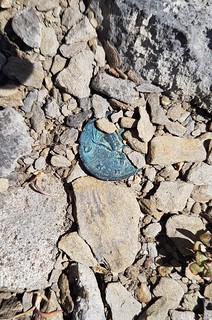 Coins and Roman rock crystals have been discovered in the high Bernese Alps,
Coins and Roman rock crystals have been discovered in the high Bernese Alps, near the Ammertenhorn, at 2600 meters above sea level
, announced the Archaeological Service of the canton of Bern on Monday.
The Ammertenhorn site in the municipality of Lenk in the Bernese Oberland was revealed in the summer of 2020 by a runner in the field
, explains the Archaeological Service in a press release. Research has then been carried out on this isolated high plateau
over the past two years in order to secure further discoveries. Since then, about a hundred Roman coins, the fragment of a bronze votive plaque – it is a leaf-shaped consecration offering – 27 rock crystals and other objects have been unearthed. day,
the press release lists.
Comparable sets of finds are often interpreted as offerings of consecration. The high plateau between the Ammertenhorn and the sublime Wildstrubel massif, visible from afar, could also have been a sacred place,
explains Adriano Boschetti, Bernese cantonal archaeologist.
The objects discovered can be admired from February 23, 2023 in the excavation tent of the historic Museum
in Bern. The establishment regularly presents the latest discoveries of Bernese archaeologists in an excavation tent staged in an original way
.
To read the complete article, see:
De la monnaie romaine découverte dans les Alpes bernoises
(https://www.lematin.ch/story/de-la-monnaie-romaine-decouverte-dans-les-alpes-bernoises-606662574415)
To read a Newsweek article, see:
Hoard of Roman Coins Found After Hiker Stumbles Across Lost Ancient Site
(https://www.newsweek.com/hoard-roman-coins-hiker-stumbles-lost-ancient-site-1786875)
WATCHET MUSEUM DISPLAYS ANGLO-SAXON COINS
A museum in Watchet, Somerset, England is displaying Anglo-Saxon coins related to the coastal town's history. -Editor
Two rare Saxon coins minted in Watchet will go on display at the Watchet Market House Museum from March. They are being loaned to the museum by Carhampton resident Cliff Barber.
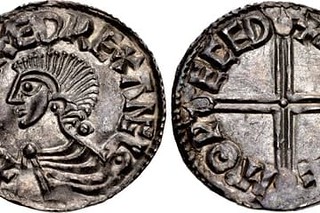 The oldest of the two coins was minted in Watchet under the reign of King Aethelred II, who ruled with a short interruption from the year 978 to 1016. Also known by the epithet Aethelred the Unready, his reign was the longest of any English king until Henry III broke his record in the 13th century. Aethelred earned infamy for his ordering of the St Brice's Day Massacre in which Danish settlers were 'exterminated' in Oxford.
The oldest of the two coins was minted in Watchet under the reign of King Aethelred II, who ruled with a short interruption from the year 978 to 1016. Also known by the epithet Aethelred the Unready, his reign was the longest of any English king until Henry III broke his record in the 13th century. Aethelred earned infamy for his ordering of the St Brice's Day Massacre in which Danish settlers were 'exterminated' in Oxford.
The coin is a silver penny, which was the standard for Saxon coins. Curator and Chairman of the Watchet Market House Museum Jimmy Nicholson said: "It is of interest because the mint was set up during King Alfred the Great's time up on Cleve Hill. The Vikings knew there was silver in Watchet, that's one of the reasons why they raided. Watchet's silver was even used to pay off the Danes."
The so-called monyer, the man who minted the coin, is recorded as being named Sigeric. In Saxon times the monyer was an important position, held by a responsible man of property in order to give credibility to the money he made.
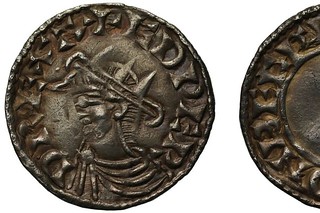 The second item for display is a coin minted in Watchet under the reign of Edward the Confessor. Edward is considered the last king of the House of Wessex. He ruled from 1042 until his death in 1066 when he was succeeded by Harold Godwinson, famed for leading the English army against William I of Normandy at Hastings.
The second item for display is a coin minted in Watchet under the reign of Edward the Confessor. Edward is considered the last king of the House of Wessex. He ruled from 1042 until his death in 1066 when he was succeeded by Harold Godwinson, famed for leading the English army against William I of Normandy at Hastings.
This coin is also a silver penny, weighing in at 1.1g. It is said to be of the highest rarity, being one of only 4 known examples of its kind.
Jimmy Nicholson said: "It is of the short cross type - in the middle of the coin there is a short cross - whereas others have a long cross. They used to cut them in half along the cross to make a half penny."
The monyer of the coin is recorded as being named Godcild.
Cliff Barber's Saxon coins will join two other Roman coins he has on display at the museum, which depict Romulus and Remus. Romulus and Remus are said to have been the founders of the city of Rome, and according to legend were raised in the wild by a wolf.
Steve Hill of Sovereign Rarities Ltd put me in touch with Mr Clifford Barber, one of his clients who'd bought the rare Watchet Mint penny of Edward the Confessor from the English Doctor collection last year, and arranged for it and another coin of Aethelred II he had, to go on display at the Watchet Museum. Cliff added these thoughts. Thank you! -Editor
I thought a little back ground about Watchet may be of help. Watchet is a typical very independent minded community on the west coast of England. There is evidence of continual community dating back to before the Celtic era. Daws castle (as it is known now) started as a Celtic hill fort and there is evidence of Roman presence but not settlement. The Saxons used the hill fort and it is believed that the Saxon mint was within the defences of the hill fort. Watchet was attacked by Viking raiders on several occasions with varying degrees of success.
Moving to the 1700s the Bell pub across the road from the Watchet museum is where Samuel Taylor Coleridge started to composed The Rime of the Ancient Mariner. The first part is leaving Watchet harbour with the church on top of the hill and the light house on the harbour wall.
The ship was cheered, the harbour cleared,
Merrily did we drop
Below the kirk, below the hill,
Below the lighthouse top.
 John Short (‘Yankee Jack') came into prominence as ‘father' of sea shanties. Born locally in 1839, he first went to sea from Watchet as a lad before going ‘deep sea' and in the 1860's joined a Yankee ship in the American Civil War. It is said he sang as he sailed with a most melodious voice and when he retired at the age of 61 he brought his songs home with him. These were collected and collated by Cecil Sharp and Sir Richard Terry for our English musical heritage. A statue of ‘Yankee Jack' was funded by the Museum Society and public subscription and sculpted by Alan B. Herriot, of Penicuik, Scotland.
John Short (‘Yankee Jack') came into prominence as ‘father' of sea shanties. Born locally in 1839, he first went to sea from Watchet as a lad before going ‘deep sea' and in the 1860's joined a Yankee ship in the American Civil War. It is said he sang as he sailed with a most melodious voice and when he retired at the age of 61 he brought his songs home with him. These were collected and collated by Cecil Sharp and Sir Richard Terry for our English musical heritage. A statue of ‘Yankee Jack' was funded by the Museum Society and public subscription and sculpted by Alan B. Herriot, of Penicuik, Scotland.
To read the complete article, see:
Rare 1000 year old Saxon coins to go on display at the Watchet Market House Museum
(https://www.wsfp.co.uk/news/rare-1000-year-old-saxon-coins-to-go-on-display-at-the-watchet-market-house-museum-596736)
17TH-CENTURY COIN HOARD FOUND IN POLAND
Arthur Shippee also passed along this story of the discovery of a hoard of 17th-century Polish and Lithuanian copper coins. Thanks. -Editor
A metal detectorist searching for discarded tractor parts on a Polish farm discovered a completely different type of valuable metal: A spectacular hoard of 17th-century coins buried beneath the soil.
The hoard — a vast stash of about 1,000 copper coins — was found in late February near the small village of Zaniówka in eastern Poland, near the borders with Belarus and Ukraine, by a local man, Michal Lotys.
Lotys was using a new metal detector to find spare parts for his sister's tractor; and so when the instrument started beeping in one of the farm's fields, he scraped away a layer of the topsoil. That revealed the coins spilling out of a broken clay "siwak" — a jug in a local style with one handle and a narrow neck.
Using a metal detector to search for buried relics without a permit is illegal in Poland, and so Lotys contacted archaeologists in the nearby city of Lublin, about 95 miles (150 kilometers) southeast of Warsaw, who visited the farm the next day.
Their investigations showed that the location of the hidden hoard was clearly outlined on the surface of the soil, which indicated it had been buried there intentionally, according to a report in the Polish news outlet The First News.
Dariusz Kopciowski, the director of Lublin's heritage conservation agency, announced in a Facebook post on March 2 that the hoard has about 1,000 Polish and Lithuanian copper coins minted in the 17th century.
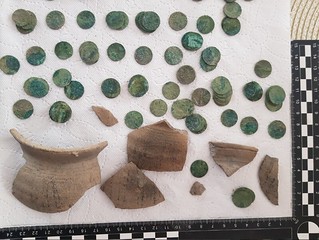 Oxidation after roughly 400 years in the ground means all the copper coins are now colored green; and many have corroded together in layers. But about 115 of the coins are loose, and the entire hoard weighs about 6.6 pounds (3 kilograms), Kopciowski noted.
Oxidation after roughly 400 years in the ground means all the copper coins are now colored green; and many have corroded together in layers. But about 115 of the coins are loose, and the entire hoard weighs about 6.6 pounds (3 kilograms), Kopciowski noted.
Investigations show most of the coins were created between 1663 and 1666 in mints in Warsaw; Vilnius in Lithuania; and Brest, which is now in Belarus but was then part of the Polish-Lithuanian Commonwealth.
To read the complete article, see:
17th-century hoard brimming with 1,000 coins discovered in Poland
(https://www.livescience.com/17th-century-century-hoard-brimming-with-1000-coins-discovered-in-poland)
THE BOOK BAZARRE
REVIEWING THE MILLHOLLAND COLLECTION
Greg Reynolds has published Part 1 of a Greysheet series on the Millholland Collection to be auctioned by Stack's Bowers. Here's an excerpt - see the complete article online for more. -Editor
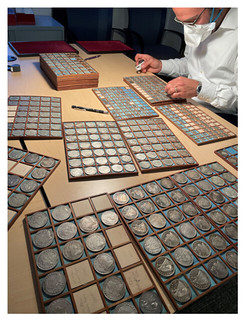 James A. Millholland stopped collecting coins circa 1894 and his collection of more than five hundred coins features many gems with very appealing natural toning, as well as a large number of circulated coins.
James A. Millholland stopped collecting coins circa 1894 and his collection of more than five hundred coins features many gems with very appealing natural toning, as well as a large number of circulated coins.
Millholland was born in 1842. He probably began collecting coins before he was twenty years old.
It is likely that Millholland purchased Proof sets directly from the U.S. Mint during his lifetime or obtained sets from someone who did. While his collection features many Proof copper, nickel and silver coins dating from 1859 to 1894, a majority of the coins in the Millholland Collection are business strikes.
There is a 1794 half cent and two 1793 Wreath cents. Millholland's set of Three Cent Silvers includes Proofs, uncirculated and circulated coins. The pre-1830 coins in the collection tend to be heavily worn. Did Millholland pull them from change?
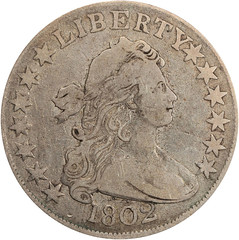 Millholland obtained representatives of the two best dates of the Draped Bust, Heraldic Eagle half dollar type. An 1801 half is PCGS graded VG8. An 1802 half dollar is PCGS graded F12 and is CAC approved.
Millholland obtained representatives of the two best dates of the Draped Bust, Heraldic Eagle half dollar type. An 1801 half is PCGS graded VG8. An 1802 half dollar is PCGS graded F12 and is CAC approved.
Although a substantial number of the gem quality Proofs will each bring thousands of dollars, this collection contains many coins that are relatively more affordable in the context of 19th century U.S. coins. Collectors with modest to medium-level budgets should be able to effectively compete for coins in the Millholland Collection.
Almost all of the coins in the Millholland Collection were minted in Philadelphia. His home state, Maryland, borders Pennsylvania. During the 19th century, many collectors were not interested in coins of the Branch Mints or thought of them as inconsequential.
The only Carson City Mint coin in Millholland's collection was an 1878-CC dime that PCGS graded MS65 and is CAC approved. Another coin that is distinct from the rest of his collection is his 1818/5 quarter, which is PCGS graded MS65+ and CAC approved. Were these purchased from coin dealers? His other bust quarters were not nearly of this level of quality, though a PCGS graded G4 1796 is significant as a one-year type coin and as a representative of the first issue of U.S. quarters.
To read the complete article, see:
Incredibly Fresh Millholland Coin Collection, Part 1
(https://www.greysheet.com/news/story/incredibly-fresh-millholland-coin-collection-part-1)
To read the earlier E-Sylum articles, see:
THE JAMES ALLAIRE MILLHOLLAND COLLECTION
(https://www.coinbooks.org/v26/esylum_v26n08a17.html)
JAMES ALLAIRE MILLHOLLAND (1842 - 1911)
(https://www.coinbooks.org/v26/esylum_v26n08a18.html)
SS CENTRAL AMERICA TREASURE HUNT
The sales are history now, but this week Holabird Western Americana called for a fun "Treasure Hunt" to reunite coins sold earlier with the artifacts they were found in. -Editor
We hid a treasure hunt within this SS Central America auction, and we're now ready to fill you in on the details!
Two clues...
Clue #1: Lot 2042: Front and back paper binder for G. Kearsing's Staniel Foil, 49 Lispenard St., NY.
and Clue #2: Lot 3081: Easton Gold Coin Souvenir Wrapper
So what connects these two items?
Somewhere out in the collecting world, there are two coins that are forever linked to these SSCA artifacts...
Lot 2042: Front and back paper binder for G. Kearsing's Staniel Foil The front of this binder has a 1" center hole which once held an 1847-O $10 gold coin (PCGS AU55), sold in an early SSCA sale.
and Lot 3081: Easton Gold Coin Souvenir Wrapper Has the impression of a coin, an 1831-A (Paris mint) French 20 franc gold coin, PCGS VF35, that sold in the Christie's sale of December 2000.
So we challenge you, our coin & treasure collectors, to find the coins that match these two items! Check your coins, ask your coin collector friends, or visit coin shops... This treasure hunt is a very unique opportunity. This is the only time you will be able to reunite these items.
And after such an incredible journey:
Leaving the adventure & excitement of the California Gold Rush only to face the power of a fierce Atlantic hurricane; sinking 7,200 feet into the dark Ocean Deep; and waiting there, over 130 years, until Nemo, a robotic emissary from the surface, could bring these lost treasures back to the light...
To read the complete lot descriptions, see:
Easton Gold Coin Souvenir Wrapper, 1857, SS Central America Treasure [143209]
(https://holabirdamericana.liveauctiongroup.com/Easton-Gold-Coin-Souvenir-Wrapper-1857-SS-Central-America-Treasure-143209_i47870677?t=HEBSCA23)
Dental Items, SS Central America Treasure [161029]
(https://holabirdamericana.liveauctiongroup.com/Dental-Items-SS-Central-America-Treasure-161029_i47870558?t=HEBSCA23)
THE REVERSED DRAGON DOLLAR
A Stack's Bowers blog article by Jeremy Bostwick highlights a high-grade example of the 1911 Reversed Dragon Dollar. -Editor
Our biannual Hong Kong auction is always a highly-anticipated trend-setter and market-maker, featuring countless rarities from the Pacific theater. Leading the pack in our April 2023 Hong Kong Rarities Night auction is lot 40162, an important rarity from the final year in the brief reign of Hsuan-t'ung, more commonly known as the boy-emperor Puyi. With a high-end estimate reaching seven figures, this silver Dollar pattern only comes to market rather infrequently; the last time was in our May 2020 Hong Kong auction. This despite the vast numbers of Chinese rarities offered in the time span since that appearance.
Subtle differences in the design of the dragon set this prototype apart from the commonly encountered issue that was eventually adopted. These include the side from which the dragon is curled, the shape of its scales, and English characters which vary slightly in overall size and design. These seemingly minor or even inconsequential differences factor heavily in its rarity and immense desirability. When combined with this example's superb state of preservation – graded SPECIMEN-65 by PCGS – it becomes very easy to see why this stunning relic from waning Ch'ing rule will soar to lofty heights in yet another fantastic sale offered by Stack's Bowers and Ponterio.
Here's more from the lot description. -Editor
CHINA. Silver "Reversed Dragon" Dollar Pattern, Year 3 (1911). Tientsin Mint. Hsuan-t'ung (Xuantong [Puyi]). PCGS SPECIMEN-65.
L&M-31; K-225; KM-Pn308; WS-0042A; Chang Foundation-37; Wenchao-115 (rarity: ???). Type II; variety with raised veins in outer leaves. A simply majestic example of the EXTREMELY RARE and elusive Reversed Dragon Pattern, this Dollar defies explanation and touches the heartstrings of any numismatist, particularly those enthralled with the Chinese series. One of the ultimate issues of the Qing Dynasty, the Pattern issues such as this example differ slightly from the popular adopted design (L&M-37). Of most stark note is the nature in which the dragon coils upward, being the inverse of adopted design. Additionally, the raised veins on the outer leaves delineate this example from other pattern issues.
The specimen nature of the strike is immediately evident, with a crisp execution of the refined details, and the die lines from polish being seen in the fields. A swirling and wonderous luster sloshes off the surfaces, with golden and apricot toing overlaying.
To read the complete lot description, see:
(t) CHINA. Silver "Reversed Dragon" Dollar Pattern, Year 3 (1911). Tientsin Mint. Hsuan-t'ung (Xuantong [Puyi]). PCGS SPECIMEN-65.
(https://auctions.stacksbowers.com/lots/view/3-11Q3WV/t-china-silver-reversed-dragon-dollar-pattern-year-3-1911-tientsin-mint-hsuan-tung-xuantong-puyi-pcgs-specimen-65)
To read the complete article, see:
POPULAR ISSUED 1953 10 YUAN OFFERED IN APRIL HONG KONG SALE
(https://stacksbowers.com/popular-issued-1953-10-yuan-offered-in-april-hong-kong-sale-2/)
ORIGIN OF THE U.S. ASSAY COMMISSION MEDALS
A Stack's Bowers blog article by Chris Bulfinch examines the origin of the U.S. Assay Commission medals -Editor
In 1860, members of the U.S. Assay Commission were presented with medals for the first time. Bearing designs by James Longacre, one of which appears on an 1859 pattern half dollar, the 1860 Assay Commission medal inaugurated a century-long series sought after by U.S. exonumia specialists and others interested in medals produced by the U.S. Mint. Stack's Bowers Galleries is offering many Assay Commission Medals in our Spring 2023 Auction, including an example of the first issue.
Established by the Mint Act of 1792, the United States Assay Commission tested coins from the U.S. Mint for weight and fineness, a practice reminiscent of the British Trial of the Pyx.
The commission met every year with the exception of 1815. Medals for commissioners were introduced in 1860, during what many experts agree was the first major wave of coin collecting activity in the United States, motivated in part by the switch from large- to small-size cents in 1857. The Assay medals' origin remains somewhat murky, though experts think that they were issued to advertise the Mint's medals department, along with expressing appreciation for the commissioners' service. In the 1989 reference Medals of the United States Assay Commission 1860-1977, Robert Julian and Ernest Keusch write of [then-Mint Director James Ross] Snowden's attempt, in the latter part of the 1850s, to enlarge the medal department of the Mint. One of his favorite vehicles for the suggestion of change in the mint system was to have the Assay Commission formally adopt resolutions to be sent to higher powers in the Treasury Department. Presenting medals to Assay Commission members was an effective way of bringing a medal department to their attention.
The medals bear designs from prominent U.S. Mint artists, including Longacre, William and Charles Barber, George T. Morgan, Frank Gasparro, and many others responsible for circulating U.S. coinage.
Serving on the Assay Commission became a badge of distinction for American numismatists and such famous names as Eric P. Newman and Harvey Stack served on the Commission. Well-known non-numismatic members of Assay Commisions include Supreme Court Chief Justices John Marshall and Oliver Ellsworth, Congressman William Ashbrook (who was also a numismatist), and future Vice President Charles Dawes. In 1964 at the American Numismatic Convention, the Old Timer Assay Commission Society was established as a social club for former members. Public members stopped being included on the Assay Commission in 1977 and the Commission was disbanded entirely in 1980.
The 1860 Assay Commission medal itself is fairly simple. Its obverse displays a bust of Liberty based, according to Cornelius Vermuele's Numismatic Art in America, on the Apollo Belvedere statue in the Vatican surrounded by text reading MINT OF THE UNITED STATES
and PHILADELPHIA
; LIBERTY
appears on a ribbon at the bust's truncation. The reverse features a laurel wreath surround text ANNUAL ASSAY 1860.
Longacre's bust of Liberty appears on a number of pattern coins of the late 1850s, specifically Judd-237 to 246 and Judd-253
Stack's Bowers Galleries will offer a large number of Assay Commission medals in our Spring 2023 Auction. One especially intriguing example on offer is the previously mentioned 1860 Assay Commission Medal, which features a doubled struck reverse. It spent time in the collection of Ernest Keusch, coauthor of the standard reference on the Assay Commission medals and is certified MS-65 BN by NGC. Also included in our spring 2023 auction is an example of the 1861 Assay Commission medal, whose design is identical to the 1860 medal in all respects but the date. Assay Commission medals bearing that design were struck in 1862 as well, before a five-year hiatus.
Interestingly, we're also offering two of the patterns on which Longacre's Apollo-inspired Liberty appears, the Judd-237 (lot 7271) and Judd-239 patterns (lot 7272).
Here's a comparison of the designs. -Editor
To read the complete article, see:
DID YOU KNOW THE FIRST U.S. ASSAY COMMISSION MEDALS WERE ISSUED IN 1860?
(https://stacksbowers.com/did-you-know-the-first-u-s-assay-commission-medals-were-issued-in-1860/)
2023 ANIMALS IN WAR AND PEACE MEDALS
Six more U.S. animal heroes will be honored in the 2023 Animals in War & Peace Medal Ceremony at the U.S. Capitol. Here's the press release. -Editor
 The Third Annual Animals in War & Peace Medal Ceremony will
recognize and honor six unsung U.S. animal heroes for their accomplishments in both war and peace in
Washington, DC on March 8, 2023.
The Third Annual Animals in War & Peace Medal Ceremony will
recognize and honor six unsung U.S. animal heroes for their accomplishments in both war and peace in
Washington, DC on March 8, 2023.
Since 1943, the United Kingdom has been the only country in the world to honor animals with its
international PDSA Dickin Medal, also known as the Victoria Cross for Animals.
U.S. Members of Congress will present medals to America's animal heroes at the March 8th ceremony for either the Medal of Bravery or Distinguished Service Medal which is commensurate with the British PDSA Dickin Medal.
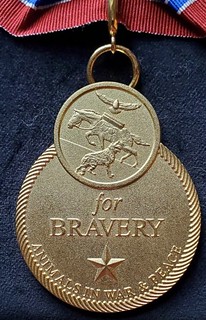 The Animals in War & Peace Medal of Bravery will be awarded to one pigeon and four canines that served
in past wars (posthumous), and current working or retired military dogs representing our military services
for their courage and sacrifice on behalf of the U.S. The 2023 heroes are The Mocker (WW1 pigeon); K9
Jafar (Baytown, TX Police Dept (alive)); MWD Paco P352 (U.S. Army (alive)); MPC Kay (75th Army
Ranger Regiment); and MPC Shimanski (Marine Corps Special Operations Command (alive)).
The Animals in War & Peace Medal of Bravery will be awarded to one pigeon and four canines that served
in past wars (posthumous), and current working or retired military dogs representing our military services
for their courage and sacrifice on behalf of the U.S. The 2023 heroes are The Mocker (WW1 pigeon); K9
Jafar (Baytown, TX Police Dept (alive)); MWD Paco P352 (U.S. Army (alive)); MPC Kay (75th Army
Ranger Regiment); and MPC Shimanski (Marine Corps Special Operations Command (alive)).
The Animals in War & Peace Distinguished Service Medal, will be awarded to a horse named Sgt. York (U.S. Army Caisson Platoon (alive). Sgt. York is distinguished by his exceptionally meritorious service to our nation in a duty of great responsibility.
Three of the alive canine heroes and their handlers, K9 Jafar, MWD Paco P352, and MPC Shimanski, will be available for photos and media interviews at the ceremony at 3:30PM in the Gold Room, Rayburn House Office Building.
To continue the efforts of creating the annual process of Congressionally mandated awards, a second House Resolution will be introduced later this spring. The 2023 Congressional resolution sponsored by Representative Gus Bilirakis (FL) acknowledges the importance of recognizing and honors our animals and their valiant human handlers for bravery in war and peace. The first bi-partisan House Resolution, H.Res. 935, was presented in the House of Representatives by Representative Lucille Roybal-Allard (CA) in February 2022.
Date: Wednesday, March 8, 2022 - 3:00PM (Press Interviews), 3:30PM to 5:30PM (Ceremony)
Place: The Gold Room, Rayburn House Office Building, 45 Independence Ave. SW, Washington, DC
Hosts: The event is hosted by Angels Without Wings, Inc./Animals in War & Peace, The Livingood Group LLC, and US War Dogs Association, Inc. The mission of Animals in War & Peace is to honor and recognize U.S. animals for bravery and distinguished service in both war and peace where they, and their valiant human handlers, will be appreciated and recognized for generations to come.
For more information: Robin Hutton, (805) 603-2174, waranimals@yahoo.com; Mari Lou Livingood, (703) 297-5961, mariloulivingood@gmail.com; or go to https://AnimalsInWarAndPeace.org/medal-of-bravery
To read the earlier E-Sylum articles, see:
2022 ANIMALS IN WAR AND PEACE MEDALS
(https://www.coinbooks.org/v25/esylum_v25n09a36.html)
SECRET SERVICE DOG DISTINGUISHED SERVICE MEDAL
(https://www.coinbooks.org/v25/esylum_v25n11a27.html)
GREG LOUGANIS AUCTIONING OLYMPIC MEDALS
Olympic medalist Greg Louganis is auctioning three of his medal to raise funds for charity. -Editor
Greg Louganis is auctioning three of his five Olympic medals in an effort to fund the Damien Center, Indiana's oldest and largest AIDS services center.
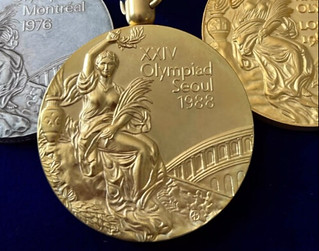 The three medals up for auction are:
The three medals up for auction are:
- 1976 silver medal for 10-meter platform
- 1984 gold medal for 3-meter springboard
- 1988 gold medal for 10-meter platform
The medals, they're in the history books,
Louganis said. Instead of holding on to them, I'm aiming to share my piece of Olympic history with collectors; together, we can help the Damien Center and its community to grow and thrive.
Louganis hopes to name two areas of the Damien Center for two people dear to him: his mother, Frances Louganis; and Ryan White, the teenager who died of AIDS in the 1990 and brought so much compassion and attention to the cause.
It was the 3-meter springboard in 1988 when Louganis famously hit his head on the board, only to come back and win gold. Louganis gave that gold medal to White's mother after Ryan died. It's currently in the Children's Museum of Indianapolis.
Louganis was one of the first high-profile athletes to come out publicly as gay when he came out publicly at the 1994 Gay Games. A year later he surprised many when he announced he had HIV.
Not only has he been a trailblazer for LGBT people, but he is considered by many the greatest diver in the sport's history. While he has four Olympic golds and a silver, he would have more if President Jimmy Carter had not mandated a U.S. boycott of the 1980 Summer Olympic Games. Louganis has also been a coach since his retirement from competition.
If you want one of these pieces of history, medals of the greatest athlete in a sport's history aren't inexpensive. Currently the bid for the silver medal is $350k, and the two golds are $750k.
To read the complete article, see:
Greg Louganis auctioning 3 of his Olympic medals to help AIDS services center
(https://www.outsports.com/olympics/2023/3/10/23634105/greg-louganis-auction-olympic-medals-damian-hiv-service-center)
THE 2022 MCA ANNUAL MEDAL
The Medal Collectors of America produce a great series of annual medals. Some examples of the 2022 issue are still available - here's a description from the Fall 2022 MCA Advisory, excerpted from an article by Stephen Scher. -Editor
Antonio di Puccio Pisano (called Pisanello). JOHN VIII PALEOLOGUS, Emperor of Byzantium (b. 1392; r. 1425-1448). ca. 1438. Lead, cast, 104.1 mm. obverse.
It is generally acknowledged that the modern medal was invented around 1438 by Antonio di Pucci Pisano, called Pisanello (ca. 1395-1455) with his medal of the Byzantine emperor, John VIII Paleologus. This sculptural innovation was one manifestation in Italy of a new attitude towards the history, art, philosophy, and cultures of ancient Greece and Rome. One important result was a new understanding of the place of man in the universe, celebrating his or her distinct individuality, character, appearance, social position, beliefs, and accomplishments, or by commemorating significant historic events in a durable, reproducible, widely distributable medium. Yet Pisanello's medals and those that followed by other artists did not, at first, physically follow the format from which they were derived: ancient coinage.
Sesterius of AGRIPPINA THE ELDER (14 BCE-18 CE). Minted 37-41 CE, bronze, struck, 36 mm. obverse
The Greeks had issued large commemorative coins such as the decadrachms of Athens and Syracuse, and their coinage in general achieved levels of extraordinary beauty. Roman coinage also displayed impressive quality in the portraits of Republican notables and subsequently the emperors and their imperial family members, especially in large bronze sestertii. In addition, The Romans struck equally large, monetiform pieces that were not active currency but were issued by emperors as celebratory gifts and that have later been called medallions.
For Renaissance Italy, coinage, which was readily available in considerable numbers, along with many other forms of ancient art, was tangible evidence of the glories of ancient civilizations and a spiritual and ideological inspiration for contemporary artists and collectors. It is this heritage that has been chosen as the subject of the 2022 Medal Collectors of America's annual medal. The obverse displays a hand holding a contemporary medal showing a series of adjacent heads each speaking into the ear before it, thus symbolizing the effective role of the medal as a means of communication. On the reverse, referring to the inspiration of Roman coins for the invention of the modern medal, is a representation of the obverse of one of the most beautiful Roman sestertii shown amidst the dirt and shards of a pot that once contained a buried hoard. The portrait is of Agrippina the Elder (c. 14 BC-33AD). a granddaughter of Emperor Augustus, wife of Germanicus, and mother of Nero and Caligula, during whose reign the coin was minted. On the reverse of the actual coin is a carpentum drawn by mules probably containing the ashes of Agrippina.
SPECIFICATIONS AND PURCHASE DETAILS
Title: ORIGINS
Artist: Michael Meszaros
Date: November 2022
Material: Verbronze (chemically aged solid brass)
Size: 3 (76.2 mm)
Edition: 50
Price: $150 (Includes fabric pouch) plus packing and shipping,
$15.
To order, see:
https://www.medalcollectors.org/membership/medals
NOTE: there is an additional $5 Paypal fee when ordering online. -Editor
For more information on the Medal Collectors of America, see:
https://www.medalcollectors.org/
JAHF ISSUES DAVID BEN-GURION MEDAL
Here is the press release for the latest medal issued by the Jewish-American Hall of Fame. Great portrait. -Editor
The Jewish-American Hall of Fame has commissioned former engraver of the U.S. Mint Jim
Licaretz to create an impressive 3 1/2 inch medal to commemorate the 75th Anniversary of Israel's
Independence on May 14th. The medal features an extremely high relief portrait of David Ben-
Gurion that lies entirely below the medal's upper surface. The reverse contains Ben-Gurion's
quote: In Israel, in order to be a realist, you must believe in miracles.
Money raised through the
sale of these medals will go to the non-profit Jewish-American Hall of Fame and the Jewish
National Fund - for the planting of a tree in Israel.
No more than 75 bonded bronze medals will be produced personally by Jim, that will be given to contributors of $135 plus $10 shipping. Each medal will include a certificate of authenticity, a display stand, and a certificate from the Jewish National Fund acknowledging the planting of a tree in Israel. To order, call 818-225-1348 or pay with paypal using email address of directorjahf@yahoo.com.
David Ben-Gurion was born David Green (or Gruen/Gryn) in 1886 in Plonsk, Russian Poland.
The young Ben-Gurion was introduced to Hebrew by his grandfather beginning in his third year.
In 1906 the young Zionist emigrated to Palestine, taking up work as a farm laborer for the next
four years. A year later, he adopted his new surname. He became Ben-Gurion (son of a lion
cub
), after Joseph Ben-Gurion, a first-century democratic leader of the Jews, whom zealots
killed for his moderation in the uprising against the Romans in 66 C.E. Adopting the name of
Ben-Gurion in 1909, he rose to become the preeminent leader of the Jewish community in
British-ruled Palestine Mandate from 1935 until the establishment of the State of Israel. On May
14, 1948, he formally proclaimed the establishment of the State of Israel, and was the first to
sign the Israeli Declaration of Independence, which he had helped to write. David Ben-Gurion
served as Prime Minister until 1963 with a short break in 1954–55.
Ben-Gurion led Israel's absorption of millions of Jewish refugees and immigrants, led the 1956 Sinai Campaign against Egypt, promulgated numerous major infrastructure projects such as the National Water Carrier and Israel's nuclear weapons development. Following his retirement, Ben-Gurion moved to a small kibbutz in the Negev Desert named Sde Boker, where he and his wife are buried - near Ben Gurion University.
For more information on the Jewish-American Hall of Fame, see:
https://amuseum.org/
CHARLES III CORONATION COMMEMORATIVE MEDAL
Jim Duncan passed along information about a commemorative medal being struck by the Numismatic Society of Auckland to commemorate the Charles III Coronation event from a New Zealand perspective. For an order form, contact the N.S.A. Secretary at joshuazlee@hotmail.com . Prices are NZ dollars. -Editor
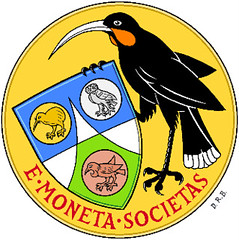 Medal size is 38 mm diameter and 3 mm thick, sufficient for 1 troy oz of silver in the silver medals.
Medal size is 38 mm diameter and 3 mm thick, sufficient for 1 troy oz of silver in the silver medals.
Obverse: Engraving of Westminster Abbey with Charles III coronation date
Reverse: N.S.A arms, motto and name with engravings of Charles I and II with coronation years
Note that medals in gold will be ordered if there is sufficient interest. Estimated prices only.
| Metal | Unit Price NZ$ |
|---|---|
| Copper | $30 |
| Copper, Rhodium plated | $40 |
| Sterling Silver, Rhodium plated | $140 |
| 9 kt gold (contingent on pre-orders) | est. $3500 |
| 24 kt fine gold (contingent on pre-orders) | est. $8500 |
Andrew Clifford adds:
"Engraving is in progress. Hopefully the order can be struck and despatched within the next 8 weeks!"
JODY CLARK'S MAGIC: THE GATHERING ARTWORK
An article by John Dale Beety examines the fantasy world art of Royal Mint coin designer Jody Clark. Very cool. Here's an excerpt - see the complete article online. -Editor
After more than two decades of playing Magic: The Gathering, it's hard for the game to shock me. Multiversal apocalypse? I've been through my share. Beloved characters die? I'd seen Bambi and read Where the Red Fern Grows by age ten. Even so, the March of the Machine previews debuted at MagicCon Philadelphia left me with my mouth open. Well, one preview in particular.
No, not the Zezhou Chen art on the left or the Betty Jiang art on the right, though both are awesome in their own ways. My eyes went straight to the alternate-frame art in the middle.
First thought: That's a well-illustrated medal.
Second thought: That's a very well-illustrated medal. Who did that?
Third thought: Jody Clark? They got Jody Clark?!
For many new Magic illustrators, debuting with the game is a breakthrough moment for their art careers.
Jody Clark's artwork has been reproduced literally billions of times already.
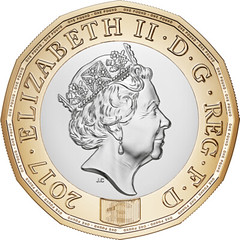 In 2015, Jody Clark, then a relatively new employee of The Royal Mint, was announced as the winner of a contest to design a new portrait of Queen Elizabeth II for British coinage. He was only 33 years old, the youngest artist in memory to do such a portrait for the United Kingdom.
In 2015, Jody Clark, then a relatively new employee of The Royal Mint, was announced as the winner of a contest to design a new portrait of Queen Elizabeth II for British coinage. He was only 33 years old, the youngest artist in memory to do such a portrait for the United Kingdom.
After several more years with The Royal Mint and additional designs put into production, including a new coinage portrait for Australia, Jody Clark joined the private sector in May 2020. He made his Magic illustration debut with 2022's Dominaria United.
While Jody Clark's most famous works are numismatic designs for coins, medals, and related objects, that isn't his only mode of art-making. Because the process of bringing a coin design into reality goes through stages of two-dimensional concept drawing (traditional or digital) and three-dimensional low-relief sculpture (traditional or computer-aided), this sets up a coin designer well for commissions in those media and related ones. And on seeing Stained Glass Strangle, aka Brazillian [sic] Jiu Jitsu Is My Religion, it's easy to draw a throughline between that work and the four stained-glass-style illustrations of his Magic debut.
When I found Jody Clark's name on these illustrations after a search, I felt silly. I'm supposed to be on top of new Magic artists, so how did I miss the connection to an artist I already knew from being a former professional coin geek? The only excuse I can offer is that Jody Clark
is a relatively anonymous name — there's at least one other artist named Jody Clark out there — and I was not familiar with the coin-famous Jody Clark's other work.
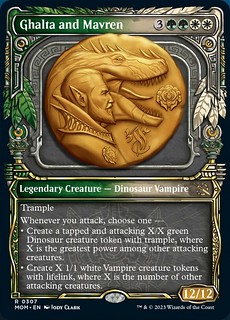 Once I saw the medal, though, I knew. It combines the best qualities of the illustrations for Saga cards, which depict art forms the inhabitants of a Magic setting would make, and Secret Lair, which sometimes brings in artists with specialist skills. Jody Clark's years of experience at making numismatic designs, plus his hard-won knowledge of how those specific three-dimensional objects appear in two dimensions, give Ghalta and Mavren that further nuance of rendition a connoisseur recognizes instantly, though may find hard to articulate.
Once I saw the medal, though, I knew. It combines the best qualities of the illustrations for Saga cards, which depict art forms the inhabitants of a Magic setting would make, and Secret Lair, which sometimes brings in artists with specialist skills. Jody Clark's years of experience at making numismatic designs, plus his hard-won knowledge of how those specific three-dimensional objects appear in two dimensions, give Ghalta and Mavren that further nuance of rendition a connoisseur recognizes instantly, though may find hard to articulate.
To read the complete article, see:
Ghalta and Mavren (and the Money Man Who Made Them)
(https://www.hipstersofthecoast.com/2023/03/ghalta-and-mavren-and-the-money-man-who-made-them/)
IN DEFENSE OF CASH
Last week we discussed the disappearance of automated teller machines as cash usage declines. This piece from National Review examines what we all lose when cash goes away. -Editor
There are dozens of touches that make the bar a time capsule from the 1960s. (It opened in 1968.) The jukebox plays real records, none of which are more current than 1975. The place isn't littered with TVs, so people actually speak to each other.
The U.S. Dollar's Global Reserve Status: No Sign of Slipping Sri Lanka Collapses under the Weight of Modern Monetary Theory The IMF and Sri Lanka Are Partners in Delusion But most importantly, you have to use cash. No credit, no debit, no checks, no tapping your phone on a screen.
In this sense, the bar might as well be operating in the 18th century. Today, people rarely carry cash, and if they do, it is typically in case something goes drastically wrong.
But with the loss of cash also comes the loss of anonymity. When you pay with a card or a phone, there is always an electronic trail of both your purchases and your whereabouts. You are forever on the grid, subjecting yourself to the monitoring of nosy, prying busybodies.
There is nothing more American than the dollar bill and the independence it offers.
Some municipalities, like Evanston, Ill., are considering ordinances to block businesses from going completely cash-free. The businesses say that going cashless protects their employees from being held up and that customers prefer other payment methods.
But poor people are also less likely to have credit cards, bank accounts, and smartphones with which to make purchases. Eliminating cash transactions effectively bars them from an establishment. (And how are you supposed to give money to homeless people on the street when there is no longer any cash? If you wave your phone over a hobo, not only does it not give the fellow a dollar, it provokes the hobo's ire.)
This writer says "look for future adult dancers to don QR-code tattoos." Actually, street vendors and beggars in many third-world countries already accept online payments. I don't know about adult dancers, but QR code tats have been a thing for a while already.
While the piece is humorous in tone, it rails against the loss of anonymity, subtitled "The day paper currency disappears, so will our autonomy". -Editor
In the ‘90s, people were all about getting barcodes tattooed. Today, they want QR codes they can scan with their phones,
Gabrielle Pellerone, a tattoo artist who runs a studio called Boot-W in the Italian neighbourhood of Reggio Calabria, told VICE.
But while QR code tattoos are functional for some people, some others want to get them just to be in on the joke.
The world of tattooing is evolving everyday, and the same goes for technology,
Leonardo Biason, a tattoo artist based in Pordenone, Italy, told VICE. This type of tattoo creates a closeness between these two worlds.
I think it's a kind of human evolution, that we're slowly transitioning into cyborgs.
To read the complete articles, see:
The True Value of Good Cash Money
(https://www.nationalreview.com/2023/03/the-true-value-of-good-cash-money/)
People Keep Getting QR Codes Tattooed on Their Body
(https://www.vice.com/en/article/y3dapk/qr-code-tattoos-pandemic-vaccine-green-pass)
To read the earlier E-Sylum article, see:
ATMS DISAPPEARING ALONG WITH CASH USAGE
(https://www.coinbooks.org/v26/esylum_v26n10a29.html)
LOOSE CHANGE: MARCH 12, 2023
Here are some additional items in the media this week that may be of interest. -Editor
This article from The Economist explores the connection between ancient coinage and democracy. Found via The Explorator newsletter. To subscribe to Explorator, send a blank email message to: explorator+subscribe@groups.io. -Editor
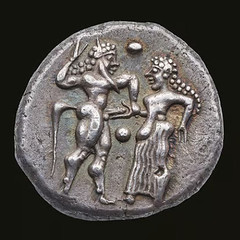 In the view of many, money corrupts democracy. In the view of Francis Albarède, however, it was money, in the form of coined silver, which created democracy in the first place.
In the view of many, money corrupts democracy. In the view of Francis Albarède, however, it was money, in the form of coined silver, which created democracy in the first place.
Dr Albarède is a geochemist at the École Normale Supérieure in Lyon, France. His definition of geochemistry
stretches, however, well beyond many people's, into political and economic history. In particular, he has just finished running the European Research Council's silver (Silver Isotopes and the Rise of Money) project. This, by studying the isotopic composition of ancient silver coins, has tried to draw conclusions about where the metal in a coin was mined, and thus about patterns of trade.
To read the complete article (subscription required), see:
Newfangled coins and mercenaries may have brought about democracy
(https://www.economist.com/science-and-technology/2023/03/08/newfangled-coins-and-mercenaries-may-have-brought-about-democracy)
Here's a Society of Paper Money Collector's blog article by Loren Gatch on banknote portraits of Jenny Lind, the famous opera singer known as the Swedish Nightingale.
-Editor
IN HER STUDY of women on currency, Virginia Hewitt observes that almost all women on notes are personifications or idealizations, even when they appear in realistic form.
As the use of paper money became widespread in the 19th century, advances in engraving technologies enabled banknote printers to resort to finely-wrought human portraits as a measure to thwart counterfeiting. Drawing on all manner of wash drawings, lithographs, and later photographs, banknote engravers in the mid-19th century created stocks of portrait images, known as fancy heads
, that their clients could choose from to adorn their currency. Key to the usefulness of those portraits was their widespread recognition by the banknote-using public, who might have the perceptive capacity to distinguish between well-executed renderings of famous portraits on genuine notes and badly-done portraits on counterfeits. Given that men dominated public life, historical figures portrayed on American banknotes were, almost without exception, male. Women appeared on currency for the most part either in stylized and anonymous depictions of daily work life or as personifications of some ideal or virtue, typically garbed in robes evocative of classical antiquity.
One singular exception to this pattern can be found on this sight draft issued on the firm of Sisson & Chapman, a small private bank that operated between 1850 and 1856 in the town of Lyons in the western part of New York State. If the top right of the draft features a characteristic arrangement of allegorical figures looking away in languid self-absorption, the portrait to the left makes an entirely different impression. Wearing a simpler, period hair style and plain dress, the young woman directly meets the gaze of her onlookers with her own forthright yet demure regard. Lacking exotic raiment or any particular beauty, her countenance is prim rather than glamorous, her overall appearance bourgeois rather than aristocratic.
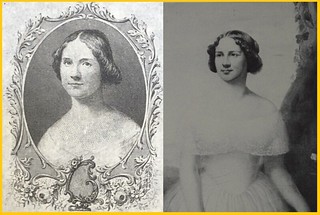 Anyone receiving this bank draft, and probably a large swathe of the American public by the early 1850s, would have immediately recognized this portrait as that of Jenny Lind, the famous opera singer known as the
Anyone receiving this bank draft, and probably a large swathe of the American public by the early 1850s, would have immediately recognized this portrait as that of Jenny Lind, the famous opera singer known as the Swedish Nightingale.
Embarking in late 1850 on a performance tour of the United States under the management of the impresario Phineas T. Barnum, Lind's presence in the country for nearly the next two years unleashed a storm of adulation, referred to at the time as Lindomania
, that represented an early example of how a mass popular culture, even one grounded on an egalitarian ethos like the United States, could nonetheless generate extreme forms of celebrity worship.
To read the complete article, see:
When Jenny Lind Circulated in America
(https://www.spmc.org/blog/when-jenny-lind-circulated-america)
The New York Times published a great report (complete with video) on the making of paper money at the Bureau of Engraving and Printing. Here's a short excerpt - be sure see the whole thing online. Thanks to David Sundman for passing this one along. -Editor
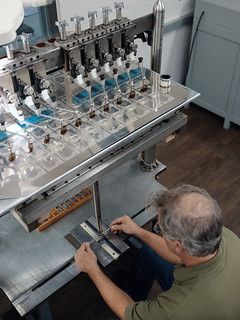 The process of making money requires teams of experienced designers and engravers who etch the plates with portraits, vignettes, lettering and ornamentation. The designs are crafted with both aesthetics and security in mind.
The process of making money requires teams of experienced designers and engravers who etch the plates with portraits, vignettes, lettering and ornamentation. The designs are crafted with both aesthetics and security in mind.
A tool called a pantograph, which has been used for more than a century, scales the engravings so that they can fit on working plates
and in smaller sizes and printed on the notes that are exchanged around the world.
Currency redesigns can take many years, except when a new Treasury secretary takes over. The new signature is usually added in a matter of months, beginning with a ceremonial signing that is captured digitally and engraved onto the metal plates that are the primary building blocks for printing the bills.
Printing presses require a set of three to four metal plates, which take up to eight days to produce. The images are transferred to the plates using what are essentially giant cookie cutters, known as steel dies. Then the plates must be cleaned and polished.
To read the complete article, see:
HOW TO PRINT MONEY
(https://www.nytimes.com/interactive/2023/02/26/us/printing-money-treasury.html)

